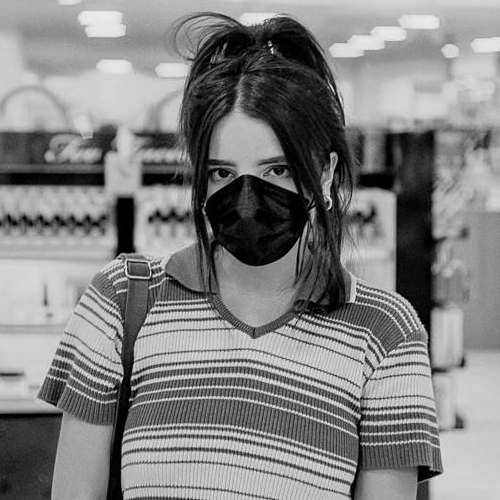
Past Newsletters
Fall 2024
The SDSU Rhetoric & Writing Studies Department Newsletter
Chair's Letter

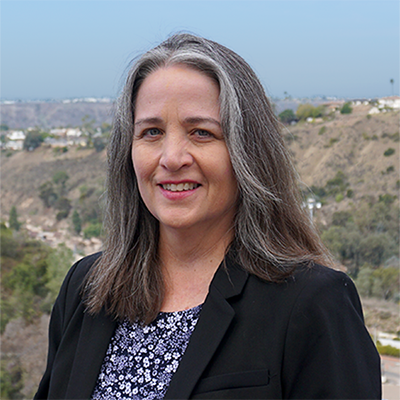 Looking over this issue of the newsletter, I note the many paths that students and
faculty take into, through, and out of the department as we explore rhetoric and writing.
I am grateful for what newcomers, such as Jennifer Burke Reifman, our newest faculty colleague, bring to the department as their experiences and perspectives
inform how we write and how that writing shapes the world. At the same time, I am
appreciative of how current students, Mateo Olloqui, who recently completed the RWS major, Matthew Miuccio, an RWS minor, and Lydia Rojratanakiat, an RWS graduate student, international student, and teaching associate, shape the
study of writing and rhetoric through their own backgrounds and through the connections
they make at SDSU. Last, I am also excited to see former students find rhetoric and
writing nourish not only their sense of who they are but also their career pathways
as technical writers and professional tutors. I hope you will enjoy reading about
them as much as I did! I also hope you enjoy this photo of recent alumni and faculty
at a Padres game in summer 2024.
Looking over this issue of the newsletter, I note the many paths that students and
faculty take into, through, and out of the department as we explore rhetoric and writing.
I am grateful for what newcomers, such as Jennifer Burke Reifman, our newest faculty colleague, bring to the department as their experiences and perspectives
inform how we write and how that writing shapes the world. At the same time, I am
appreciative of how current students, Mateo Olloqui, who recently completed the RWS major, Matthew Miuccio, an RWS minor, and Lydia Rojratanakiat, an RWS graduate student, international student, and teaching associate, shape the
study of writing and rhetoric through their own backgrounds and through the connections
they make at SDSU. Last, I am also excited to see former students find rhetoric and
writing nourish not only their sense of who they are but also their career pathways
as technical writers and professional tutors. I hope you will enjoy reading about
them as much as I did! I also hope you enjoy this photo of recent alumni and faculty
at a Padres game in summer 2024.
Kathryn Valentine,
RWS Department Chair
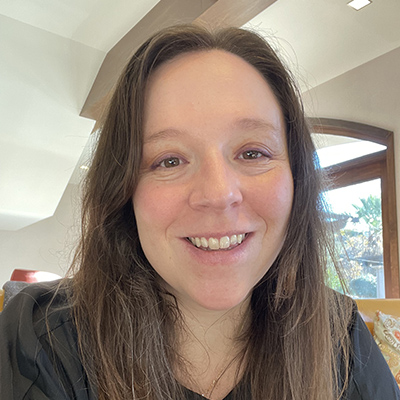 Faculty Profile
Faculty Profile
Jennifer Burke Reifman
Jennifer Burke Reifman, a passionate educator and mother of two, joined the RWS Department this academic year after over a decade of writing, teaching, and research experience up and down California and near her hometown in Philadelphia. With an M.A. from San Francisco State University and a Ph.D. from UC Davis, Burke Reifman “arrived in the field of rhetoric and writing studies through a general love for writing.” Her love for writing began in high school, where she spent time reading and starting an underground newspaper. Studying journalism in college, Burke Reifman credits her professors for fostering her self-image as a writer and possible educator. From there, the more she experienced, the more confident she became in her path—time in the classroom and learning to research quickly cemented her future as the professor and researcher she is today
Burke Reifman is propelled by her love for discussing writing with students and her desire to think critically about the systems she engages with. Her teaching style reflects this drive, emphasizing student engagement through a fun, interesting, and, most importantly, relatable curriculum. Burke Reifman’s ultimate goal is to ensure students feel seen in their studies, assured by the knowledge that their lives are intertwined with their college experiences. She connects this teaching tenant to her educational experiences: “I spent a lot of time trying to figure out how to distance myself from my home literacy practices to seem like I ‘belonged’ in college. Turns out, my home literacies were really cool and important [to my education]!”
Burke Reifman’s embrace of her home literacies informs her current research, which primarily focuses on teaching writing and writing programs. She aims to create “more equitable spaces in writing programs” by including historically excluded voices.
As she settles into her role at SDSU, Burke Reifman finds herself “earnestly so happy” to realize her goal of serving such a diverse undergraduate and graduate student body. She is excited about all aspects — both rewarding and challenging — of the teaching and mentoring process. In the classroom, Burke Reifman looks forward to “discuss[ing] personal dialects as a way of talking about language and power.” Between discussions about their home language practices and reflections on what they have learned, she enjoys any opportunity to get to know her students.
Burke Reifman hopes to be the type of teacher she needed most in college — a professor who can both support and challenge her students. As a scholar, she values her place in the world of rhetoric and writing studies. She understands rhetoric’s importance outside academia, making and unmaking meaning: “Our engagement in rhetoric and literacy is how we make and remake the world around us. It’s fundamental for participating in systems of power and even more so in deconstructing those systems.”
Burke Reifman encourages current students and scholars in the department to find their place in this rhetoric-made world, prompting them not to “be afraid to change [their] mind” in their educational or professional pursuits. After only a semester at SDSU, Burke Reifman’s love for writing, passion for diverse literacies, and respect for her students place her right at home in the Rhetoric and Writing Studies Department. We welcome her with open arms.
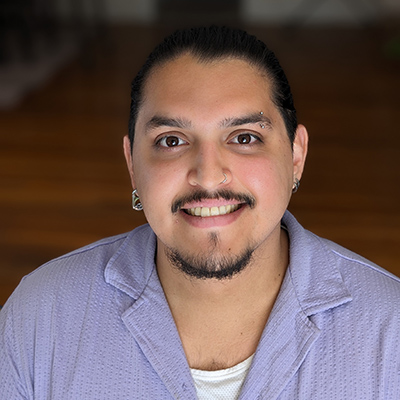 Undergraduate Major Profile
Undergraduate Major Profile
Mateo Olloqui
Mateo Olloqui is a rhetoric and writing studies major in his final semester at SDSU. Olloqui is happy to receive his degree after a six-year gap, completing most of his studies between 2015 and 2018. Despite his time away, Olloqui has remained committed to RWS. He first discovered the department while taking RWS 200 as a general education requirement. After enjoying the course, his professor encouraged him to pursue the major. At the time, Olloqui, a marketing major, did not know the department existed and saw it as a more flexible opportunity better suited to his interests in understanding a writer’s intentions and communication choices. While these interests might have led him to other similar or related areas of study, Olloqui says he “felt like RWS had a practicality and professionalism that creative writing or literature lacked.”
Ultimately choosing to call RWS home, the department has fostered his interests. The major’s required internship stands out to Olloqui amidst his experiences. Though “long and tedious,” he completed the internship, encouraging any current or future RWS majors to “stay consistent and keep reaching out to whatever opportunities appear.”
Olloqui cites RWS 510: Rhetoric and Culture (now RWS 410) as the most impactful course in the program because of its challenging but consequently rewarding nature. He specifically enjoyed learning about abolitionists and women’s rights activists like Sojourner Truth and Frederick Douglass, working with some of their speeches to understand the process of constructing such meaningful arguments.
Olloqui finds his own meaning in understanding this process. His ventures in this field have left him with the surprising truth that everyone uses rhetoric daily, now with the ability to notice the many small ways it shows up in people’s choices. “First impressions, word choices, and tone of voice have so much power…. I pay attention to the little things so much more because of my work here and I know I will bring a fresh perspective to my next job….” Olloqui takes comfort in rhetoric's open-ended possibilities and is confident, thanks to the skills he has developed from the major, that he can adapt to the various disciplines and settings in which it is used. “It is like someone gave me a magnifying glass in a world of near-sighted people who don't have glasses,” Olloqui shares.
Olloqui credits the grace and kindness of everyone in the RWS department for making his experience at San Diego State University so successful. He wishes to thank the department for meeting him where he was and accommodating the “financial and mental obligations” that put his studies on hold in 2018. The department is grateful for Olloqui’s loyalty to the program and wishes him all the best after graduation.
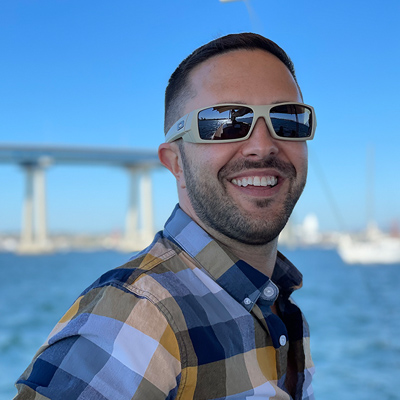 Undergraduate Minor Profile
Undergraduate Minor Profile
Matthew Miuccio
Matthew Miuccio is an undergraduate in his final year as a political science major, minoring in rhetoric and writing studies. He joined the department after transferring to San Diego State University in his third year, seeking a place where he could strengthen his writing skills for future career endeavors. His introduction to the program was RWS 411: Digital Rhetorics. However, his love and passion for the department took hold the following semester with RWS 410: Rhetoric and Culture. What lies at the heart of Miuccio’s commitment to the program? One word: intersectionality. Long inspired by classical Greek methodologies and philosophy, he chose RWS over other departments for its coverage of such a broad array of contemporary issues and subjects. “The fact that I could be creative while creating genuine meaning with my words galvanized my choice in RWS,” Miuccio shares.
Following his interest in intersectionality, it is no surprise that RWS 410 left a lasting impression beyond simply sparking his love for RWS: “It opened my mind to the constellating ways in which people from dissimilar backgrounds make meaning together and how beautiful that can be.” Miuccio explains that he is specifically curious about the intersections between cultural identity, political integrity, historical progress, and social philosophy — predominant themes in RWS 410.
In the wider scope of Miuccio’s studies within the department, he has learned how to deliberately and objectively understand and apply a blend of classical and modern ideologies, along with their respective rhetorical devices. This process reveals the primary insights he will take away from the program: a writer’s linguistic practices and intentions. “The highlight of my experience has been being given the wisdom to recognize [and empathize with] a writer’s values and ingenuity...”
Armed with heightened empathy and awareness, Miuccio plans to acquire an M.A. and Ph.D. after completing his undergraduate work next semester. With further education, he will be prepared to transfer what he has learned in RWS into a career as a government policy advisor. “I aim to help shape policies that bring us closer together as a society,” he explains. Miuccio's passions lie in taking an intersectional approach to legislation, using his rhetorical knowledge and writing skills to construct inclusive policies through “language [that] shapes power dynamics and societal structures.”
Miuccio is right at home in the department, with ambitions that echo the program’s focus on strengthening a lens of cultural and social awareness through which to make meaning in this world. He is pleasantly surprised by its multifaceted nature, valuing this focus deeply. Ultimately, Miuccio puts it best, “At its core, RWS is grounded in the belief that diversity enhances the meaning and power of written and artistic expression. Through rhetoric, we learn how to engage with different audiences, convey complex ideas, and appreciate how our unique backgrounds contribute to the richness of our communication.”
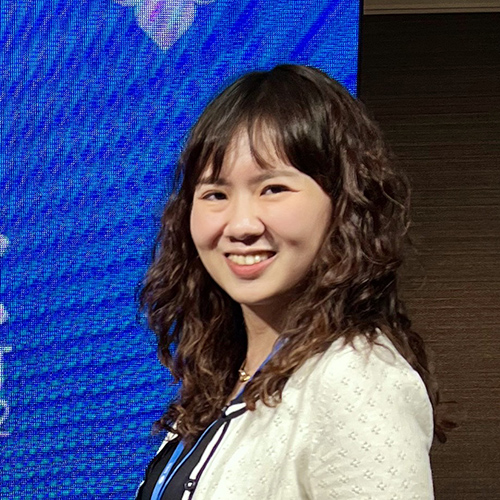 Graduate Student Profile
Graduate Student Profile
Lydia Rojratanakiat
Lydia Rojratanakiat is a second-year international graduate student in the RWS Department’s M.A. program. Hailing from Thailand, she graduated from Thammasat University with a degree in politics and international relations and later received an M.A. in communications from USC Annenberg School. She worked in various areas of political communication, such as “reputation management” and “crisis communication” for the Thai government, but she wanted to further hone her writing skills through another M.A. program. “I wanted to dive into a specialization that resonated with my values and ambitions,” she explains. The factors that led her to choose SDSU were friendly cohorts, professors investing in their students’ success, and a place “for serious scholarship with a human touch.” Additional opportunities to take her career in a new direction were also appealing. “I knew right away that I wanted to be part of a program that prioritized real-world readiness, not just theory. RWS is a significant department at SDSU, offering countless opportunities to practice and refine our writing skill,” she says.
Before starting the program, Rojratanakiat had thought of rhetoric as only a minor aspect in political science and communication, but she still “felt its presence” throughout her work. Joining RWS has created a “profound” shift in her perspective, whereby rhetoric has evolved from a “tool” to a fully realized discipline. “In RWS, we’re encouraged to dive into any topic that reveals these complexities,” Rojratanakiat notes. For her interests, she finds herself circling back to power dynamics as well as rhetoric and content creation’s intersection “in terms of influence and representation.”
One of her favorite courses is RWS 543: Rhetoric of Visual Composing with Jennifer Sheppard. This course helped her develop a foundation of the knowledge necessary to dig into data-driven stories and visuals. “Going in, I had no real background in visual rhetoric or data visualization, which is where so much of today’s communication is heading,” she states. She also emphasizes loving how her professors meet her where she is, instead of expecting expert-level knowledge, to ensure courses are appropriately “both challenging and deeply rewarding.”
When the opportunity for practical experience arrived, Rojratanakiat hadn’t expected it to be teaching, but she embraced the position. This is her second semester working as a teaching associate, teaching first-year writing. She enjoys guiding students in realizing how valuable writing is outside the classroom. “It’s a lifelong skill, a form of self-expression that’s everywhere in the world around them,” she asserts. “In my TA role, I’m already seeing how students light up when they realize the power of writing and rhetoric as a way to shape their reality.”
Rojratanakiat aspires to take the knowledge she has learned in this program to roles like content creation, reputation management, or crisis communication, but she can also see herself teaching. “Whether in academia or beyond, my goal is to use rhetoric to deepen people’s understanding of themselves and each other. I see it as a tool that can cut through noise and get to the heart of communication,” she shares.
Having completed three semesters in this program, Rojratanakiat is incredibly grateful for the support from a tight-knit community in her studies. “This isn’t just a degree. It’s a transformative experience, shaped by a community that cares deeply about each student’s journey,” she says, “In RWS, you’re not just learning about rhetoric. You’re living it, surrounded by people who push you to think, to challenge, and to grow. It’s more than just the curriculum; it’s the community that makes it exceptional.”
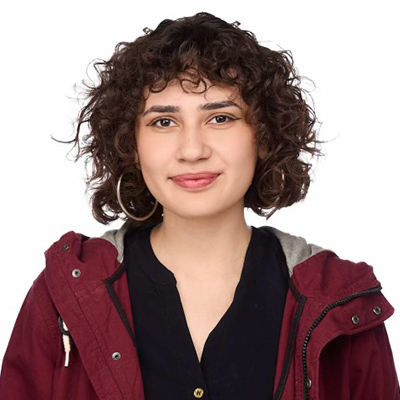 Alumni Profile
Alumni Profile
Mabel Aguilera
In spring 2023, Mabel Aguilera graduated from SDSU with an M.A. in rhetoric and writing studies with a focus in professional writing. As a technical writer for Rockstar Games, a video game publisher, she handles all requests for writing-intensive projects through Confluence, a Wikipedia-like website for tech companies to store their documentation. The program’s courses on professional writing in different contexts helped set up Aguilera perfectly for a career in technical writing.
Reflecting on her time as a graduate student, she names Jennifer Sheppard and Glen McClish as important faculty members throughout her academic journey.
In Sheppard’s classes, she recounts how “visual rhetoric, proposal writing and presenting to stakeholders for the Sage Project were all crucial in the foundation of [her] work.” McClish’s teachings on ancient rhetoric still “ring true today” for Aguilera, who recognizes Ancient Greece’s influence on contemporary rhetoric.
Although Aguilera enjoyed exploring various discourses in rhetoric and developing her skills in professional writing, there was a third reason to pursue the M.A. — how could she make her resume stand out? “Unfortunately for our generation, every employer requires at least a bachelor’s degree to apply and qualify for an entry-level position,” she points out. By having an M.A., she demonstrates to potential employers that she has the “ability to write well.” Accordingly, she supports her co-workers who aren’t experienced in conveying technical information to general audiences. “Engineers hate to write!” she quips.
Equipped with valuable skills learned in RWS, she put them to practice when given the opportunity. Her introduction to technical writing began with interning for Spectrum, a telecommunications company, to “learn the craft.” She was also a contractor for the San Diego Zoo, updating their documentation, as she finished the graduate program. Upon graduation, she accepted her first full-time position at Spectrum. Eventually, Aguilera made the jump to Rockstar Games to remain close to her family and friends in the San Diego area.
At Rockstar Games, she recently completed a long-term project for Confluence by making a homepage for a department of 22 teams. “It encompasses all their ongoing, finished, and archived projects, as well as a list of contacts for each team,” she explains. Aguilera worked on this project for several months, interviewing and researching extensively to ensure the homepage was accessible for “hundreds of users” in their everyday work. Mulling over the impact of her work, she says, “It makes me feel good to know that my work is being helpful and serving its original purpose.”
Writing is still an important part of Aguilera’s life outside of work. She started a writing club to keep her writer friends connected and to share individual pieces amongst each other. For her, it’s important to support creative writing as an outlet. “To not let ourselves forget why we went into this field to begin with,” she remarks.
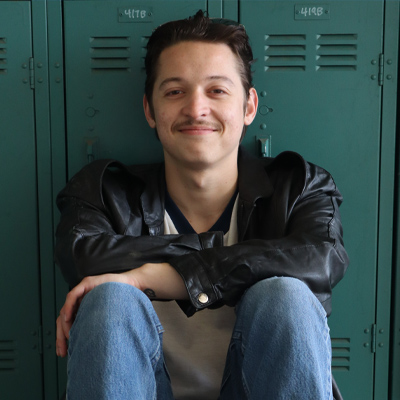 Alumni Profile
Alumni Profile
Greg Papania
Greg Papania, who received a B.A. in rhetoric and writing, currently works as a remote writing tutor for Tutor.com, an online tutoring company. His degree allows him to maintain his career in academia — his “favorite type of career.” Having always loved researching, reading, and writing, Papania jokes that he went a “bit crazy” post-graduation. “But now that I tutor students in the academic field, I feel much more fulfilled in my need to still feel involved in the education field,” he explains. He works with students on all kinds of writing, but essay writing is typically the most common.
Even so, majoring in RWS was not his first plan. He was originally working toward a degree in chemistry, but, before entering his third year of college, he made the difficult decision to switch majors.
“I was initially nervous, but that leap of faith made the rest of my college experience worth it,” Papania reveals. “Writing gives me life, and I don't know who I would be without it.”
He remembers his time in the program fondly, learning how to “perceive ideas and concepts under a different lens” and rethinking his “life under a different perspective.” When asked if there were any professors who made an impact on him, Consuelo Salas naturally came to mind. Salas was the “best lecturer” he learned from at SDSU since her classes helped him “fall in love with intellectuality itself.” Papania felt she always asked the “right questions to keep the class engaged” and “made every class session feel important.” When he entered her classroom, Papania recalls having never felt as important in his life than how he felt walking into her classes.
Papania completed one of his most interesting writing projects in Salas’ RWS 410: Cultural Rhetorics class, a paper on queer rhetoric and intersectionality. He explains his reasoning for choosing this topic: “My interest in my own community led me to dive deeper into the intricacies of the LGBTQ+ community, and more importantly, the messages, symbols, and people who make up the very foundation and culture of this diverse community. I wanted to shine a light on the beauty in which it shows, so this was an honor to research and discuss.”
The decision to make a “complete 180” from STEM to RWS proved to be the right choice for Papania. “I genuinely wouldn’t be who I am today without going through the RWS major,” he says. Although his career involves writing on a daily basis, Papania continues to enjoy writing in a personal sense. He makes sure to write at least once a week as the “act of writing itself” is akin to “[feeding his] soul.”
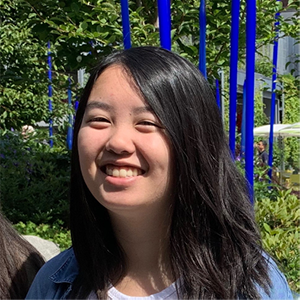
Amy Fong
Amy Fong is a second-year graduate student for the M.A. program in rhetoric and writing studies. When she was working toward a B.A. in English here at San Diego State University, her undergraduate advisor recommended trying her hand at the Certificate in Professional Writing program offered by the RWS department. During this period, she developed further interest in what rhetorics could offer her professionally and personally. After finishing her B.A., she decided to apply for the M.A. program with a focus in professional writing to help develop her career in technical writing. Fong is grateful for the opportunity to support the RWS Department and work alongside Althea to bring the fall 2024 newsletter to fruition.
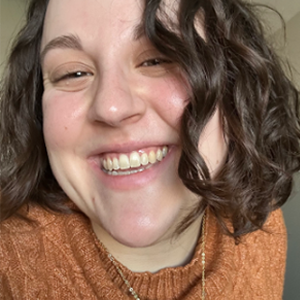
Althea Millman
Althea Millman is a rhetoric and writing studies major in the final year of her undergraduate studies. As co-editor of the fall 2024 newsletter, she interviewed fellow students and faculty in the department and wrote profiles highlighting their experiences. Alongside writing duties, she enjoyed brainstorming and collecting materials for department outreach. Millman has thoroughly appreciated her experiences in the program, deeply valuing its connections and community. She thanks Amy Fong for her kind and supportive collaboration in editing this semester’s newsletter. Millman is grateful to Kathryn Valentine for ultimately trusting her to represent RWS.
Spring 2024
The SDSU Rhetoric & Writing Studies Department Newsletter
Chair's Letter

I am happy to begin this letter by congratulating the RWS Class of 2024: Congratulations graduates! The department recently honored our graduates on Friday, May 10, at our 10th RWS graduation ceremony for undergraduate students and our 20th ceremony for graduate students. We look forward to many such occasions to come.
As I look back on my first academic year as department chair, I want to thank the students, faculty, and staff who all contribute to a vibrant learning community in our department. I also want to say thank you to two faculty members who have retired this past academic year: Richard Boyd and Cali Linfor. Boyd joined the faculty at SDSU in 1996 and ended his participation in the early retirement program after December 2023. While Boyd taught many courses and took on many roles in the department during that time, his contributions to preparing graduate students to become teachers of writing in RWS 609 stand out to me. Linfor also joined the department in 1996 when she taught courses as a graduate student and then continued as a lecturer. Linfor taught numerous writing courses and also contributed to the efforts of the department and university to develop inclusive and equitable courses and programs. You can read more about Linfor’s work in the fall 2022 newsletter.
This newsletter features two of our current students and now graduates, Richard Mattison and Mariel Geronimo. It also features two alumni of our undergraduate and graduate programs, Hannah Willis (B.A., 2017) and Matt Breece (M.A., 2015), and one current faculty member, Sydney Sullivan. We also say goodbye and thank you to our wonderful newsletter editors, Celia Fisher and Noelle Higgins, part of the graduating class of 2024.
While the end of the academic year brings many goodbyes, it also brings many new opportunities as our newest graduates find their way as rhetors and writers and as we all continue to explore rhetoric as a form of expression and art. I wish our students, alumni, faculty, and staff well in those future opportunities and explorations.
Kathryn Valentine,
RWS Department Chair
 RWS Writing Mentors
RWS Writing Mentors
Sydney Sullivan
The RWS department takes pride in the many ways it supports writers on campus – this especially rings true for Sydney Sullivan, as she details her involvement in the Writing Mentors Program as well as her overall experience as part of the RWS faculty. After finishing her qualifying exams for her Ph.D. in education in April 2023, Sydney began working for the Rhetoric and Writing Studies department later that year. Sydney enthusiastically recalls her discovery of the program: “I have a Designated Emphasis in Writing Rhetoric and Composition Studies so when I saw there was a department specifically dedicated to ‘rhetoric’ I thought ‘How cool?!’ It’s something unique I don’t believe other programs have to offer, and in my short time here I have already seen how impactful it can be to have rhetoric at the center of a curriculum.” Since beginning her work at SDSU, Sullivan has loved teaching courses such as RWS 290, Business Writing, along with being involved in the Writing Mentors Program on campus.
Sullivan is the co-coordinator for the Writing Mentors Program and she works alongside Lea Baker to ensure that the program is the best that it can be. Sullivan explains, “Together, we work to keep the program running smoothly and foster relationships between mentors, mentees, and instructors.” The Writing Mentors Program is “an embedded tutoring program that hires undergraduate and graduate students for our rhetoric and linguistic courses.” Through this program, students are able to grow in their writing and linguistic skills, and student workers are able to grow in their consulting and mentoring skills. When discussing the importance of the program, Sullivan says, “I think the ‘collaborative’ component is what makes this program so special because students working together can be such a transformative experience as they’re working through their writing process. Kevin Roozen writes about how ‘writing is a social and rhetorical activity’ and I think this program truly embodies that.”
For those looking to get involved in the Writing Mentors Program, Sullivan offers this invitation: “Come and talk to us! Lea Baker and I are always looking for eager undergraduates and graduate students who are interested in being a mentor. We hire people from all different majors and levels of experience, so please come talk to us or send us an email if you are interested.”
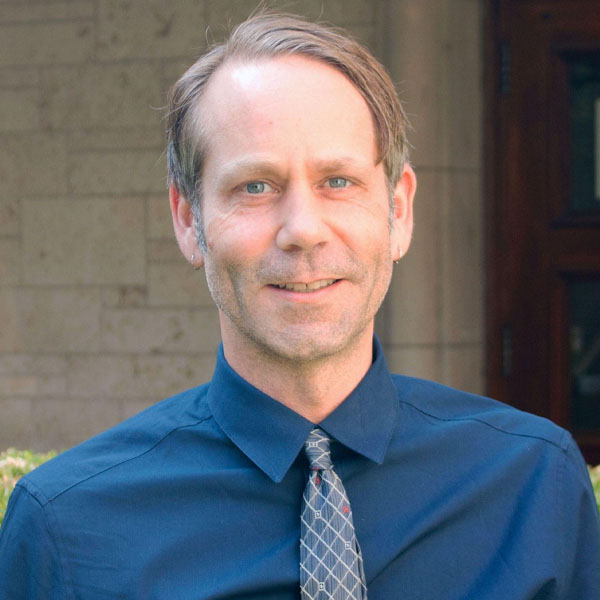 Alumni
Alumni
Matt Breece
Matt Breece, currently a lecturer in the Writing Program at UC Santa Barbara, describes how earning his M.A. in SDSU's RWS program played a large role in determining his current career path: “The M.A. program at SDSU helped prepare me for my Ph.D. program in rhetoric and writing at UT Austin. It not only prepared me for the application process, but it also prepared me for the type of advanced research and writing expected in a Ph.D. program.” After obtaining his Ph.D., Breece began work as a lecturer and reflects back on his time in the department fondly.
Thinking back on his time in the RWS department, Breece recalls the process of writing his thesis. “Writing my M.A. thesis was the first time I worked on a long, sustained writing and research project,” he says. “It definitely helped me become a better scholar, researcher, and writer. It also helped prepare me for writing my Ph.D. dissertation.” Not only did writing his thesis help him grow as a scholar, but so did the courses and professors that he interacted with. Breece mentions how his favorite course at SDSU was RWS 600, Reading Rhetorically, which was taught by Glen McClish. Breece says, “I really enjoyed practicing a variety of approaches to analyzing texts from evaluating arguments to examining rhetorical strategies to interpreting figures and tropes. It was a great introduction to the breadth and scope of rhetoric.” This foundational course, along with many others, helped Breece discover his passions in the field of writing – ultimately leading to a sense of newfound confidence for which he thanks the department.
Outside of the RWS department, Breece has worked on many interesting writing projects. When asked about one that sticks out in particular, he mentions that the most interesting writing project that he has worked on so far is an article he wrote for Philosophy and Rhetoric titled “Ethical Repetitions: Rhetorical Imitation and/as Algorithmic Judgment.” In this article, he compares classical imitation pedagogy with machine-learning algorithms to examine a rhetorical model for ethical inclusion. With his passions being sparked through the rhetorical foundations and teachings at SDSU, Breece was able to later on find a field that accompanied his interests. Though it is a lot of work, he concludes his interview with the following suggestion for current RWS students and/or those looking to be involved in RWS: “Learn as much as possible and enjoy yourself. The M.A. program is a fantastic opportunity, so get the most out of it.”
 Alumni
Alumni
Hannah Willis
As a graduate of the RWS B.A. program, Hannah Willis has smoothly transitioned into the workforce using several skills she once learned in the department here at SDSU. Currently, Willis is a senior marketing manager for RedMed, a medical device company where her specialty lies in their SaaS (software as a service) division – this provides “electronic health record software and other software solutions for facilities outside of the hospital.” Essentially, Willis generates leads through marketing campaigns. She also does content creation and explores a variety of channels for her campaigns, while simultaneously collaborating with a copywriter to ensure accuracy across the board. There are several overlaps in terms of tools she learned in RWS – some of which include a compelling argument, accurate messaging, and most importantly, making sure all of the above is catered to the right audience.
Though it has been a couple years since her graduation, Willis remembers the program as always being small and intimate – this is something that RWS prides itself on as it fosters close relationships with professors and fellow students. Additionally, she always “found the materials to be both interesting and relevant to [her] personal life.” Because of this, she was able to pick up on skills that she would later transfer to her career, and really learned how to understand people in general. For example, although Willis did not have any formal marketing education as her minor was in art, she used her RWS written communication skills to combine her major and minor in a way that was ideal for a career in marketing. She “started out as a marketing copywriter intern while attending SDSU and has worked up to the position [she] is now by using [her] experience and education.”
Willis is thrilled that she has been able to use her skills from RWS in her career today. When asked about her most interesting writing project, she replied that it is her current position that makes her happiest. Willis enjoys writing and working on the marketing campaigns the most as she loves being able to “start with an idea and bring it to life with copy and design, then evaluate the performance to really see what's resonating with our target audience.” Currently happy with where she is in her career and grateful to the department for introducing her to new skillsets, Willis also recognizes that finding a career that is meant for you will take time. Ending her interview with gratitude, Willis offers the following advice for current/future students:
“Your professional career is not always linear. You don’t always stay with one company for a long time. Sometimes, you might have to jump from company to company until you find a position where you feel like you belong. Also, if you feel undervalued, you should listen to your gut and find another opportunity – despite how difficult it might be to leave. There is no such thing as rejection, only redirection.”
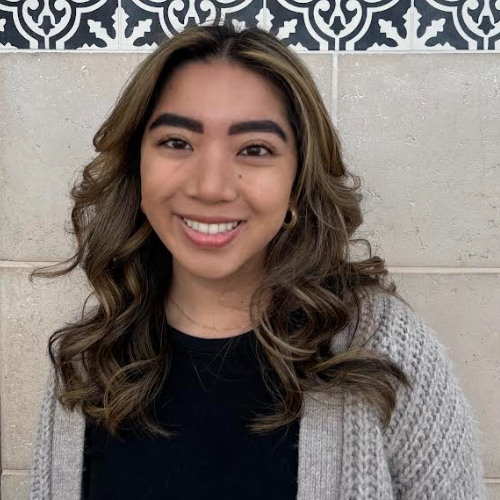 Graduate Student
Graduate Student
Mariel Geronimo
Current RWS graduate student, Mariel Geronimo describes her undergraduate education in philosophy as a beneficial gateway into the work she has been doing in the RWS department. She notes that “while philosophy and rhetoric are different, the ability to think abstractly and critically enabled [her] to understand the core foundations of rhetoric.” The intersection of her education in both philosophy and rhetoric is something that has defined her career not only as a student, but also when it comes to her professional plans for the future. After graduating with her B.A. in philosophy in 2020 and with the goal of eventually attending law school in mind, Geronimo was encouraged to pursue different graduate programs. Geronimo recalls applying “to the RWS M.A. program after seeing they offered a specialization in professional and technical writing.” Ultimately, she decided that earning her M.A. in rhetoric and writing studies was the right path for her, and has been preparing for law school ever since.
Geronimo reflects on a few courses and professors that impacted her greatly throughout her RWS experience. “An inspirational course I took is RWS 504, Advanced Professional Writing, with Jenny Sheppard,” she says. “I enjoyed this class because it taught me the practical elements of rhetoric. We had the experience of working with a nonprofit organization to help them find ways to build their mission. The application of analysis, research, and persuasion to develop our ideas allowed me to understand what rhetoric is beyond the classroom; rhetoric gives us the opportunity to utilize what we have learned in the classroom to make a difference in our community.
“My favorite course is RWS 601A with Glen McClish. What I enjoyed the most about this course was seeing the intersection between the texts from this class and law. The dense readings and the writing assignments in this class have elevated my persuasive skills which I know will be useful for law school. The writing assignments in this class taught me how to communicate my point effectively from the preparation and research I had to do.”
When discussing her thesis, Geronimo was eager to describe the work that she has been doing. “For my thesis, I analyze three landmark United States Supreme Court cases –Brown v. Board of Education of Topeka, Lau v. Nichols, and Regents of the University of California v. Bakke – to evaluate kairos and narrative through the lens of racial discrimination in education. Her thesis work will directly inform her next step: attending law school in the fall. Although she has not yet decided where she will attend, Geronimo is grateful for the RWS department and for all of the support she has been given. She urges current students to “choose a career path that you are genuinely interested in and passionate about because your determination for it will outweigh the challenges that may come your way.”
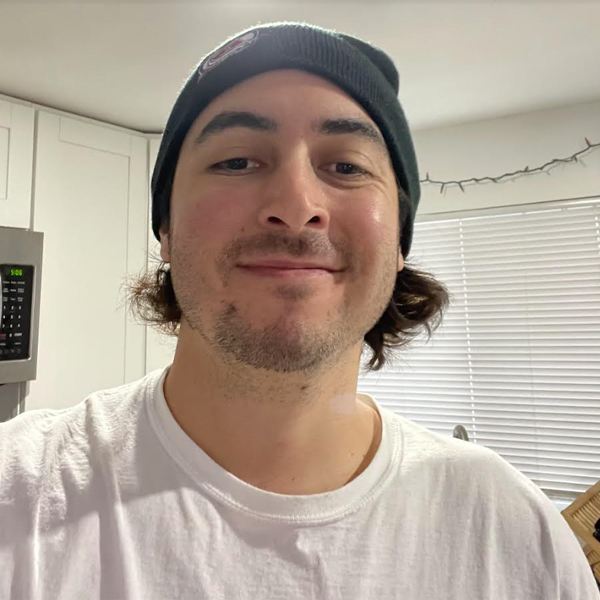 Undergraduate Student
Undergraduate Student
Richard Mattison
As a current senior in both rhetoric and writing studies and business administration, Richard Mattison could not be more grateful for his time here at SDSU as it has helped him “develop a comprehensive perspective on rhetoric,” and expand on skill sets that differ from a traditional English major. When asked about how he first discovered the RWS program, Mattison remembers feeling curious about a major that could so greatly differ from a typical English course; however, after taking his first class after transferring, he was hooked. Due to the wide range of coursework that RWS offers, Richard was able to pair his business administration major with courses in professional writing, business writing, and even writing for nonprofit organizations – something that he can see himself partaking in throughout his future as he enters the workforce.
Though he has enjoyed many courses here at SDSU, the one that stands out most to him was RWS 543, Rhetoric of Visual Composing, with Jenny Sheppard. Not only was it “fascinating to learn about rhetoric in non-writing settings,” but “[he] had this class with all of [his] friends! [They] all grew closer in this class and had some good times. This combination made it an interesting, fun, and wholesome class to be a part of!” Additionally, pairing these visual skills with key concepts of rhetoric like tailoring your writing to certain audiences once again reminds Mattison that “there’s no one-size-fits all approach to writing. Each project is unique and requires time to consider the audience, goal, and overall objective. It often takes time and effort to conduct this step, but it will often be the difference between average work and excellent work that stands out from the rest.” Mattison has been able to experience this first hand through applying these skills in projects including academic writing, proposal writing, resume and cover letter writing, research projects, and even grant proposal writing – once again giving him confidence that he will continue to use these skills after graduation.
With graduation coming up, he is equally thrilled yet filled with a sense of bittersweetness as he departs from SDSU. While he will miss his professors and classmates, he feels prepared to take on new challenges with his several career goals. Eventually, Mattison hopes to be a successful entrepreneur and “start businesses that have a positive impact on people and the planet.” Additionally, he mentions that no matter the type of business, “writing skills are critical when growing a company.” Though his goals are centered around the idea of entrepreneurship, he hopes to be able to explore the creative side of writing as well as he “loves the storytelling element of writing.”
Mattison expresses his gratitude for everything the RWS program has taught him. Because of teachers and lessons learned along the way, he has been able to hold an internship with an international business organization for two years, developing both friendships and professional relationships, and overall learning how to apply his critical writing and communication skills in areas both in and out of the classroom.
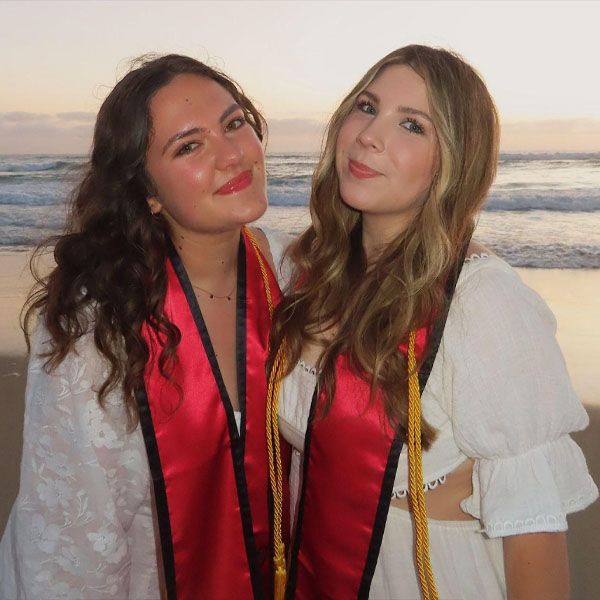 Farewell to our Editors
Farewell to our Editors
Celia Fisher and Noelle Higgins
As graduation approaches, Celia Fisher and Noelle Higgins reflect on their time as the rhetoric and writing studies newsletter editors. Since 2022, the pair have been able to edit five issues while continuing their full-time student status, involvements on campus, and even studying abroad for a semester. The following piece is their sincerest form of gratitude to the RWS department and San Diego State University as a whole.
“The two of us were newly admitted to SDSU when we were hired for this role and had no idea what to expect after coming to college in a post-COVID era. We were both RWS majors looking for a way to become more involved in the department when we got an email asking for undergraduate students to apply for this newsletter position. Though we were equally timid, we both applied, and were surprised when we both got the role as we thought it would be a one person job. Little did we know that because Glen McClish chose to hire the both of us, we would gain invaluable experience in the field of writing, but also gain each other as best friends for life.
“Throughout the course of our time here at SDSU, we have been fortunate enough to learn how to greatly improve our composition skills, effectively analyze texts, and overall focus on bettering our journalistic expertise. Through not only the teachings of the RWS department, but because of the direct supervision of Glen McClish and KathrynValentine, we feel as though the development of our professional skill sets have directly correlated to how we were able to grow into ourselves as writers, students, and soon to be graduates. The two of us agree that if we were to see our freshman-year-selves right now, they would be incredibly proud. As two students who used to be scared to raise their hand in the classroom, we feel that RWS has given us the tools we needed to fully find our voices.
“As we sit in the Love Library writing this as our final piece for the newsletter, a feeling of nostalgia has come over us. We feel so lucky to have had this position for so long, and to have enjoyed it enough to wish that we could keep writing even after graduation; however, we know that it will be in good hands for years to come. Thank you to every professor, faculty member, alumni, and fellow classmate that was a pleasure to interview and write about, and thank you to SDSU for constant encouragement and support. Farewell RWS and SDSU!”
Fall 2023
The SDSU Rhetoric & Writing Studies Department Newsletter
 Chair's Note
Chair's Note
As I reflect on the stories of fall 2023 in this newsletter and on my first semester as department chair, I am reminded again of rhetoric and writing as discovery, as practices and products of coming to know the self, each other, and the larger communities in which we belong. I am also reminded again of how rhetoric is a means of coming to understand one’s voice as discussed by Emily Tablak and one’s dignity as talked about by Issac Castillo. In their discussions of the study and practice of writing pedagogy, I rediscover the shared values that many of us center in our teaching and learning such as the design of curriculum focused on meaningfulness as explored by Nathan Nugent and the attention to students’ vulnerability when they read and write in academic spaces as described by Chelsea Kerford. Last, I see rhetoric and writing as processes of discovery in the exploration of Caroyln Gubala and Kristen Fogle as they describe their journeys through academia, including revisiting old ideas in new contexts as with Carolyn, and across workplaces, including finding writing opportunities as with Kristen.
I also reflect on my own process of discovery as the department thanked Glen McClish for his many years of service as chair and as I began in the role of chair in August 2023. I discovered that Glen continues to be a valuable colleague as he works for the department through the early retirement program and continues to offer guidance to me and others. As a sign of our change in positions, Glen now has my faculty office while I inhabit the chair’s office – and a beautiful view of San Diego. From this vantage point, I reflect on how rhetoric and writing happen on campus, and all the many people in our department who support such work, but also how and where rhetoric and writing may be happening beyond campus and the many ways our alumni and those in our communities engage in this work here in San Diego and beyond. I hope you enjoy reading about some of those ways here.
Kathryn Valentine,
RWS Department Chair
 Students
Students
Nathan Nugent
Nathan Nugent is a current graduate student in the Department of Rhetoric and Writing Studies at SDSU. After earning his B.A. in journalism from San Francisco State University, Nugent enthusiastically describes his experience discovering the RWS M.A. program: “I had been thinking about getting into a master’s program for a few years while I was teaching high school English between 2015–2022, but I knew I didn’t want to get an M.A. in education. The RWS program at SDSU came up on a Google search looking for M.A. writing programs in the CSU system, and I was directed to a one-page brochure for the program that looked very appealing with the emphasis on rhetoric very much in line with my interests. I also saw that there was a teaching of writing specialization pathway within the major along with an opportunity to work on a thesis option for graduation – while living in San Diego! It became my dream.” Nugent continues on to describe how much he has enjoyed his learning so far throughout the department, mentioning how inspiring it was to discover “how rhetorical study is rooted in such a rich teaching tradition stretching back to the ancient world.”
When discussing the most interesting writing project he has worked on so far, Nugent describes a paper he wrote during his first semester in the program. “I crafted a seminar paper for RWS 609, with Professor Richard Boyd titled ‘Consulting Student Leaders: Cogenerative Dialogue in Practice and Theory.’ In the piece, I use concepts from critical pedagogy to reflect on my experiences conferencing with high school students in ‘leader lunch’ meetings I created during and after the COVID era of online instruction.” He mentions that he would like to continue his research on this project based on his recent experiences as a TA for RWS 100 and 200 classes. Along with that, Nugent mentions the most inspirational course that he has interacted with so far as a graduate student. He states, “RWS 640, Research Methods with Professor Kathryn Valentine has been my favorite and most significant course in the M.A. program so far. I liked how we took the course in our second semester of the program to figure out what kind of research we wanted to explore. Professor Valentine’s course sequence also helped me think about how to apply concepts in qualitative research and rhetorical criticism, and my abilities as a writer grew by taking on new and challenging genres of composition.” Nugent explains how engaging the coursework is overall, and discusses the incredible community that is established in the department.
Nugent describes an especially notable moment during his time so far in the RWS department. “This past summer of 2023, I attended the Computers and Writing Conference, at UC Davis. At the event, I was able to present the preliminary ideas from my research proposal in RWS 640 at a roundtable with professors and fellow graduate students, and I got some meaningful feedback. I was also able to join Professor Edwards and Professor Jenny Sheppard, who were also in attendance, in sessions ranging from AI in writing instruction, digital tools in reading and scholarly writing production, and the ‘Wayfinding Project,’ a large-scale qualitative study on what college alumni remember most fondly about their writing experiences as undergraduates.” He mentions how fortunate he was to have been able to attend this conference and how much he learned from this experience. Along with that, Nugent works as the Graduate Teaching Assistant in the lower-division writing program. With this position, Nugent mentions that he has “had the honor of designing common curriculum that integrates the department’s new student learning outcome which includes a focus on “rhetorics of global and structurally marginalized communities.”
As for his work as a graduate student and beyond, Nugent is currently working on his thesis. He states, “Drawing on the research methods I’ve practiced in RWS 512 and RWS 640, I am proposing a basic qualitative study for my thesis prospectus. The purpose of the research is to discover how teachers of first-year college writing courses design meaningful writing prompts. I’m most interested in using replicable interview methods to gather data on how teachers think about writing assignments, and hopefully I can arrive at a few pedagogical recommendations.” Nugent is incredibly passionate about his work within the department and describes each one of his experiences and opportunities with such gratitude. Lastly, Nugent mentions his aspirations for after he obtains his M.A. “I plan on pursuing full-time work as a lecturer in rhetoric and composition for at least two years to gain more experience teaching in higher education. I am also considering applying for Ph.D. programs later in my life, but at the moment, I want to keep working on writing projects for potential publication and doing as much as I can with students in the classroom.”
 Student
Student
Emily Tablak
Emily Tablak is a dedicated individual who is in her fourth year as an RWS major at San Diego State University. As the CAL representative for SPLICE, the journal of undergraduate scholarship, Emily mentions that her main role is to “work to recruit and convince people to submit their work. I also employ visual rhetoric skills since at the moment I am co-running the social media pages.” This, in combination with her involvement in the rhetoric and writing studies major, prepares her for a whole field of job opportunities by sharpening her writing skills. Though she is nearing the end of her time at SDSU, Emily is grateful that she has been able to “find confidence” in herself and her voice.
When asked about her involvement in the program, she mentions that a main reason for joining the department was because of a push from her RWS 200 professor who was impressed with her work. After doing so, she soon discovered that the reason rhetoric stood out to her was because “it felt much more personal. The projects I have created for my classes have been an amazing outlet for me. I think rhetoric gives students a way to voice opinions and talk about subjects they might not otherwise get the opportunity to discuss in other settings.”
Emily once again thanks the professors in the program as they are a critical part of why she stayed so involved in RWS. “They have been very supportive and are always eager to help,” she says. “The classrooms have always felt like safe spaces where students are allowed to voice opinions and concerns.” Due to the seminar style of a lot of RWS classes, creating a comfortable environment is something that the department has nearly perfected.
An example of this is an upper division course, RWS 510: Rhetoric and Culture. Emily mentions that it “opened my eyes to so many different forms of rhetoric and even helped me find my own voice and the ways culture influenced my own forms of communication. This class made it very apparent that there are so many diverse ways of communicating with others, and we should embrace that everywhere, including the classroom.” She wishes that more people understood that RWS is “so much more than just a GenEd and has the potential (whether it is your major or minor) to build your communication skills.”
Not only has Emily found confidence in herself in class, but while doing so, she learned the value of effective communication in both social and professional settings. With this, she hopes that as she departs from SDSU, students give the unique program a chance and that they realize it is “so much more than just writing essays and learning about old Greek philosophers. This program is a way for students to discover their own voice and learn the ways to effectively communicate their opinions and beliefs.”
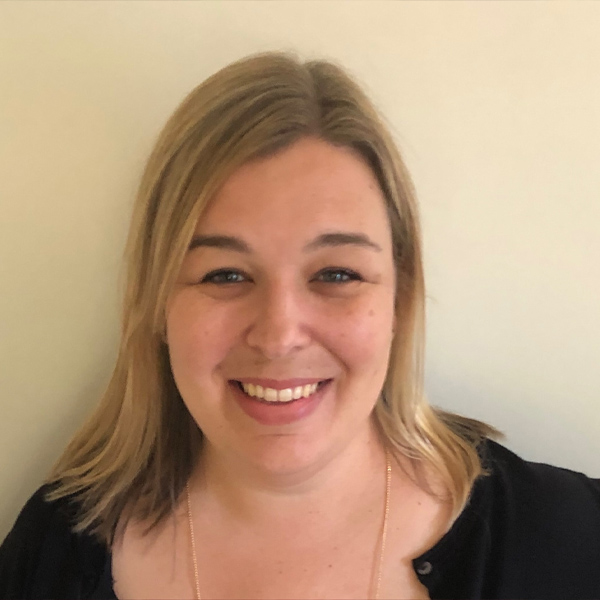 Alumni
Alumni
Carolyn Gubala
Currently working in the University Writing Program at the University of California Davis, Carolyn Gubala enthusiastically shares what her experience was like obtaining her M.A. from the Department of Rhetoric and Writing Studies at San Diego State University. Gubala describes the original appeal of the RWS program for her when she first discovered it: “At the time, I was working full-time as a managing editor for a small publishing company in San Diego. Originally, I wanted to pursue an M.A. in RWS so that I could teach at the community college level; however, being engaged in graduate level discussions with classmates and professors inspired me to pursue a Ph.D.” Gubala goes on to explain the supportive and positively challenging nature of the program, describing her peers and the faculty she interacted with to have created a strong “sense of community” that has been “developed through meeting like-minded individuals.” She also says that her experience within the department set her up for success further on in her rhetorical studies. “My M.A. in RWS from SDSU provided a rich foundation in rhetoric and composition. I entered my Ph.D. program with a solid understanding of rhetorical theory, classical rhetoric, and teaching approaches.”
When discussing her experience writing her thesis, Gubala mentions that she is revisiting this topic and expanding on her original work. “I wrote a thesis on using ancient rhetoric to teach professional writing. Looking back, I can see that I lacked enough experience in academia to properly articulate this argument. However, I have recently returned to the ideas behind this project. Specifically, I have recently started a project with a colleague that suggests using the progymnasmata and classical interpretation of imitation to teach writing instructors.” Gubala is incredibly passionate about her work, and looks forward to continuing her conversation on this topic that began within the department.
Along with revisiting the ideas from her thesis, Gubala continues to further her research on many topics of conversation within the field. Specifically, she is currently working on a book about teaching the technical professional communication (TPC) service course with some colleagues. In regard to this course, Gubala states, “The service course refers to business writing, health science writing, and writing for engineers. Our goal is to improve pedagogical practices for teaching TPC service courses using student data, instructor feedback, and interviews with teaching faculty and program administrators. The quantitative and qualitative data collected will be analyzed to offer suggestions on improving pedagogical practices such as outcome integration, assignment design, and feedback.”
At the University of California Davis, Gubala brilliantly implements her rhetorical pedagogical background into her work. When discussing her work, she states, “I primarily teach editing, business writing, technical writing, and advanced composition. As part of this position, I also have an administrative role where I serve as the assistant director of online writing instruction.” Gubala looks back at her time in the master’s program with fondness, and reflects positively on both the courses she took and the faculty in the department — encouraging students today to get involved and make the most of their time here.
 Alumni
Alumni
Kristen Fogle
Kristen Fogle is an alumna of the RWS master’s program who now focuses her time on being the executive director of the literary nonprofit, San Diego Writers, Ink. After graduating from SDSU, Fogle has focused on jobs in several different areas of expertise, though all still pertaining to composition. She has worked at Point Loma Nazarene University, Armed Services Arts Partnership, Wounded Warriors Project, La Jolla Playhouse, and Coronado School of the Arts. Fogle says, “At PLNU I am teaching undergrad writing and rhetoric and for the others I teach a variety of things — playwriting, creative writing, whatever type of writing someone wants me to teach!” Grateful for her time at SDSU, she reflects on the uniqueness of the RWS program as it “prepared me to teach at the college level and, maybe most importantly, instilled a confidence in me that I could work at a literary center.”
While enrolled at SDSU, Fogle was met with a number of opportunities to grow her career. One of which was when she served as the vice president of the Graduate Student Association. While she was helping others and offering resources to students alike, she found that she was making connections and finally excelling at something she was passionate about: teaching and tutoring. However, this path was not always on Fogle’s mind. Through a technical writing course she took, she scored an internship with Hewlett-Packard. While “HP was great in a lot of ways,” says Fogle, “I just didn’t enjoy technical writing. I stuck with it for three or four months, and despite that they offered to bump my pay, I just knew I needed a job that was a bit more creative. I’m proud of myself that I said no, simply having a good job is not enough for me.” Fogle mentions that this lesson of being able to “try new things, but don’t be afraid to call it quits if you don’t like what you’re doing,” was something that she learned in the RWS department, and it has stuck with her for years.
Despite her love for writing in the professional world, Fogle also enjoys bringing rhetoric into her personal life. With a five-year-old at home, Fogle discusses how much the two enjoy reading together. “We also spend a great deal of time dissecting the characters, looking at symbolism… I ask a lot of questions. I guess the takeaway is, rhetoric will help you parent.” Fogle jokes at this remarking, “Perhaps I should make t-shirts!”
At the end of the day, Fogle couldn’t be more grateful for her time at SDSU as it has sharpened her career in ways she didn’t think possible. When asked about her personal philosophy on the importance of rhetoric, Fogle ends with the following statement:
“For me rhetoric offers a set of tools to peel away layers, peek behind the veil at something — a slogan, an essay, architecture — and make sense of it in a new, and richer, way. As a culture, with ‘truth’ being delivered faster than ever and often by way of an algorithm, I believe it’s crucial for us to take an active interest in to looking deeper into who is communicating what messages and why.”
 Faculty
Faculty
Chelsea Kerford
After starting out as a grad student in the RWS department here at SDSU, Chelsea Kerford began working as a lecturer in fall of 2017. Now, coming up on her seventh year of teaching, she reflects on her mother as an inspiration: “I used to go to class with her when I was little and watch her teach ESL.” This was a formative experience for Kerford, as it was something that she kept in mind while on her journey to find a career she loved; though at the time she was venturing into the field of publishing. After giving publishing a try and ultimately deciding it wasn’t for her, she was reminded of another possibility when a teaching opportunity “fell into her lap.” Before she knew it, a community college needed an instructor to teach a GE writing course, and just like that, Chelsea immersed herself in a field that was familiar from her childhood experiences with her mother.
During this experience though, she was faced with several challenges. She was instructing “non-traditional students, many of whom were recently incarcerated or formerly (or currently) houseless, and many of them were neurodiverse.” Kerford expresses her gratitude for this experience, but in the moment she remembers feeling overwhelmed as it was “a pretty difficult job for a new teacher.” However, this experience is what made her want to go back to get her master’s as she “fell in love with teaching.”
Now, since Kerford found her passion, she is able to focus her research on something important to her: identity. Kerford explains that being biracial is something that has been both interesting and confusing for her. Because of this, she focuses on how to express vulnerability when it comes to writing as well as teaching. Another reason for continuing her studying and teaching of rhetoric was due to her realization that “there are so many pieces of everyday life that become easier and more accessible if you have at least a basic understanding of rhetoric/rhetorical principles.”
While Kerford may love the subject that she teaches, she admits that the reason she has stuck around so long is because of the students. She talks about how getting to know their personalities while helping them improve their writing skills is not only rewarding, but also “makes [her] classes so much richer,” and that she is “constantly learning from them, which is so fun.” Seeing the students’ personalities shine was something reflected in her recent RWS 305W class. Kerford explains that because of the unique flexibility of the course, she got to see students’ creativity flourish. From assignments like blog posts via Adobe Express, students had the option to practice pragmatic rhetorical skills in addition to extensive creative freedom in a less formal environment. Overall, Kerford is always striving to better the education of her students, and hopes that she can allow them to feel comfortable in an academic environment that can be quite intimidating.
 Staff
Staff
Isaac Castillo
Isaac Castillo has been working at San Diego State University since 2020 and has recently begun his position in the RWS department in 2023. “I have worked for SDSU in various capacities. Prior to this administrative position, I taught for General Studies, GEN S 100, the course that first-year students take. Before that I was a teaching associate for the philosophy department.” Although having no prior connection to RWS, Castillo brings a wonderful perspective on the administrative side of the department and the university in general. He states, “The best part of working at SDSU are the people and the culture. Usually people are understanding of circumstances, dilemmas, or even everyday errors. RWS is a large department with a lot of gears, levers, and people to push the gears and levers. I do not think most people outside (maybe) RWS understand how big this department is and how much ground there is to cover. Problems can come from any direction, but at least solutions can come from everyone as well. Thankfully there is a lot of support.”
Castillo reflects on his time in the philosophy department, mentioning his biggest influence and mentor, Steve Barbone, who Castillo describes to have “taught [him] more than [he] could ever repay him.” Writing his thesis was an incredibly positive experience for Castillo as it was something he was so interested in. “My thesis was probably the only passion project I had,” Castillo says. “I wrote over 120 pages in the first draft, and it took forever to get it under 100 pages for the final draft (not including the bibliography). I wrote about David Hume and motivated cognition.”
When discussing rhetoric and writing studies, Castillo describes his stance on the importance of rhetoric in an incredibly compelling way. “I think understanding how to persuade and using a specific skill set to do so is a necessary condition of living well in society,” he says. “If you cannot take a stance and use that stance to change people’s minds or at least their initial degree of vindication on some matter, then I would imagine that the world would seem like a difficult thing to engage with at times. Too often do people want to sell you on something, convince you about some matter, but so long as you can take that stand and agree/disagree and more importantly offer reasons for doing so, then you have something for yourself in terms of dignity and self-respect.” Castillo continues on by including a modern-day example of why rhetoric is important. “If you happen to watch ABC’s ‘Shark Tank’ you’ll know that Mark Cuban made the phrase ‘[…] and for those reasons, I’m out’ as actually an enthymematic moment. While we might think about the rhetoric of ‘Shark Tank,’ Cuban can teach us something about taking a stance and its use. What this shows us is that rhetoric is a multifaceted tool.”
Castillo offers some valuable advice to current and prospective students. He states, “I wish I would have known to read more and learn who to ask to read the right things during my studies. Obviously, you can’t read everything. However, I wish I would have known what to prioritize.”
Meet the Editors
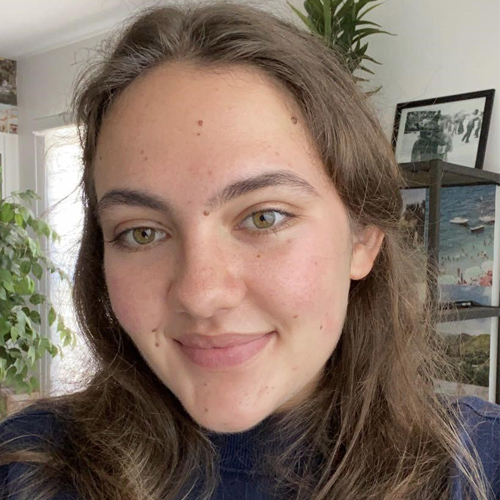
Celia Fisher
Celia Fisher is a fourth-year student majoring in rhetoric and writing studies. After working on the RWS newsletter for the past two years, she is incredibly thankful for her time in the department and the wonderful connections it has brought her. She hopes to continue with this style of writing after graduating this upcoming May, and hopes that the RWS newsletter will continue to thrive after she and her co-editor, Noelle Higgins, depart from SDSU.
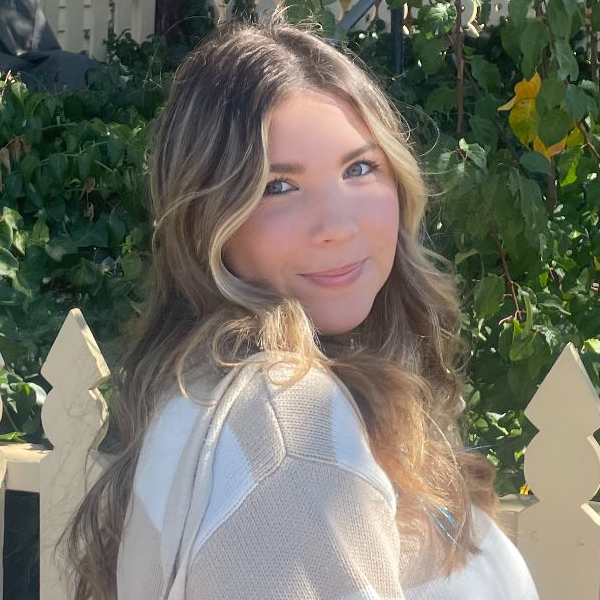
Noelle Higgins
Noelle Higgins is currently a fourth-year rhetoric and writing studies major. She has enjoyed her time in the department immensely over the past few years both as a student and student worker. The RWS department will always hold a special place in her heart, and she is especially grateful for the wonderful opportunities she has come across and the special friendships she has made along the way.
Spring 2023
The SDSU Rhetoric & Writing Studies Department Newsletter
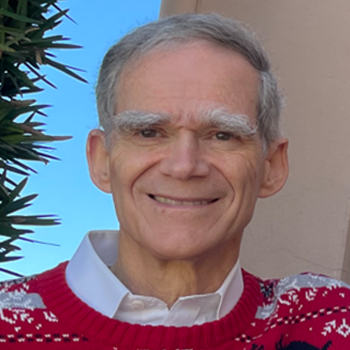 Chair's Note
Chair's Note
Dear colleagues, alumni, and friends of the Department of Rhetoric and Writing Studies,
2023 marks the 30th anniversary of RWS! To celebrate this milestone and to reflect on our departmental history, this issue of the department newsletter features reflections by two women who played instrumental roles in the founding and development of this academic unit: Professors Emeriti Susan McLeod and Ellen Quandahl. These two teacher-scholars of rhetoric and composition had distinct, yet complementary roles in establishing and building our programs. To further our celebratory mood, I am delighted to announce the establishment of the Ann M. Johns Scholarship for Rhetoric and Writing Studies. This scholarship, made possible by a very generous endowment provided by Ann Johns, professor emerita of linguistics and rhetoric and writing studies, will support students pursuing degrees in the department.
Johns, one of the “Founding Mothers” of the Department of Rhetoric and Writing Studies, is an internationally known teacher-scholar who specializes in literacies, genre, and English for Specific Purposes. She has taught or consulted in 20 countries. Since her retirement in 2002, she has been consulting with — and writing literacy curricula for — diverse college-bound secondary students. She continues to be an active, innovative teacher at SDSU who requires extensive writing and analysis of texts in all her classes. Her commitment to students, particularly those who face linguistic, economic, and cultural challenges as they transition to college, is legendary. Read more about Professor Johns and the new scholarship.
Please join me in thanking our dear colleague Ann for her generosity and commitment to the success of our students and enjoy reading about a number of the many people and events that make RWS special.
Best wishes,
Glen McClish
 The Landmark Lecture
The Landmark Lecture
Dustin Edwards
Dustin Edwards is a first-gen college graduate who began his journey in academia at New Mexico State University. After switching his major nearly four times, Edwards recalls the struggle of finding a degree that would lead him down a clear path to finding a job. He initially thought that “a degree in journalism meant a job as a journalist. Clear. Easy.” However, things weren’t as easy as he imagined when he graduated in 2008 during the housing crisis and economic recession. Looking at a “daunting job market” prompted Edwards to continue in academia and earn his M.A. in rhetoric and professional communication. Due to his background in journalism, Edwards thought that he would be more interested in the professional communication aspect; however, after having the opportunity to teach first-year writing as a graduate associate, he “was hooked” and went on to complete a Ph.D. in composition and rhetoric at Miami University in Ohio. Following his Ph.D., Edwards worked as an assistant professor of writing and rhetoric for five years at the University of Central Florida in Orlando prior to joining us at SDSU in 2021.
As a recent addition to the RWS department, Professor Edwards was well positioned to organize SDSU’s most recent Landmark Lecture. Edwards, with the help of Karen Keene, Glen McClish, and Matt Gantos, chose the theme “Violence, Precarity, and Doing Rhetoric Otherwise in the Borderland.” After strategically selecting participants to lead the various discussions surrounding the issues that come with San Diego being a border city, Edwards landed on Sonia Arellano and Kenneth Walker.
The Landmark Lecture, for those unfamiliar, is “an opportunity for faculty, students, staff and scholars from outside the university to converse and engage in pressing issues that are circulating in the fields of writing studies, rhetoric, and composition.” Although this was the 22nd event, the Landmark Lecture is praised for keeping originality and relevance through every event. In the past, subjects addressed have ranged from ancient rhetorics, to online pedagogy, to linguistic justice. These lectures allow “us to get keyed-into the broader conversations happening in the discipline, and it’s a way for graduate and undergraduate students to get one-on-one time with academic leaders in our discipline,” Edwards says.
This year, Arellano and Walker gave a presentation together that focused on rhetoric in the borderlands. Each spoke on their own research projects relating to the matter. Walker presented his book project, “Climate Politics on the Border: Environmental Justice Rhetorics,” in addition to a community project about bird migration, extinction and Indigenous knowledge practices. Arellano spoke about her work with the Migrant Quilt Project, which touched on how quilting can honor those who have died while attempting to cross the U.S.-Mexico border.
Arellano and Walker both presented important insights that reflected in the discussion afterwards. Edwards states, “Moving back and forth between Dr. Walker and Dr. Arellano, we saw an accumulation of stories about border crossings, about violence, and about art-based projects that imagined this violent world otherwise.” Both speakers intentionally separated their viewpoints on the matter and drew a careful line between opinion and fact; clear steps were given to how they approached their work while also staying rather humble. Something that was done notably well was their ability to highlight the work of the community and participants alike. Edwards reflects on his appreciation for how the talk concluded, “Dr. Arellano ended on a hopeful note — that there are small, potent gestures we can make to change our worlds, to make them otherwise.”
Overall, Edwards notes that our perception of rhetoric contributes to our understanding of “language, frameworks, and practices related to living and negotiating our often-messy everyday lives.” Rhetoric “forms our relationships, our ways of understanding the world, and our ways of being in the world.”
After reflecting on the Landmark Lecture, Edwards suggests the following to any students seeking advice:
“I think it’s important to make things. Make things that matter to you and challenge yourself with finding creative forms that open you up to new experiences. Rhetoric can take you in so many different directions. There is certainly beauty in that, but it can be overwhelming too. Find what holds you, what keeps you invested and wanting to know more about.
I also think it’s important to be practical. What are your long-term goals and how can you get there? How can you interact with people who are in roles you desire and learn more about how they got there? How can you get experiences in your university years that will propel you into where do you want to go? Of course, that path may well change, but getting a wealth of experiences and talking to lots of different people might make the horizon on that path a little clearer.”
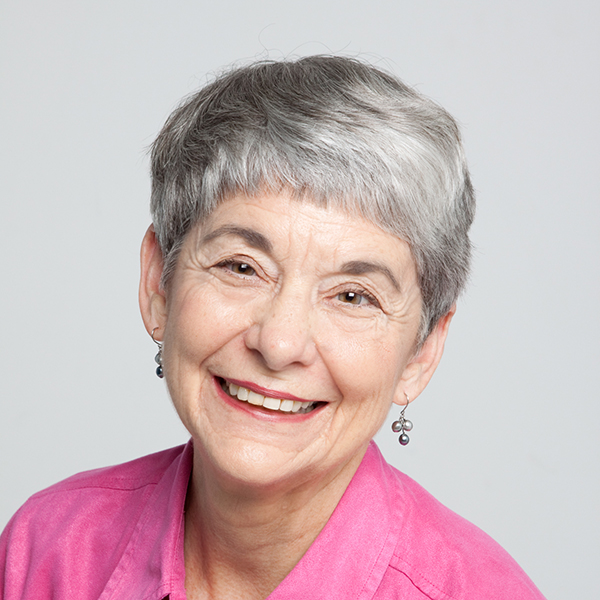 Spotlight
Spotlight
Sue McLeod
Asked to discuss her career and, more specifically, her role in the founding of RWS, Sue McLeod provided the following reflection:
I enjoyed a long career in university teaching and administration (I was a writing program administrator, and also at various times a department chair and associate dean) and am now happily retired; at a certain point it’s important to step aside and let the next generation take over.
What I find most satisfying about my career is the fact that I was involved in developing a field of study that didn’t exist when I was in graduate school in the late 1960s and 1970s. As is the case with many of my contemporaries (Peter Elbow, Chuck Bazerman, Chris Thaiss), my doctorate is in English literature. The assumption was that if you studied great literature, you were then qualified to teach students how to write. It didn’t take long for many of us to figure out that this was not true, and because it was an experimental time in academe we felt emboldened to try to improve the situation, conducting research, experimenting with student-centered teaching techniques, and sharing our learning with each other at conferences; the Conference on College Composition and Communication provided a sort of second graduate education for us first-generation writing studies scholars. That’s a rather simple explanation of what happened when writing studies began to emerge as a separate discipline, but basically true. I feel fortunate that I was able to be a part of creating this new discipline, and particularly fortunate that I was asked to chair the committee on the major for CCC, since a major indicates that a discipline has finally arrived.
The period during which writing studies was growing and blossoming was an exciting time and also a frustrating one, since as it was emerging as a discipline in its own right, it was also growing apart from literature studies. Across the country writing programs began to separate from English departments, as linguistics had done before. As the developer of a Writing Across the Curriculum program at SDSU, I was part of a core group of writing faculty in the English department, all of us women, who were doing research in this new field. It was a time when academe was still very male-dominated; women were not always taken seriously as scholars.
As both a female lecturer and a faculty wife, I could see no future for me in the English department, so in 1986 I left to take a tenure-track position elsewhere. I remained good friends with Sherry Little (who had been my office mate) and Shirley Rose, who were two of the prime movers in the creation of the new SDSU Department of Rhetoric and Writing Studies. In 1990 the three of us got together one long afternoon at the Council of Writing Program Administrators Conference in Oregon to discuss their proposal for the break with English. My role was to respond to their draft proposal, to discuss the name for this new department, and to help them strategize about how to present the final proposal to the Faculty Senate (many members of the Senate had been in my WAC [Writing Across the Curriculum] Faculty Seminars). We then went out for a celebratory drink. The Senate passed their proposal in 1993, and the rest is history.
A word on the name of the new department. At the time there were several different names for the new discipline that was developing, none of them quite right. “Composition” was a difficulty because that term belongs to the Music Department; Google it and you will see. “Writing” was also problematic, since students assumed a writing department taught creative writing, and those classes were usually retained by English departments. It was Shirley Rose who came up with “Rhetoric and Writing Studies,” which I think perfectly captures the nature of our discipline. Some new departments/programs followed suit, for example the Program in Writing and Rhetoric (PWR, pronounced — I love it — “power”) at Stanford.
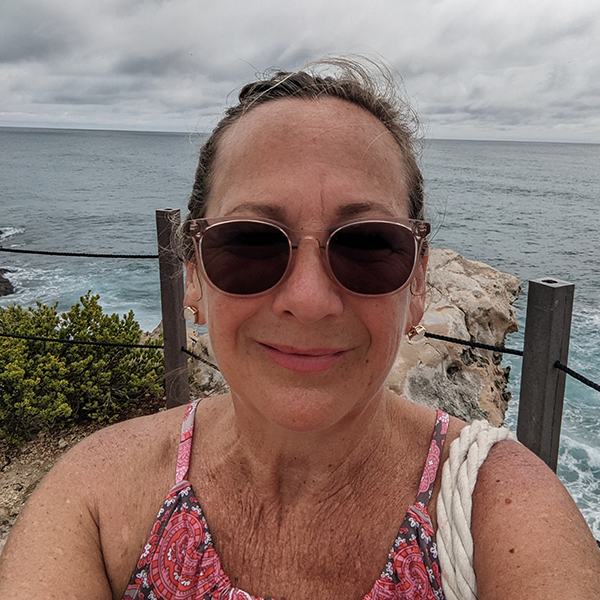 Faculty Profile
Faculty Profile
Erin Flewelling
Since joining the department as a TA in 2009, Erin Flewelling has been a very involved member of the RWS program as a lecturer, as well as an assistant director in the Writing Center. Thinking back over her time in the department, she reveals, “I have always wanted to teach and write. Grad school reminded me how much I love research. And now I have a job that allows me to do all those things. It probably sounds a little nerdy, but I always felt like I would stay in school forever if I could just get paid for it, and that's my life now.” Her passion for the program is evident, and she has truly made an incredible impact on the department over the years.
Flewelling describes how thrilling it was to come across the RWS department while looking at the M.A. programs at SDSU. Here’s how she puts it: “I didn't even know this was a thing! And it sounded so amazing, examining the way people present ideas, and there was the possibility of teaching at SDSU while a grad student” — it was the perfect fit. After joining the program, Flewelling mentions how much of an impact the program and people she encountered through it had on her. She specifically describes how the people she met within the department “taught [her] new ways to ask questions and expanded the way [she] views the world.”
When thinking back to when she was writing her thesis, Flewelling describes her experience as both rewarding and challenging: “I think I've never worked so hard on a project in my life. The research part was nothing but fun, asking questions and then just exploring random connections in order to develop cohesive claims. But organizing those claims into some cogent piece of writing that made sense to someone who wasn't me was like twisting a Rubik’s Cube.”
Flewelling goes on to describe the difficulty that comes with writing a thesis, but also the amount of support that the RWS department gave her, which ultimately provided the motivation to finish it. “I kept giving myself the same good advice that I was giving my students. Reminding myself that I should just write a bad paper, that I could revise later, that it didn't matter if it didn't make sense immediately,” she said. “Drs. McClish and Werry were incredibly helpful, asking questions that helped me figure out how to approach the various chapters. They were also very encouraging, reminding me that the ideas were there, and they mostly made sense. That encouragement kept me going.”
Flewelling also reflects on how grateful she is to have gotten to know the people within the RWS department. “Our support staff in RWS is amazing, and I love sharing reading ideas and creative ways to adapt essay prompts with colleagues,” she said. “I keep meeting really lovely students, people who want to learn, want to grow, want to be challenged. And I feel super connected to our writing center community, the directors and tutors I spend a lot of time with. We get to play around with ideas, with texts, with how to communicate, and how to convey ideas effectively.”
She goes on to describe just how much she has learned from this department and the people in it, and she mentions that there is one thing that has stuck with her the most: “I think perhaps the thing that I think about most is the construction of ethos, this idea that the way I communicate my ideas can determine whether or not people take my and my ideas seriously. And this influences the way I teach, the way I write, the way I interact with people outside of an educational environment. In particular, this was useful as I started teaching online asynchronous classes: I think about how I demonstrate shared values, concern, knowledgeability, fairness . . . and although I always want to convey my authentic self, I am mindful that different groups of people will value different aspects of myself.”
 Faculty Profile
Faculty Profile
Ben Jenkins
Ben Jenkins began his career at SDSU as the catering chef on campus just a few years before joining the RWS program. After working for Montezuma Publishing for a year, Jenkins commenced his work in the RWS program as a writing mentor. He recalls, “I did that for a couple of semesters before teaching my own RWS classes as a TA. At the time, I was pursuing my MFA degree. When I started working with various instructors, and then finally teaching my own classes, I fell in love with the discipline, and decided to pursue a teaching career with the department after graduation.”
Jenkins describes how the RWS department has been a great support system when it comes to consistently pursuing his passions. Most recently, he is very excited to be teaching a new comics course that will be offered in spring 2024.
Jenkins reflects on his time working on his MFA while simultaneously working as a TA in the department — he describes this period of his life to be incredibly impactful when it comes to both his education and his career: “I particularly loved the TA training program the RWS department offered. The community of instructors, mentors, and fellow TAs created an enlightening space to work through some of the struggles that come with teaching a class for the first time. I’m honored to now work with the TA training program, and I really enjoy working with our TAs as they develop their teaching skills.”
When it comes to critical topics such as inclusivity, Jenkins mentions how grateful he is to work at both SDSU and with the RWS program: “Being a border community, and a region filled with a vibrant Indigenous presence, I’m glad to work at a place that respects those attributes, and strives to create a more inclusive learning environment.”
Jenkins aims to place an emphasis on inclusivity within the department, and he has been able to intertwine inclusivity into his courses in a way that is incredibly admirable. “Currently I’m working with our Global Rhetorics group,” he reveals, “and with the help of that community and our work, I’m able to develop more inclusive teaching practices and varying methods of rhetorical analysis for my classes.”
Thinking back to his time as a student, Jenkins offers some thoughtful insights: “The time management part of being a student is a skill that we don’t often learn about in a dedicated class, but it’s a huge part of successfully navigating academic life. Take the time to manage your school, personal, and social schedule, and try to find a balance that works for you.” Jenkins then concludes his valuable advice by emphasizing just how important it is for students to reach out and form connections with their instructors: “I wish I’d known how open and willing all the instructors are at SDSU. I haven’t met anyone teaching at the university that hasn’t put students first. When I was a student, I was a little intimidated to approach instructors to talk about my interests and research. Now that I’m a faculty member, I try to encourage students to take advantage of the opportunities they have while studying at SDSU.”
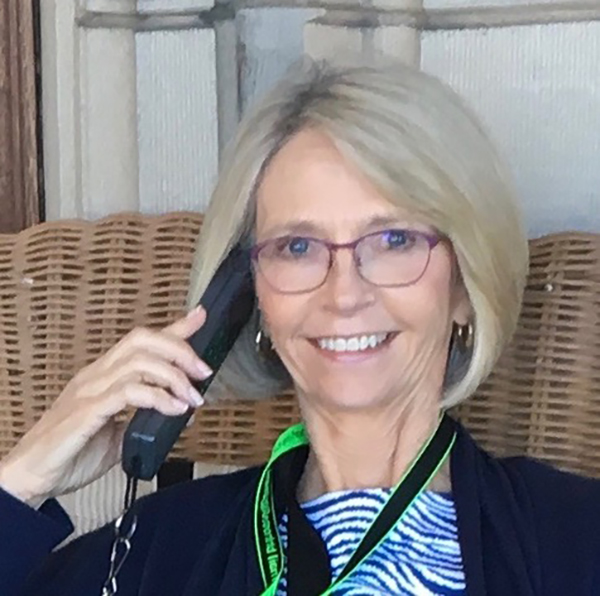 Emerita Profile
Emerita Profile
Ellen Quandahl
Ellen Quandahl is an incredibly accomplished member of the RWS community, both at SDSU and within the community of rhetoric and composition scholars as a whole — she played a major role in the development and growth of composition studies. Quandahl recalls, “I was fortunate to do my graduate work at the University of Iowa when composition studies was still coalescing as a discipline with histories, theories, and emerging topics of research. From my earliest conference experiences I watched the meetings of the Rhetoric Society of America grow from fewer than 50 people to a robust and diverse national organization. The Conference on College Composition and Communication and its journal have likewise grown, become more diverse, and provide fora on writing in social fields well beyond the academic classroom. Borderlands, religions, politics, sound, the visual, gender, the ambient, administration, dialects, industry, AI — all of these are emerging and changing areas of research.” Since her retirement, Professor Emerita Quandahl continues to keep herself very busy. “I sit on committees, manage a website, belong to several book groups, and engage in research as topics appeal to me,” she says. “I’m in touch with many rhetoric colleagues and we communicate about our interests.”
Quandahl’s contribution to the development of the RWS program at SDSU has made a big impact on making the program what it is today. “Coming to the Department of Rhetoric and Writing Studies in the second year of its existence offered the opportunity to help build a new department, and that was tremendously exciting,” she notes. “The collaborative work of envisioning a writing program with colleagues from rhetoric, linguistics, academic skills, and composition was challenging and intense. I look back with some pride on working with those people to create a writing program, and then a master’s degree, and then an undergraduate major during a time when there were fewer rhetoric departments in the country. I vividly recall representing the department at the SDSU Academic Senate on the day it approved the M.A. program. It was thrilling.”
Thinking back to her graduate work at the University of Iowa, Quandahl reflects on the many people that made an impact on her career: “My graduate school mentor, Richard Lloyd-Jones, who authored benchmark work in composition and developed the doctoral specialization in rhetoric at the University of Iowa; Kenneth Burke, the great 20th-century theorist of rhetoric whom I had the privilege of meeting several times; and, I suppose, Aristotle. Scarcely a day goes by when my reading doesn’t call to mind an idea from Kenneth Burke. Despite recent and important critiques, Aristotle’s works on emotion, happiness, virtue, and language are still anchors. During my first academic job — at UCLA writing programs — I was fortunate to work with Mike Rose, who taught us so much about the cultural competence and insights of non-traditional students, and I was greatly influenced by Mike’s friend David Bartholomae and his colleagues at the University of Pittsburgh. Their textbook ‘Ways of Reading,’ which has gone through so many editions, is still fantastic. It sounds like my influences were all men! But I had an undergraduate teacher, a woman and a feminist, who really introduced me to the whole concept of rhetoric. I don’t think I would have had a career without the work of feminist scholars like Pat Bizzell, Susan Jarratt, Lisa Ede, Cheryl Glenn, and many others.”
When discussing rhetoric, Quandahl describes her personal philosophy in the following words: “Rhetoric is everywhere! Watching how language (spoken, written, visual, musical) achieves effects and how rhetorical pedagogy embraces private and civic life are endlessly fascinating and important. Rhetoric bridges public address, poetics, psychology, politics, and a long teaching tradition. Just last week I listened to a podcast by southern California earthquake guru Lucy Jones, who has begun composing music to help people engage with climate change! She’s thinking about how it is that humans are moved, the emotional component that often engages us more deeply than information — and that is rhetoric.”
Quandahl goes on to describe one of her favorite writing projects that she has worked on, as well as her favorite courses that she has taught: “When I began studying ancient Greek, I met with a small study group of colleagues. Through various turns, we discovered and worked on the Byzantine historian Anna Komnene. It was breathtaking to see in her history comments about and evidence of a rhetorical training that was familiar from our work in ancient rhetoric. Over the years, I worked on Anna and wrote several pieces. The most recent, in Hawhee and Valiavitcharska, ‘The Practice of Rhetoric’ (University of Alabama Press, 2022), concerns history as a compositional and argumentative resource. The project encapsulates many of my interests: rhetorical theory and pedagogy, women rhetors, the persistence of the ancient rhetorical tradition.”
When asked about her favorite courses to teach, Quandahl could not pick just one. “In my early years in RWS I often taught Theory and Practice of Teaching Composition,” she says. “I enjoyed the challenging doubleness of it — watching my own practice and interaction with students even as we read about and discussed theory and practice, engaging in the kinds of pedagogy that I was encouraging students to try out.”
“The class is always intense and emotional, as everyone has strong ideas about what writing is and how to teach it, and strongly imagined ideas about what it is that students need to know. I admired the students, their intense efforts, and their writing. Many I now consider friends and colleagues. I also taught the history of rhetoric course almost every year, in a time when the narrative of rhetoric’s history was changing and the scope of ‘antiquity’ and ‘the classical’ morphed from ‘western’ to a rich crossroads of cultures. So there was always new material to learn and share, and there was the challenge of showing the ongoing relevance of ideas from a cultural past very different from our own situation. Just last week The Washington Post published an article called ‘As Black Educators, We Endorse Classical Studies,’ both acknowledging the oppressive dimensions of past practices and embracing the long conversation about what it is to be human, to communicate, to live well. What could be more engaging?”
Lastly, Quandahl shares two pieces of incredibly valuable advice for current students:
- Seek out mentors whose work intrigues you. Use writing to figure out what you think
and what you need to know. Practice trying on the methods and approaches of various
scholars. Attend conferences. If you’re interested in the history of rhetoric, don’t
be afraid to learn Greek and/or Latin — they are still relevant!
- Mentors and colleagues are profoundly important. I was a shy student, shy about asking for help and about asking how to shape a research agenda. Now I know that people in our field are generally kind folks who welcome any and all questions.
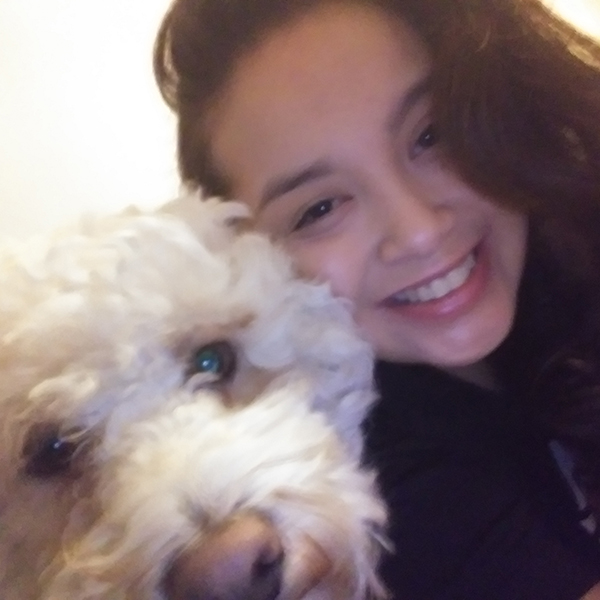 Student Profile
Student Profile
Kenya Benitez
Kenya Benitez has just completed her undergraduate degree in rhetoric and writing studies. With goals to attend graduate school and earn her master’s in public health, Benitez is thankful that the RWS department has pushed her to learn writing and critical thinking skills that will be applied in her future career as a possible public health analyst/program specialist for California’s Department of Public Health.
While her two interests — writing and healthcare — may seem to be on opposite ends of the spectrum, Benitez finds that they complement each other rather nicely.
Even though Benitez didn’t begin college with a focus on RWS, she recalls her decision to switch from nursing her sophomore year being influenced by her love for writing and how it has “been her passion since she was young.”
In addition to her underlying interests in this field, Benitez mentions how the pandemic also played a significant role in determining her next move. As a sophomore during the peak of the pandemic, Benitez was frequently worried that attending nursing clinicals would put her health at risk. Though she had a hard time giving it up, she remembers thinking to herself during her final decision to switch majors, “I am trading one passion for another.” After taking a leap of faith, hoping that the major would “improve and provide [her] with the skills to formulate better arguments,” Benitez can confidently say that she feels prepared and has learned to do just that.
She specifically thanks the program for teaching her how to “analyze a rhetorical situation” — a skill Benitez thought was only implied in writing spaces, but has come to learn that it is recognizable everywhere. Her now trained eye has not only learned how to observe this in everyday life, but also how to use it to her advantage in situations like job interviews. Benitez directly thanks Dr. Salas for fostering her ability to continue perfecting her research skills, as well as allowing her to be creative and pick her own subject to do a research paper on. When Benitez wrote about her chosen topic of “The Rhetoric of Tattoos,” she mentions that she was able to “apply the skills and knowledge that [she] learned in previous RWS courses.”
If Benitez could go back in time and tell her freshman-year self what to expect when joining the RWS program, she wishes that she knew about all of the opportunities the major entails. From the RWS 506 internship course, employment options at the writing center, as well as being able to become an RWS writing mentor, she would encourage any undeclared freshman to look into the program and consider majoring in it. Benitez’s final thoughts on RWS are concluded positively by the following statement: “The material one learns in RWS classes can be both practical and philosophical. Rhetoric pushes students to explore perspectives that they may have not otherwise considered. Yes, RWS students learn to be better writers, but also better critical thinkers and analysts.”
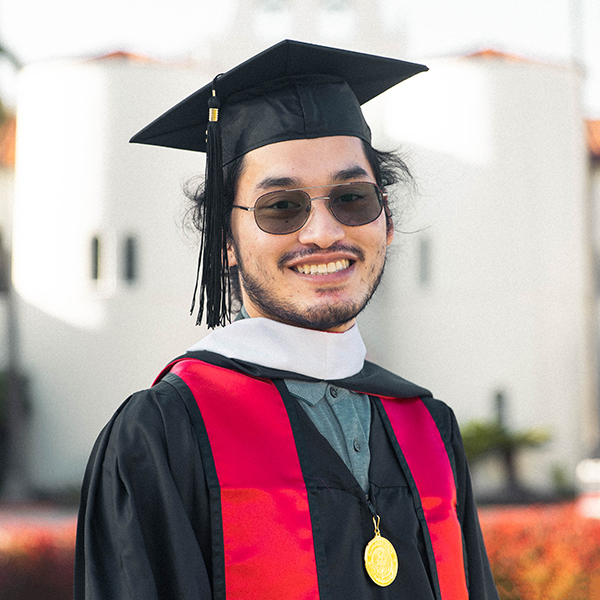 Student Profile
Student Profile
Matt Louie
As an SDSU master’s student who has just gone through graduation, Matt Louie is grateful for his discovery of the RWS program. After earning his bachelor’s degree in psychology and sociology, Louie found “the only California State University (CSU) with a dedicated rhetoric/composition department” and mentioned that because the program’s focus wasn’t solely on English literature, he was able to “get training and take classes on topics that relate to [his] ultimate career goals in rhet/comp.” It was actually because of a fellow writing consultant at the writing center that Louie was able to find out more about RWS.
Despite having a different major prior to entering the master’s program, Louie feels as though he wasn’t any less prepared to study in the field of writing and that the master’s program has allowed him to progress in his area of study. Louie recalls that his work in psychology was “focused around language and stigmatization (which was essentially [him] talking about how rhetoric and language constructs the ways in which we understand others.)” Not only has this helped him learn about those around him, but it also helped him go about learning how to teach writing.
Louie’s favorite course at SDSU thus far is one that has “played the largest role in [his] studies and beyond.” RWS 596: Decolonial Rhetorics, with Consuelo Salas, helped Louie “bridge some of the conversations [he] had outside of the university (regarding decolonization on [his] home island of Guam) to academia.” Louie is thankful that he got to experience how rhetoric is theorized and discussed with regard to decolonization, in addition to being able to contribute to the conversation with matters from his personal life and as a Chamorro (the Indigenous people of Guam). He adds that the seminar paper he wrote for this class was “one of my favorite papers that I have written.”
Building on his cultural history, Louie attended the Conference on College Composition and Communication on February 17, 2023, to speak about his research relating to incorporating food into the classroom environment; he hopes to show students that “the knowledge they have from their home (or cultures) — like food — is something that can be utilized to understand and participate in conversations in academia.” Louie hopes to tie together food and rhetoric to showcase discussions in topics like translanguaging — utilizing a person’s multiple dialects and creating a way to view them as “fluid and interconnected” — and also showing that “elements of culture — like food and language — don’t exist in a singular/standard way but, rather, can take multiple forms or styles to fit the needs of different people.”
Louie is incredibly grateful for both the structure and freedom that the RWS master’s program has given him. He has enjoyed his time here so much that he is planning on pursuing a Ph.D. in rhetoric and composition. He will be attending University of Wisconsin-Madison in the fall and is confident that his M.A. in RWS from SDSU “will serve as the foundation for [his] future coursework, teaching, and scholarship within the field of rhetoric and composition.”
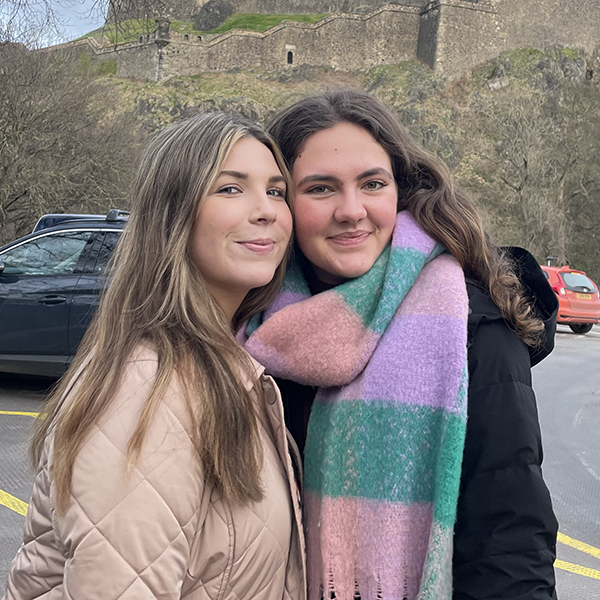 RWS Newsletter Editors Abroad
RWS Newsletter Editors Abroad
Celia Fisher and Noelle Higgins
This past semester, we (Celia Fisher and Noelle Higgins) have been fortunate enough to spend the first half of 2023 studying abroad as RWS majors — Celia, at the University of Strathclyde in Scotland and Noelle, at the University of Kent in England.
We were both so fearful yet equally thrilled by what the future could hold for us as we departed from our parents at our hometown airports. Waving goodbye to friends and family and starting our new ways of life across the world was just the start of our adventure — the first being adjusting to the weather, considering that we both grew up in Southern California. Nonetheless, little did we know that once we stepped off the plane in our new (soon to be favorite) cities, we would experience a chapter in our lives that is indescribable.
Though I (Celia) knew that adjusting to a different culture would be somewhat shocking, I figured that being in a country that spoke English would be relatively simple. Little did I know that the Glaswegian accent is one of the most difficult ones to understand; even as I write this at the end of my term, I’m still never positive I can understand their phrases on my first try. Nonetheless, the charming people really do make Glasgow, and I wouldn’t have it any other way.
At my host university, I was able to enroll in several courses that would allow me to further my understanding of rhetoric. My favorite class was a third-year course titled “Gender and Celebrity Culture.” In both a small and large lecture, we met twice a week to discuss the ways that gender plays a significant role in the media and how certain language enforced by society can carry both negative and positive connotations depending on the target audience. We looked at a variety of examples of celebrity behavior and learned that oftentimes a man will receive less backlash than a woman in the same position; the rhetoric associated with him is light-hearted and forgiving, whereas the rhetoric characterizing the woman is shameful and manipulative. Examining the different sides to this only reminded me that written, spoken, and visual language will always be able to consciously and subconsciously persuade any given audience. It is a true skill and is something that will always interest me about RWS.
Outside of class, I met other exchange students in the same position, and we took on everything that came with moving to a new country together. While I learned how to do so many things abroad like figure out the public transit, the Scottish grading system, currency conversion, and memorizing my UK phone number, the one thing I never understood, despite my trying, was the Scottish love for beans on toast and why there needs to be mayonnaise on everything. Though I like to think of myself as open minded, I have yet to find a reason that makes sense for this.
But in all seriousness, studying abroad in Scotland has been the best experience of my life. Though leaving home was hard and not seeing my family for quite some time was an adjustment, gaining this much independence is something that I will be forever grateful for. I was able to explore all of Scotland and see so many parts of their beautiful country. From the Highlands, to the Isle of Skye, to the Harry Potter Bridge, the only flaw I can find is the gloomy weather, and yet I was still able to appreciate that too. In my spare time, I discovered cheap flights via the infamous RyanAir, did a two-and-a-half-week backpacking trip through Europe, met people from all over the world, and found myself trying to savor the moments I knew would soon be fleeting.
Just like Celia, in January of 2023, I (Noelle) packed up all of my belongings and moved to the United Kingdom for four months. I was going to be attending the University of Kent in the small town of Canterbury, England. Studying abroad had always been a dream of mine, so landing at the London Heathrow airport was one of the most exciting moments of my life. I felt as if I was constantly learning fundamental life lessons while I was abroad — I was able to gain so much confidence and independence which has helped me in so many ways already. Over the past few months, I am so fortunate to have been able to have gotten to see so many beautiful and historic cities in the UK and Europe, while also meeting so many incredible people along the way. I even got to meet up with Celia in one of my now favorite cities, Edinburgh, Scotland!
Throughout my time studying at the University of Kent, I found myself constantly finding new ways to deepen my knowledge of and understanding of rhetoric. Specifically, one of my favorite courses was Reading Victorian Literature, which focused on a different novel, poem, or short story from the Victorian Era each week. With both a lecture and seminar on each text, I was able to develop a deep understanding of the forms of rhetoric that the Victorians interacted with. It was through this course that I found myself analyzing the many ways in which rhetoric has been used in the past, as well as how these forms of rhetoric still impact us today. I loved looking at rhetoric through a historical lens like this — I found myself constantly coming back to this idea that rhetoric is used to construct identity (which I found to be incredibly prevalent in novels we read such as “Middlemarch” and “Oliver Twist”). This course just continued to further my passion for RWS, and I greatly enjoyed discussing the many different perspectives my peers and lecturers had on the different forms of rhetoric we analyzed throughout my term.
This was the first time I had ever left the United States, and I remember being incredibly apprehensive to go completely alone. Little did I know that that would be the best decision of my life. Canterbury is such a charming city, and naturally I fell in love with it immediately. It was the perfect home away from home for me, and it was in such close proximity to the bustling city of London. For me, traveling to different cities and countries was a goal, but it was also incredibly important to me that I immerse myself into the city I was studying in.
It was such an indescribable and fulfilling experience to build a life in a completely new country. Whether it was through befriending other study abroad students from all across the world, getting to know the locals (people like my flatmates, service workers, and classmates), or simply picking up some of the British dialect, I never expected to feel as connected to the city and people I met as much as I did. I am so thankful to both SDSU and the RWS program for giving me the opportunity to have an experience of a lifetime and memories that I will cherish forever.
As we reflect on our time abroad, we are both so grateful that our involvement in the RWS department allowed us to have these unforgettable experiences. Rhetoric is truly everywhere, and it was such a blessing to be able to interact with and interpret the many different forms of rhetoric that we came across in our travels.
Fall 2022
The SDSU Rhetoric & Writing Studies Department Newsletter
 Chair's Note
Chair's Note
As I peruse this issue of the RWS Newsletter, I am grateful for the many RWS students
and colleagues who have studied, taught, and pursued research in this department during
my decades here, from Professor Ann Johns, the first person I met when I interviewed for my job at SDSU, to Professors Linn Bekins and Cali Linfor, who entered the faculty the same year I began, to students such as Emma Bardin, Jenny Varichio, and Missy Watson, who earned master’s degrees with us before going on to do great work in a variety
of fields, to recent graduates such as John Berry, who earned his bachelor’s degree in May 2022 and has just launched his post-baccalaureate
career. And I’m proud of former students who, like René De los Santos, are now my teaching colleagues within the department. These specific rhetoricians,
all featured in this issue, demonstrate the rich array of perspectives, passions,
talents, and commitments that distinguish this department.
Happy reading!
Glen McClish
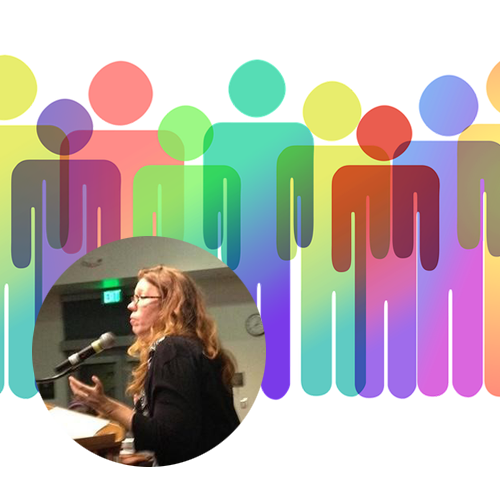 Diversity, Equity, and Inclusion
Diversity, Equity, and Inclusion
Cali Linfor
Cali Linfor started her career at San Diego State University by obtaining her MFA in poetry. “I am a poet by training and poets are, by nature, rhetorically interested in knowledge creation, how communication works, et cetera.” As a result, she found herself to be incredibly interested in rhetoric, and more specifically how rhetoric pertains to educational equity work. Early on in her career, Linfor got involved in community outreach work regarding local high schools. Her goal was to “allow students a smoother transition between their high schools and their future colleges or jobs,” which helped to inspire her work with educational equity.
“My field of interests really looked at structural inequities, especially how they manifested through literacy and also then developing an expertise in how to teach teachers to teach rhetoric. My role in the department has been a position of community liaison in a lot of ways — intersegmental partnering in terms of issues of rhetoric and teaching in pedagogy.”
Linfor describes how deeply she is interested in equity and making the RWS department more equitable. As a co-founder of the Anti-Racism, Equity, and Inclusion Working Group, Linfor expresses that she sits on the RWS Diversity Committee and works to implement the department’s diversity plan. Linfor explains that she wrote a global rhetorics grant with her colleagues Karen Koss and Consuelo Salas, who are working to “shift the fundamental ideas of what we teach away from Eurocentric and Greek rhetorics into a global perspective of rhetorical concepts.”
Linfor explains how the department’s Anti-Racism, Equity, and Inclusion Working Group began as a movement within the department when several members of the department decided that they “wanted a space to reckon with the policies and look at the department and [their] experiences through the lens of what it would mean to be anti-racist, equitable, and inclusive.” And that is exactly what they did. Linfor mentions how the field of rhetoric stems from a “normative understanding of the world, and since rhetoric is about communicative acts, it’s given power to those normatives and there’s a reckoning around that. At the same time, rhetoric is the key to opening [equity] up. And we can do so by honoring the communicative acts of our own communities.”
When it comes to the term “diversity,” Linfor expresses how it “really means to create a culture and change basic policies and paradigms to where all different ways of existence are valued as resources.” In fact, she expressed a dislike for the term in general. “Diversity tends to have to do with numbers, right? Meaning that one measure of a department’s diversity is the ability to quantify a range of membership in that department. Whether that’s from gender lines, or ability lines, or ethnic lines, or schools of thoughts lines, or class status lines. Those things as quantifiable measures are important, but I’m more interested in issues of equity.”
At present, Linfor is working on revising a book she wrote titled “I Animal.” The book aims to look at “what happens when we cut ourselves off from identifying as human animals. It’s an interesting book rhetorically because a lot of times poetry is seen as very inaccessible. If you’re reading electronically and you take the cursor, you can scroll over the words and it will connect to allusions I’m making.” Along with this project, as a professor of equity at SDSU, Linfor is especially interested in creating safe spaces, “celebrating the rhetorical traditions of people, and concentrating on futurity — what we call the elsewhere and the otherwise.”
Linfor shared some incredibly valuable and impactful advice for current students. “I think that staying intellectually curious, having specialized interests (in equity or whatever it is), and a passion about that is really important,” she says. “It’s also important to embrace the diversity of our field in terms of how we get here, and be joyous for however you arrived here, whether that's as a journalist or a technical writer. Because each one of those fields has enormous things to add to our discipline. Just like me as a poet. Everyone has room in this department.”
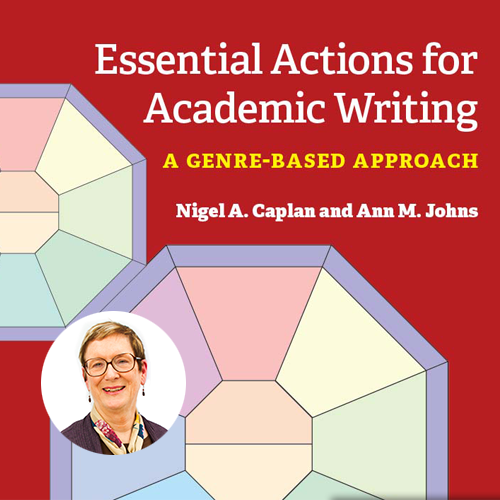 Spotlight
Spotlight
Ann Johns
Professor Emerita Ann Johns is a renowned scholar in the field of applied linguistics. She began as a history major at Carleton College and has an M.A. in the teaching of history from the University of Chicago. Following her graduation, she experienced a once-in-a-lifetime opportunity when she moved with her family to Egypt, where she not only taught English and history, but also devoted herself to completing another M.A. in the teaching of English at the American University in Cairo. Johns spent time at yet another university, USC, where she was able to complete her Ph.D. and write her dissertation, titled “Cohesion in Written English.” Her early career life really took off when she moved to San Diego with her husband and founded the American Language Institute, enrolling roughly 1,000 students at the time along with 80 instructors and administrators. Clearly accomplished in her field, Johns places emphasis on “taking every opportunity you can to learn.”
One could argue that Johns is self-taught, as she talks about never having taken a teaching of writing course; which makes her accomplishments all the more impressive. She gives credit to “some of the great names in second language writing: John Swales, Ken Hyland, Vijay Bhatia, Chris Feak, and Chris Tardy” for mentoring her and allowing her to read their brilliant work, some of which inspired her to complete research with students from her classroom as participants. This prompted one of her questions in her best-known paper in Written Composition that deals with how “a Vietnamese-speaking SDSU student continued to fail our timed essay-writing exams but made ‘A’ grades on his short-answer tests in biology,” which led Johns to ask, “How could that be? Perhaps we should reconsider what we are teaching in academic writing classes.”
As an avid traveler with a goal of writing curricula for composition classes, Johns acknowledges how different academic writing is in different parts of the world, which is why during her Fulbrights in Lebanon and South Africa she specifically made a point to “develop courses for local college students.” In China, she worked with a “fine rhetorician, Rick Coe, in programs for experienced language teachers.”
Throughout her life, Johns has placed an emphasis on the value of being able to write and teach curricula. After some time, she decided to shift her main focus from strictly research to teaching. After being “promoted to full professor” and then retiring, Johns states that she is “free to write what [she] believe[s] is much more useful to teachers: a textbook based on genre theory.” She was incredibly passionate about writing this textbook, and when a colleague from the University of Delaware, Nigel Caplan, approached her with an idea to collaborate on the book, Johns was thrilled. “We worked together for more than five years on this book, agreeing on most points but disagreeing on others, writing, revising, and writing again, until we came up with the publishable volume, ‘Essential Actions for Academic Writing: A Genre-Based Approach’ (University of Michigan Press, 2021).” Johns mentions how much she learned from co-writing this text and credits Nigel Caplan as the “first author.” She has worked on and written three different volumes for Michigan.
Out of her numerous rhetorical accomplishments, Johns discusses that some of the most interesting projects that she has worked on took place in South Africa and Lebanon while she was a Fulbright scholar. While she was there, Johns was fortunate to be able to work “closely with local faculty and administrators and their students to produce academic English curricula that were appropriate for the context in which [they] were working.” She worked diligently on this project, as it “involved interviews with various stakeholders, analyses of student writing and university textbooks, testing materials, and LOTS of meetings,” while also making wonderful friendships along the way.
Johns offers some incredibly relevant advice for current students who are looking to further their education in the field of rhetoric and writing. She emphasizes the following:
- Take every opportunity to learn that you can. For example, your instructors are experts — ask them questions. Your fellow students have interesting lives. How can you work with them to gain knowledge and become better teachers and researchers? Become involved. Create communities.
- Despite its dangers (and they were present, even when we traveled), see the world. And, more importantly, live and work in different parts of this shrinking globe. Apply for a Fulbright, for example.
- Enjoy! My family and I (husband and three kids) had a wonderful time traveling, meeting people, expanding our horizons, studying the local languages, etc.
- And analyze texts from the genres in your worlds. It's fun.
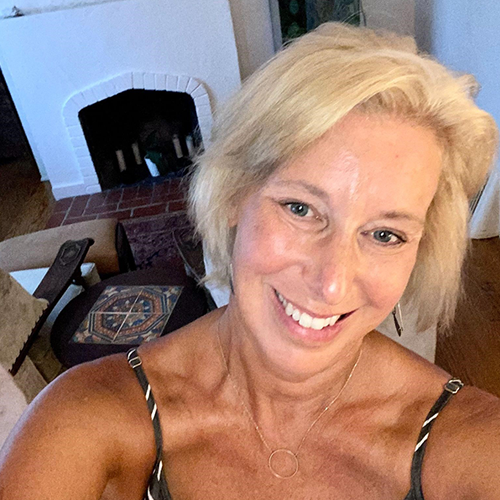 Faculty Profile
Faculty Profile
Linn Bekins
Linn Bekins is a professor in the RWS department who has been at SDSU for 23 years. She is described by her students as “caring” and “approachable” and values her teaching style that is focused around her constant care for her students’ well being. She credits her student-centered pedagogy to two “wonderful mentors” at the University of Utah, Tom Huckin and Marueen Mathison, who also emphasized the importance of empirical research.
Coming from a non-academic family background, Bekins is a self-made learner who took opportunities into her own hands when building her academic career. Her love of learning, inquiring minds, change, and challenge were all factors in her decision to work with adult learners. Her core values are centered around analytical thinking, unquenchable curiosity, and highly interactive academia, which is why the courses she enjoys teaching the most are RWS 508W and 607: Scientific Writing and Writing Project Management, respectively.
Teaching these courses has allowed Bekins to engage with students of all interests. She values the interaction with the science-focused students, how to tie in rhetorical emphasis, as well as how to bring in a linguistic approach. She values the diversity in the course and how science and writing are combined flawlessly in an environment that encourages students not to limit themselves. As for RWS 607, Bekins’ primary role is to engage with students in the transition between academia to the professional world. She brings in speakers, as well as alumni who offer their insights on the world of writing which also contributes to her appreciation for the varied nature of the two topics.
If Bekins could go back in time, she would tell her younger self and those like her to “be surrounded by people that challenge you, be proactive in sharing, expanding, and co-creating knowledge, and learn how to apply what you are learning in the classroom to the world outside academia: you are learning the tools to enact the change you’d like to see in the world.” Bekins will follow her own advice as she continues to teach at SDSU while taking on new consulting experiences. She has recently been working with an international user/experience design group that works on the topic of gendered financial literacy in the workplace. Balancing her work life with her family/social life, Bekins is looking forward to spending time with her three sons, cooking her favorite Spanish tapas, and training for long distance stand up paddle board competitions.
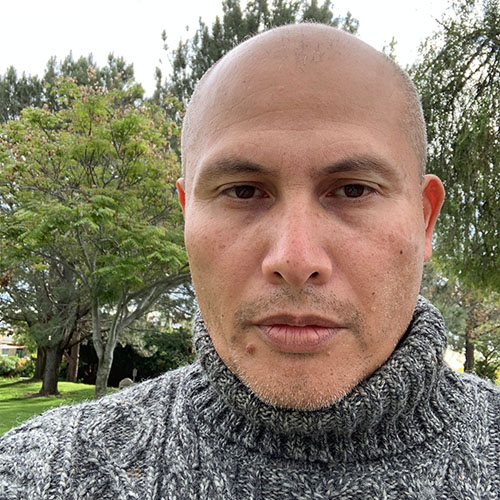 Faculty Profile
Faculty Profile
René De los Santos
René De los Santos has spent much of his time at San Diego State University as a student and most recently, as a lecturer. He mentions that originally as an English student, he “stumbled into rhetoric” through a Rhetoric of Science course that he found to be “really different from what [he] had ever seen before — the questions that were being asked and the topics that were being addressed were just really mind-blowing for [him].” After taking this course, De los Santos found much inspiration to research rhetoric further through his master’s thesis which was the “Rhetoric of Standard Time” and for his Ph.D. studies.
De los Santos passionately describes his experience of writing his thesis, mentioning how he enjoyed how “it was this exploration and delve into history. People who have long ago died and yet, here they are right in front of you. They are speaking to you, they are speaking to somebody at the moment, and they are making cases for time.”
Through his research of the rhetoric of standard time from the 19th Century, De los Santos learned about the different cases and systems that were being made for standardized time. “I really wanted to understand the questions–how did we get there and how did we come to adopt these time systems that we now take for granted. It was fun for me because…I never really thought about the confluence of rhetoric and technology and science.” He mentions that the SDSU library publishes student’s theses and his thesis can be found in the bookstacks there.
During his time as a student, De los Santos found studying rhetoric to be incredibly beneficial and educational. “I think it's really the idea of being exposed to things that I had never really been exposed to before, especially the idea of rhetoric and how it functions and the dynamic aspects of it. We take a lot of things for granted and we don’t really think about it. What was really eye-opening for me was the idea that language and how we use images… can be a very powerful force in our society.” From his time as both a student and as a teacher, De los Santos was fortunate to have been able to establish his passions and incorporate them into his studies and courses. He mentions how he has loved being able to include his passion for history into rhetoric courses that he has taught and projects that he has worked on. De los Santos discussed how he incorporated both of these passions within his doctoral dissertation that he wrote about the Mexican ministry of finance, which covered “their rhetoric in the aftermath of the Mexican Revolution.”
In terms of his more current research since obtaining his Ph.D., De los Santos has had many exciting projects and continues to have even more in store. He mentions the importance of Latin American rhetorics throughout his career and how he has spent much time bringing awareness to it. During one of the Rhetoric Society of America conferences a few years ago, he states that he was “able to get the first panel ever dedicated to Latin American rhetorics,” which is an incredibly huge accomplishment within the field. He has also spent time furthering a previous project on the “Dreamer” population returning to schools in Mexico. “The whole point of the project was to try to use data that we were getting about their educational needs and experiences to try to reevaluate the curriculum that the university has there.” With that previous project in mind, De los Santos is furthering his work by researching how the “dynamics of education is changing because of this influx of new immigrants” and how rhetoric plays a role in that. He and his colleagues are working toward creating a “broader… binational understanding of how education works.”
Reflecting on his time as a student, De los Santos expresses incredibly beneficial advice to current students. “It’s important to really understand the discipline that you are in, but also be open to what other disciplines offer you — what other lenses you can use to approach a certain topic” He explains how valuable it is to explore different worldviews and perspectives, because it holds us accountable and “keeps us honest.” De los Santos adds that with the perspective of both a student and a teacher, RWS at San Diego State University is an admirable program and especially notes the excellence of Glen McClish. “You can compare it to other programs, and I have, and I think Dr. McClish has done an excellent job… really creating a program that I believe has” been able to get “students prepared for whatever future that they desire to pursue.”
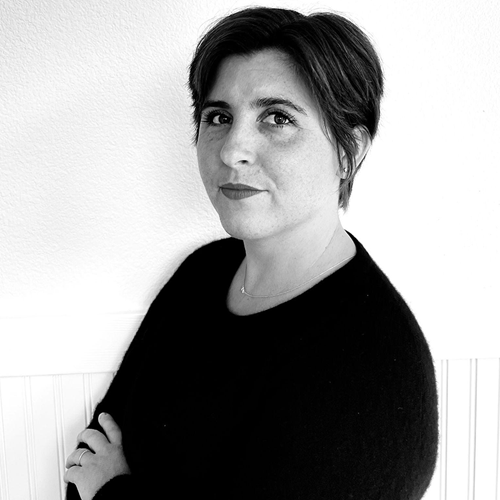 Alumni Profile
Alumni Profile
Emma Bardin
Emma Bardin is a science writing consultant who graduated from San Diego State University with her master's specializing in the teaching of writing in 2013. During her years at SDSU, Bardin was able to teach three semesters of RWS 100 and 200, which she recalls as the most iconic moment for her as she walked into Hepner Hall to teach her first class. Bardin describes how much getting her M.A. meant to her and how every opportunity has shaped her into being able to craft her career into what it is today. “My M.A. is why I have received every job since graduation, and it's why I was able to found my science writing business, Bardin Consulting,” states Emma. “Be open to new opportunities of how your M.A. can impact your professional trajectory. First I was a college professor. Next an English teacher for grades 9-12. Then I was a college counselor. And now I write all things science for biotech companies. The common thread: a rhetorician who can tailor content to a given audience and goal.”
One of the beautiful things about learning how to write professionally is being able to tailor the style of writing to the type of career you want. Bardin seems to have mastered this skill since switching trajectories in her path in life several times since graduating as she now writes “everything science.” From website copy to case studies, leadership bios, awards submissions, thought leadership articles, blogs, conference materials, press releases, and scripts for crowdfunding videos, Bardin has used her skills from the RWS department to leverage her rhetorical training to craft content for a variety of audiences.
Bardin recalls the most interesting project she worked on thus far was drafting a case study for the biotech company Metabolon. She was able to dig deep into scientific articles and find peer-reviewed journals in order to craft multiple case studies. However, because she was left on her own to do the research without much communication from a scientist to ask questions, she “had to leverage [her] rhetorical training to comb the article for key takeaways and then employ the domain-specific vocabulary (most of which [she] had not studied previously) to craft a case study for an audience of researchers.” Because of her foundations in rhetoric at SDSU and her ability to dissect the rhetorical situation, she was able to make what would normally be unfamiliar information to the public eye both comprehensive and compelling. She joyfully mentioned that “it’s projects like this where I get to be a full-fledged rhetorician that I enjoy most.”
From teaching, to college counseling, to scientific writing, Emma leaves us with the reminder that when looking at life through the lens of a rhetorician, it is important to remember that everyone perceives things differently. No matter what profession she is in, Bardin remembers to always reflect on a few key strategies when it comes to analyzing her next work: “take inventory of the rhetorical situation and draft content accordingly. Who is the audience, and what do they care about, what matters to them? What is the desired ethos of the author? And then draft the argument accordingly. So often writing falls short because we write for ourselves instead of the actual audience.”
Learn more at bardin-consulting.com.
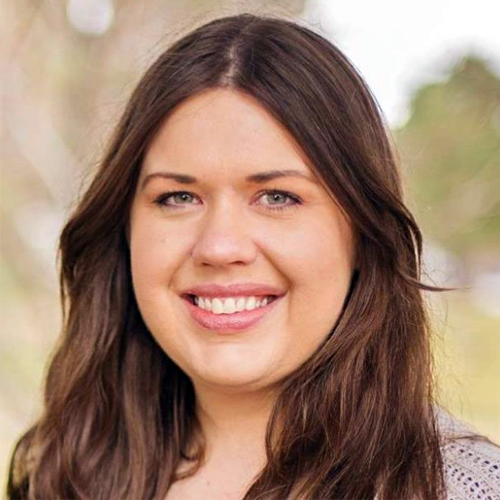 Alumni Profile
Alumni Profile
Missy Watson
As an undergraduate comparative literature major at SDSU, Melissa (Missy) Watson did not expect to fall in love with the field of rhetoric and writing studies the way that she did. After taking Professor Suzanne Bordelon’s Introduction to Composition Course, Missy was inspired to pursue her M.A. in rhetoric and writing studies. “Professor Bordelon’s curriculum had me sold, and her rigorous yet utterly supportive and thoughtful approach to teaching compelled me to want to study and perfect my own craft as a teacher. She told me about the M.A. in RWS and encouraged me to apply.” Watson quickly found her passion in RWS and credits the program and faculty with shaping her to be the “teacher, administrator, and researcher” that she is today.
“I recall fondly learning about and applying rhetorical analysis to research articles in Professor Glen McClish’s Reading & Writing Rhetorically course; contemplating “truth” in Professor Ellen Quandahl’s History of Rhetoric course; challenging notions of “otherness” and “right/wrong” binaries in Professor Richard Boyd’s Modern Rhetoric and Composition Studies course; and learning about and evaluating research methods in Professor Ornatowski’s Research Methods in Rhetoric and Writing Studies course. These courses were all so welcoming, meaningful, and intellectually stimulating to me. And I still have all my papers that I wrote for each of these classes!”
Watson mentions how incredibly thankful she is to have been able to work with Professor Ann Johns. “What an honor it was to work with such an influential scholar in the field of Second Language Writing. Professor Johns helped me to design and implement several case studies of multilingual scholars, to make connections with potential candidates to interview, and to complete a thesis I was proud of. I ended up presenting my findings at my first major academic conference and later publishing a version of the thesis as my first solo-authored publication.”
Watson also reminisces about her time studying and tutoring under Professor Michael Underwood. “This position allowed me to immerse myself in my studies, craft, and academic community at SDSU in ways I had never experienced. Indeed, as an undergraduate at SDSU, I struggled to build community and feel a sense of belonging being a transfer student new to the area and college. But because of Professor Underwood’s welcoming and collegial approach, I quickly made connections with him, with peers, and with undergraduate students.” Watson’s passion for both composition and research is evident throughout all of her educational and professional endeavors, especially when it comes to teaching.
“I can still recall vividly the very first day I taught composition at SDSU. The spring of 2008. The class was across the bridge over College Avenue, in what’s now called College Square. I opened the classroom door with my left hand, my heart pounding, as I was presented with what seemed at the time to be a sea of seated students. I saw only the back of their heads as I squeezed through a tight aisle toward the front of the class, my brand new fancy briefcase in my right hand. As I made my way and faced my students for the first time, I felt absolutely horrified that they’d know that instant that I had never done this before and didn’t quite know what the hell I was doing. This spring it’ll be 15 years since that first semester, and I can still remember some of their faces.”
Watson describes how the lessons she learned while in the RWS program have shaped her into the teacher and researcher that she is today. She mentions that while in the M.A. program, she learned “an invaluable lesson about embracing and facing your academic fears.” As a student, Watson found herself turning down teaching and tutoring opportunities — she would ignore calls looking for “tutors in the ESL composition sections” simply because she did not think it was for her. After pausing to reflect and think about why exactly she was turning down these opportunities, she realized it was because she was scared. Instead of shying away from it, she embraced her fears and volunteered to teach two ESL writing sections, ultimately falling in love with the field. “This moment of fearing unfamiliar territory, leaning into and exploring that feeling, and then facing it head on proved to be one of the most pivotal moments of my academic career.” Looking back on that period of time in her life where she was filled with both curiosity and uncertainty, Watson shares three pieces of advice:
- Rest assured that this program will prepare you well for your professional goals! I have heard over the years just how often students in M.A. programs gain exposure to a field’s content but not experience with its practices. The RWS M.A. program provides both and really sets graduates up to succeed in their professions.
- To all RWS students, not just those pursuing the teaching of writing specialization, I would recommend taking the RWS 796A: Teaching Internship course and, if possible, teaching a composition course or two. I get that teaching is not for everyone, but I also believe many professional writers would enjoy this gig. It’s so engaging and rewarding! I was the only student in my cohort to specialize in the teaching of writing, and I would have so enjoyed having more colleagues in RWS join me and help provide some mentorship to other graduate teachers coming from English.
- Consider getting a TESOL Certificate! I pursued this certificate and used the courses as my electives. It looks great on your resume, but more so, I’ve found the expertise I gained to have been incredibly useful to me as an instructor given that most students I work with are linguistically diverse.
Since completing her Ph.D. in composition and cultural rhetoric at Syracuse University, Watson has incorporated writing through her research and teaching in many ways. She is currently a tenured associate professor of English at the City College of New York, as well as a teacher of composition, and has many academic publications with “more than 15 articles in print and one edited collection, ‘Literacy and Learning in Times of Crisis.’” Watson expresses that she enjoys working with colleagues on publications — one example being an article explaining personal experiences from teachers who are pursuing “raciolinguistic justice.”
Currently, she is working on a “student handbook titled ‘Not Your Mom’s Handbook on Your Language and Writing,’ an edited collection on social justice approaches to addressing language in teaching college composition, and a book chapter on the connections between basic writing and translingual writing.”
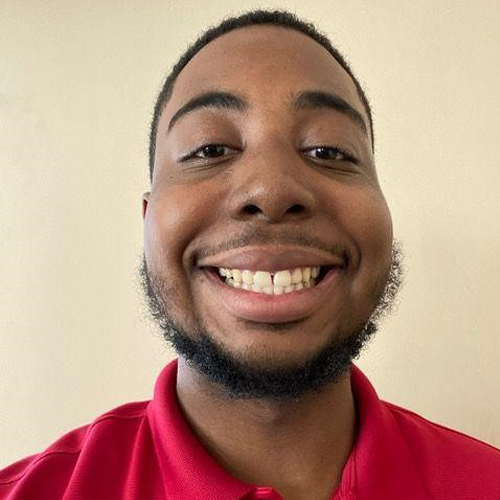 Alumni Profile
Alumni Profile
John Berry Jr
As a recent SDSU graduate, John Berry Jr. has earned his bachelor’s degree in rhetoric and writing studies and is now pursuing a career in local and state government. He mentions that he wants to utilize the skill sets he learned in the RWS program and put them toward being able to “assist in the implementation and roll out of government programs and policies that will help my community. I hope to use my degree to create effective terminology and channels of communication between the government and its citizens.”
Thanks to the program he describes as “the only one of its type in the Cal State system,” Berry found that he was able to use this degree to pursue a number of job opportunities. From his growing interests in film and visual media, to campaign managing and political strategizing, Berry felt that rhetoric could prepare him for these careers, which require direct, precise, and intentional persuasion.
He recalls how “the term rhetoric also piqued [his] interest because at one point [he] only thought of it within the political realm and as a negative connotation”; however, “after reading the course list, [he] became drawn to the flexibility of the courses, from digital rhetoric to professional writing and editing.”
When asked about his favorite RWS course over the duration of his time at SDSU, he jokingly replied, “I can’t pick, that’s like picking a favorite kid!” Nonetheless, he made a point to mention how grateful he was for the smaller class sizes that created “riveting group discussions that [he] found very enlightening.” In addition to how useful he found the class structures to be, he reflects on the most useful skills he picked up from his professors — one being how he learned how to “separate [himself] from [his] writing,” and how “shifting perspectives helped [him] recontextualilze [his] own writing and refine [his] work.”
Berry’s advice to anyone looking to join the program is to not feel intimidated by the unfamiliar name: “the most exciting thing about the program is how approachable it is. I’ve never felt scared to reach out to a professor for help and from the start they were always helpful.” He adds that, “even if it’s not a major for you, the classes you take could help you figure out what you really want to pursue. Learning about Plato and Pepsi could make you realize you want to go into philosophy or business marketing.”
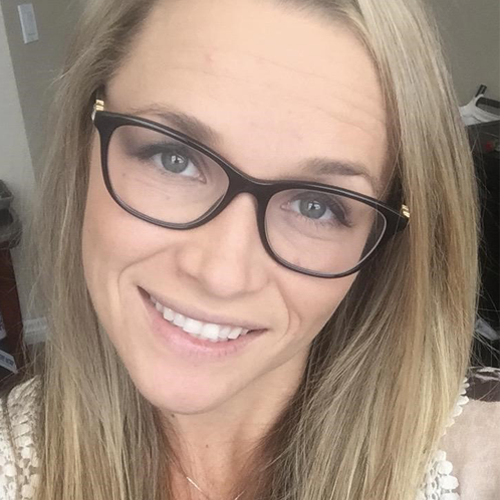 Alumni Profile
Alumni Profile
Jenny Varrichio
As a current senior instructional design consultant at UnitedHealthCare, Jenny Varrichio reflects on her time as a student in SDSU’s master’s program and is grateful that her degree has aided so much in her current field of work. Varrichio recalls stumbling upon the RWS curriculum and mentions that “it was exactly what I was hoping to find.” In terms of how the program helped her professionally, she specifically acknowledges how she learned to “write and communicate in a way that can be impactful and concise. I was able to apply my writing skills when I went back for my doctorate as well.” After graduating from SDSU in 2011, Varrichio did her doctoral work at Capella University.
Varrichio explains that throughout her time in the RWS master’s program, her perception of writing was constantly changing. Thanks to one of Glen McClish’s classes, she was able to learn about different approaches to writing. After an activity that included reading a piece by Daniel Chandler, she describes how “the article introduced different perspectives that individuals might have when approaching a writing project. Some tended to approach writing like a bricklayer. Others could approach writing like an oil painter. The characteristics did not bind one person to a specific strategy, but explored different perspectives and approaches that may be taken. It was a great read not only to use for self-reflection, but also to open my mind and learn more about how others may perceive and address something simple like writing and editing a prompt.”
Giving thanks to another instructor who she thought made an impact on her understanding of rhetoric, Varrichio recalls Cezar Ornatowski’s philosophy on how visual rhetoric is just as important as the written component alongside it. She mentions how “in his class we learned how to examine spaces, design, and things like propaganda to determine what rhetorical tools are being used. After the program, I went on to develop elearning materials and I am now using visual rhetoric in my courses all the time!” Not only was this course a standout in her memory during her time at SDSU, but it also was able to help her decide what to do with her career path.
Varrichio jokes that aside from “constant emails and instant messaging communications,” she consults on process documentation for the business and writes a lot of different learning materials. Outside of her main career, Varrichio serves as a board member for the Federal Government Distance Learning Association with her role being digital communication management. She designs and writes newsletters that go out multiple times a month. Most often promoting webinars, but sometimes including learning resources for those looking to enhance or strengthen their elearning approaches. Had Varrichio not discovered the RWS program, she might have not fallen down this rabbit hole of opportunities.
When asked about her most interesting project, she pokes fun at her writing saying that “while [her] dissertation was the most interesting project, the dissertation itself is super dry.” However, Varrichio speaks with great interest of the current work she is doing along with everything that went into her accomplishments. The preparation focused on qualitative studies that explore the experiences of instructional designers from around the world who employ formative assessment activities within game-based learning courses. She talks about how gauging the audience's intrinsic and extrinsic motivations was essential to the design of the game and how the learning elements that included a narrative of some sort was the most effective, allowing researchers like herself to peer into the process of learning through the lives of adult gamers.
Nonetheless, she reflects proudly on her work and chooses to focus on what the dissertation symbolized and how the action of completing it “represented a life milestone.” Jenny realizes that it was essentially a culmination of everything she learned in her writing career — from essays, technical papers, summaries, newsletter articles, job aids, etc., that made it worth every demand and time-consuming effort as in the end it was incredibly rewarding.
Grateful for her time at SDSU, advice Varrichio would like to pass to any other future and/or current M.A. students includes:
- Read everything.
- Support others.
- Work in time for peace and reflection — really think about how your learning materials are impacting you. You might learn more about yourself, your passions, what really inspires you and where you want to go next.
- Keep learning — seeking opportunities to learn does not have to stop when you finish the program. You finish this program as a professional writer and academic with more tools to use to keep building knowledge and skill. It would be silly to box up all these new tools you have and not use them just because you finished a degree. Enjoy what you have accomplished and have fun learning more!
Recent Publications
Suzanne Bordelon published an essay in Rhetoric Review titled “Motherhood, Saliency and Flattening Effects: World War I and the ‘The Greatest Mother in the World’.” The essay aims to rhetorically analyze the “Greatest Mother in the World” poster created by Alonzo Earl Foringer, arguing “that the poster and magazine image deploys rhetorics of motherhood and saliency to foster ‘flattening effects’ that not only erase other maternal figures but also elevate ideologies of white supremacy.”
Bordelon’s essay titled “The 1931 Lemon Grove Case and Segregation Arguments: Learning from a Multilayer, Cross-Border Rhetorical Endeavor” was published in Rhetoric Society Quarterly. This piece examines the strategies that were utilized for the success of the Alvarez v. Lemon Grove case, while also commenting on the need for a multidimensional analysis for future cases like this.
In 2021, Suzanne Bordelon and her colleague Elizabethada A. Wright worked on the book chapter, “Crypto-Feminist Enthymemes in the Periodical Texts of Louise Clappe and Fanny Fern,” which focuses on both reform and activism seen in the nineteenth century. The chapter relates today’s social conflicts to those of the nineteenth century, allowing for a deeper understanding of the activism at the time.
Suzanne Bordelon, “Motherhood, Saliency, and Flattening Effects: World War I and the ‘The Greatest Mother in the World.” Rhetoric Review, vol. 41, no. 2, 2022.
Suzanne Bordelon, “The 1931 Lemon Grove Case and Segregation Arguments: Learning from a Multilayer, Cross-Border Rhetorical Endeavor.” Rhetoric Society Quarterly, vol. 52, no. 1, 2022, pp. 32–46.
Suzanne Bordelon and Elizabethada A. Wright, “Crypto-Feminist Enthymemes in the Periodical Texts of Louise Clappe and Fanny Fern.” Nineteenth-Century American Activist Rhetorics. Edited by Patricia Bizzell and Lisa Zimmerelli, MLA, 2021, pp. 265–276.
Recently, Dustin Edwards published the article “Critical infrastructure literacies and/as ways of relating in big data ecologies” in Computers and Composition. In the publication, Edwards focuses on the ethical issues regarding the infrastructural dynamics of big data storage. Using a cultural rhetorics lens, the article centers around practices focusing on how big data storage affects society.
Dustin Edwards, “Critical infrastructure literacies and/as ways of relating in big data ecologies.” Computers and Composition, vol. 61, no. 1, 2021.
RWS instructor and alumnus Jacob Hubbard was recently featured on ABC 10 News San Diego. Hubbard discusses the advantages of utilizing social media to develop certain skills that help him connect with his students. Taking neurodiversity into account when communicating with students is something that instructors should be aware of, and implementing the use of social media in the classroom can foster communication between those instructors and students on the autism spectrum and those that are not.
Congratulations to Ann Johns, RWS professor emerita, on her recent publication. John’s textbook, “Essential Actions” has been published by the University of Michigan Press. She focuses on educating all potential academic students and preparing them for a successful career in whatever field they choose. Featuring rhetoric, short readings, pedagogical practices, and other academic related assignments, she helps students grow their skills in all aspects of writing.
Ann Johns, “Essential Actions.” University of Michigan Press, 2022.
Congratulations to Anthony Lince, RWS lecturer, on his recent publication. Lince's article "Stepping Back to Step Forward: A Tribute to Mike Rose" has been published in the Journal of the Council of Writing Program Administrators. His detailed piece pays tribute to Mike Rose, an influential leader in academia, and how he was able to pave the way for his successful teaching career.
Anthony Lince, “Stepping Back to Step Forward: A Tribute to Mike Rose.” Journal of the Council of Writing Program Administrators, vol. 45, no. 2, 2022, pp. 81–84.
RWS graduate student Matthew Louie has published a piece in Praxis: A Writing Center Journal that investigates the subject of decolonizing writing centers and how it directly impacts the land of Indigenous people that we occupy. He discusses how we must be mindful of those around us and remember to take the steps necessary to respect people’s fight for sovereignty.
Matthew Louie, “Mindful Language-Use: Recognizing Indigenous Peoples when ‘Decolonizing Writing Centers’.” Axis Special Edition: Imagining the Decolonizing Writing Center: From Standard Edited English to Returning the Land, Praxis: A Writing Center Journal, 2022.
Glen McClish’s publication titled “‘The very breath of life’: The Conversational Rhetoric of Elizabeth Gaskell’s North and South” brought out in the Journal for the History of Rhetoric, aims to dissect and analyze the conversational rhetoric found in Elizabeth Gaskell’s novel “North and South.” McClish argues the importance of Gaskell’s work in relation to the field of rhetoric.
Congratulations to McClish for the recent publication of his chapter in “The Practice of Rhetoric [Poetics, Performance, Philosophy]: Essays in Honor of Jeffrey Walker.” This book seeks to “demonstrate the continued need to attend carefully to the cooperation of descriptive language and normative reality, conceptual vocabulary and material practice, public speech and moral self-shaping.”
In 2021, McClish published his essay “‘Gems of Negro Eloquence’: Memorializing the African American Rhetoric of the 1895 South Carolina Constitutional Covention” in New North Star: A Journal of the Life and Times of Frederick Douglass, which seeks to “investigate how collections of discursive texts produced by understudied marginalized figures can function as sophisticated sites of public memory, transforming stinging deliberative defeat into consolation, productive defiance, race pride, and dedication to a more egalitarian future.”
Glen McClish, “‘The very breath of life’: The Conversational Rhetoric of Elizabeth Gaskell’s North and South.” Journal for the History of Rhetoric, vol. 25, no. 3, 2022, pp. 279–302.
Glen McClish, “‘Gems of Negro Eloquence’: Memorializing the African American Rhetoric of the 1895 South Carolina Constitutional Convention.” New North Star: A Journal of the Life and Times of Frederick Douglass, vol. 3, 2021, pp. 29–44.
Glen McClish, “Exploring the Performed Argument: Teaching Poetry Rhetorically.” “The Practice of Rhetoric [Poetics, Performance, Philosophy]: Essays in Honor of Jeffrey Walker.” Edited by Debra Hawhee and Vessela Valiavitcharska, U of Alabama P, 2022, pp. 67–89.
Kellie Miller’s publication in the peer reviewed online journal Nineteenth-Century Gender Studies focuses on English literature and art, reflecting her studies on Victorian-era women writers. Her piece explores the way women of the time were confined to a specific writing style and explains how they should be able to push the boundaries of gender expectations.
Kellie Miller, “Representations of Identity and Agency in Charlotte Brontë’s Villette.” Nineteenth-Century Gender Studies, vol. 18, no. 1, 2022.
Congratulations to Cezar Ornatowski, RWS professor emeritus, on his recent publication! Ornatowski’s article "Weaponized Rhetoric: Cognitive Struggle in the Contemporary Media Space" has been published in Contemporary Rhetorical Theories. He prefaces his piece by stating the significance of weaponized rhetoric and how it goes beyond traditional understanding. His piece analyzes rhetoric in politics, education, and its overall reputation.
Cezar Ornatowski, “Weaponized Rhetoric: Cognitive Struggle in the Contemporary Media Space.” Contemporary Rhetorical Theories, vol. 8, no. 4, 2022.
In her article “Pandemic Pedagogy: What We Learned from the Sudden Transition to Online Teaching and How it Can Help Us Prepare to Teach Writing in an Uncertain Future,” published in Composition Studies, Sheppard reports on her findings about the difficult transition to online teaching and learning during the pandemic. After conducting surveys with writing instructors, she discusses a number of difficulties experienced by those involved and offers pedagogical and professional advice for the future.
Jennifer Sheppard, “Pandemic Pedagogy: What We Learned from the Sudden Transition to Online Teaching and How it Can Help Us Prepare to Teach Writing in an Uncertain Future.” Composition Studies, vol. 49, no. 1, 2021, pp. 60–83.
In her recent publication “How the Ideology of Monolingualism Drives Us to Monolingual Interaction,” published in Community and Culture Forum, Professor Consuelo Salas and her colleagues discuss the need for inclusivity within the computing field. The piece examines the damaging effects of monolingualism in society and concludes “that more attention to bilingualism is needed to make Hispanics/Latinx feel welcome in the field.”
Manual Perez-Quiñones and Consuelo Salas, “How the Ideology of Monolingualism Drives Us to Monolingual Interaction.” Community and Culture Forum, ACM Interactions, vol. 28, no. 3, 2021.
Professor Kathryn Valentine has published “Listening to the Friction: An Exploration of a Tutor’s Listening to the Community and Academy” in Praxis: A Writing Center Journal from the University of Texas at Austin. Valentine shares her findings from a qualitative study she conducted on how tutors listen to what “haunts” writing center work and work in the academy.
Kathryn Valentine, "Listening to the Friction: An Exploration of a Tutor’s Listening to the Community and Academy." Praxis: A Writing Center Journal, vol. 19, no. 1, 2022.
Meet the Editors

Noelle Higgins
Noelle Higgins is currently a third-year undergraduate Rhetoric and Writing Studies student. She will be studying abroad at the University of Kent in England in spring 2023.

Celia Fisher
Celia Fisher is currently a second-year undergraduate student majoring in Rhetoric and Writing Studies. She will be studying abroad at the University of Strathclyde in Scotland in spring 2023.
Spring 2022
The SDSU Rhetoric & Writing Studies Department Newsletter
 Letter from the Chair
Letter from the Chair
In my “Letter from the Chair” for the Spring/Summer 2021 RWS Newsletter, I wrote, “The last three semesters have been unlike any I’ve experienced in my many decades of university life.” One year later, unprecedented experiences have continued unabated; we are still having to “rethink and refashion our most basic ways of being students, teachers, staff members, and administrators.” The roller coaster pandemic tears along its invisible track, surprising us with each rise and subsequent fall. Based on my reading of the department, we’re getting better and better at teaching under the uncertain conditions created by a plague with a mind of its own, although we all continue to worry about its effects, both long and short term, on our students. I have been so impressed by our instructors’ efforts to help students through their courses and am heartened by our students’ resilience and grit.
Our 2022 graduates, whom we honored at our department graduation celebration on May 13th (our first in-person graduation this decade), deserve special recognition for persevering to degree through four (and in many cases five) unsettling semesters. I list them here:
Bachelor’s Degree recipients: Erik Acosta, Lindsey Anderson, Kassandra Beltran, John Berry, Meghan Ellis, Noah Goldbloom, William Hale, Justin Kim, Fangchuan Liu, Chelsea Nunez-Tello, Agnes Szakacs (co-editor of this Newsletter issue!), and Summer Ycasas. (For more on Summer, see the spotlight, below.)
Master’s Degree recipients: Jennifer Davis, Nicole Golden (a former Newsletter co-editor!), Eirein Gaile Harn, Alicia Leon, Jennifer Lavasseur (Ponce), Daniel Rodriguez, and Anthony Toledo.
I’d like to take some space to honor three colleagues about to retire from RWS: Robin Avner, Carl Fielden, and Rhonne Goodman. Robin, whose dissertation work at Johns Hopkins University investigated the great nineteenth-century British novelist George Eliot, began teaching for RWS in 2005. Over the years, she has taught RWS 100, RWS 200, RWS 280, and RWS 305W. Her courses are distinguished by sophisticated critical inquiry. Robin has quietly and expertly gone about her work, diligently teaching decades of students how to both interrogate and produce a wide variety of texts.
Carl’s long career as a San Diego State writing instructor began with Academic Skills, the department that preceded RWS, in the 1980s. Since coming over to the new RWS Department in 1993, he has taught a wide range of classes, from developmental writing to the 500 level, and has held several important administrative positions, including assessment coordinator of the old developmental writing exam/portfolio and most recently WPA coordinator. One of our dedicated evening instructors, Carl comes to campus when most of us have called it a day. Over the years, he has acquired Master’s Degrees in Linguistics and Education, and has just completed a third in Rehabilitation Counseling, all from SDSU. (For more about Carl, see the spotlight, below.)
Having completed her Master’s Degree in English at SDSU, Rhonne joined us as a lecturer in 2001. Like Carl, she was a stalwart developmental writing instructor, but she has also taught the standard lower- and upper-division courses for us. Shouldering five classes per semester for many years, Rhonne has taught thousands of students to read, think, and write more effectively. Her teaching style has been distinguished by her unique brand of tough love, supportive but clearly structured and firm. Long a member of the department’s early bird club, Rhonne has roamed the halls when many of us are still waking up.
As I close this message—as well as my twenty-third year at SDSU and twentieth as your chair—I want to express my gratitude for Robin, Carl, Rhonne, and the many many colleagues and students I have had the opportunity to work beside, teach, and learn from. I wish all our readers a summer of good health, renewal, recreation, and reengagement.
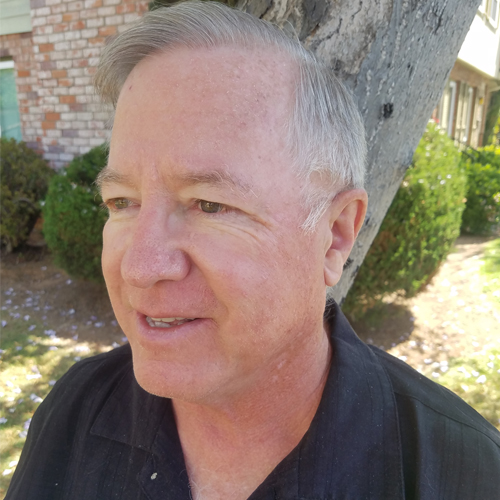 Faculty Spotlight
Faculty Spotlight
Carl Fielden
Carl Fielden is a man of many skills. He earned his first degree in music and focused on music therapy, building from his plan, at the age of 10, to become a classical musician. While he was attending Ohio State University, he joined the ROTC program, and after he graduated, he was an infantry officer on active duty for three years. During his active years, he had the opportunity to go to Korea. There he became aware of not only the country, but of teaching English as a second language. After he left active duty, he sought and earned a master’s degree in linguistics and TESOL. This is when Fielden started to teach writing to non-native English speakers at SDSU and Cuyamaca College, in addition to teaching native English speakers at City College and UCSD. His turn to teaching was inspired by an excellent high school teacher who had a great influence on him. Through her, he gained a desire to teach composition and rhetoric–even though she warned him to never become an English teacher, while showing him her briefcase with 80 or more ungraded papers. Fielden took this as a dare. And he now calls himself “an accidental college and university instructor.”
Carl has been teaching writing at SDSU since 1985. While working on his graduate degree in linguistics, he taught his first class as a teaching assistant through the Academic Skills Center. This center was used for “teaching developmental courses in writing, reading, and mathematics” and was later integrated into the newly formed RWS Department in 1993. Fielden has also worked at what is now known as the Student Ability Success Center.
As part of his work, Carl has explored the integration of technology in the teaching of writing. In the last 10 years, he has focused on principles of universal design for learning, commonly known as UDL. In the future, he plans to conduct research on “designing inclusive, engaging environments that enhance the learning, retention, and graduation of students with disabilities” at Grossmont College.
Fielden understands that for many students writing can be an obstacle, sometimes even a traumatic one. In his teaching, he works to break down these barriers and “help students develop their own natural composing styles and practices” that they will be able to work with after graduating. Students know that Fielden wants what is best for them as many have written in their course evaluations that Fielden is approachable, encouraging, and that he cares deeply about them. He has also received a comment frequently: “Finally, a writing course that is useful!” In 2021, Fielden received the Teaching Excellence Award from the College of Arts and Letters. However, he sees his students’ successes as writers as an even greater reward: “I could have never planned a more satisfying career. I will miss teaching at SDSU very much.” Carl Fielden will be retiring in June of 2022.
We wish you the best of luck and a happy retirement! The RWS Department and the students of SDSU will miss you very much and thank you for your work!
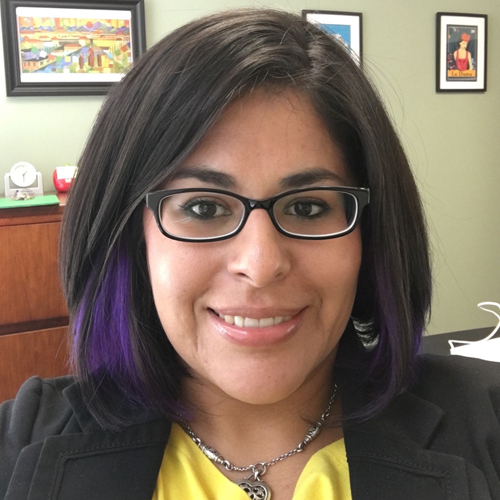 The Landmark Lecture
The Landmark Lecture
Consuelo Salas offers her insight on the department’s annual research and pedagogy
presentation
Dr. Consuelo Salas has just completed her second year as an assistant professor at San Diego State University, and she has very quickly made her mark on the RWS department. After earning her bachelor’s and master’s degrees in English Literature at the University of Texas at El Paso, she recalls that she took an introduction to Rhetoric and Writing Studies course and was then inspired to earn her doctorate in Rhetoric and Composition Studies at UTEP. Since then, she has become extremely involved within the field of rhetoric.
In discussing the annual RWS Landmark Lecture, Salas eagerly explained that the lecture has been occurring since 2003 and it “invites prominent scholars in Rhetoric and Writing Studies to discuss research and pedagogy in this field.” The Landmark Lecture allows for those within the field of rhetoric who are doing “interesting and important work” to share their current research, which creates a strong learning environment for those who are in attendance.
When asked about her involvement in this year’s lecture, Salas explained that as members of the anti-racist working group within the department, she and Karen Koss began discussing Dr. April Baker-Bell’s book, Linguistic Justice: Black Language, Literacy, Identity, and Pedagogy, released in 2020. Both Koss and Salas found Baker-Bell’s work to be incredibly inspiring and decided that they would like to not only read her work but try to bring her to speak at the annual Landmark Lecture. Through these efforts, Salas and Koss applied and were awarded three internal grants: a College of Arts and Letters Instructional Related Activities grant, a Dean’s Excellent Endowment Wendelmoot Memorial grant, and a Justice Equity and Inclusion mini grant. It was through the support of these grants that Salas and Koss were able to bring Dr. Baker-Bell to speak.
In the lecture itself, Salas explains that Dr. Baker-Bell “advocates for critical linguistic awareness of black language” and that her research is “pushing us, as writing instructors, to interrogate our own relationships with language and position ourselves as learners.” Dr. Baker-Bell’s work within her text, as well as in the Landmark Lecture, “works on educating us on what black language history is,” and it allows for the audience to ask the important questions “about the conditions of which it was created, how it has moved over the last centuries to now, and how we teach our writing classes today.” Salas mentions that this lecture inspired her to make tangible changes within her classroom. “I think that is maybe the key takeaway, that as an instructor, even though I already have my doctorate and I am already teaching, I still have room to continue to learn so that I can continue to be an effective instructor of writing.” If any readers are interested in learning more about these concepts, you can find an electronic copy of Linguistic Justice: Black Language, Literacy, Identity, and Pedagogy in the SDSU library.
In regard to the lecture, Salas mentions that it was incredibly impactful to have Dr. Baker-Bell share the concepts that she discussed within her book. Salas expresses that the talk was very “informative and groundbreaking in that [Baker-Bell] is really talking about black language and giving us the ability to see how black language is already a part of culture, even though we did not previously have the framework to be able to name it as such.” Salas states that Dr. Baker Bell ended her lecture on a series of provocative questions, and she recalls a moment where she, as host of the meeting, was at a loss for words as she was just “sitting with what she was asking of [them].” The valuable lessons learned within the lecture served as great inspiration for the future of the RWS program as a whole.
In addition to the work bringing Dr. Baker-Bell, Salas explained that she and her colleagues were also awarded an NEH grant, “Creating Expansive Approaches to Teaching Writing in a Southern California Border Region.” As part of the work of this grant, more speakers will be invited to share with the SDSU community “their own research and how we might apply it to what we are already doing in our teaching of writing.”
In concluding the interview, Dr. Salas offers some incredibly valuable advice. She states that “if you are interested in the field of Rhetoric and Writing Studies, my advice would be to think about the idea that all groups around us have created communication practices which are already unfolding or already occurring, and to take a look at what those are for yourself, take a look at what those are for the communities that you are in, and then acknowledge that the field of rhetoric can continue to expand when you think about our own communication practices and those of our communities.” For current RWS students, Salas encourages students to reach out to their professors and let them know their career goals and interests and “for anybody else reading the newsletter” she would like to encourage them “to take a look at Dr. April Baker-Bell’s book.”
 The Writing Mentors Program
The Writing Mentors Program
How the RWS Writing Mentors Program impacted Lea Baker’s personal and professional
life
Lea Baker is a Creative Writing MFA alumna from SDSU. With a passion for writing, Lea has made her mark and journeyed through several different paths prior to becoming the co-coordinator of the RWS Writing Mentors Program. Baker first stepped foot in the field of rhetoric in January 2015, when she became a TA. She mentioned that this was a defining moment in discovering her love for teaching that has led her to her role as an embedded tutor—something she is exceptionally passionate about. Baker has “slowly worked [her] way into a full-time position at San Diego State through working with community colleges and private high schools,” which was an experience she described as a stepping stone for the teaching track she was looking to engage in.
The Writing Mentor Program is a chance for “students to become critical and reflective writers through an enriched collaborative experience.” Open to both undergraduate and graduate writing students, the Writing Mentor Program embeds students within a classroom so that they can be mentored by instructors and improve their pedagogy by working with students one-on-one. Baker mentions that the overall goal is to “have instructors and students all work together to learn communication skills, pedagogy skills and learn how to mentor as well as tutor—something everyone can benefit from.” She thinks of it as “the best job ever! You get paid to attend class and then you get paid to tutor people after!” Not only are you enriching your knowledge of writing, but you are also gaining in-person experience that cannot be taught elsewhere.
Despite her love for teaching, at one point in her career, Baker admits to being nervous about taking on such a big role as “[she] liked writing, but [she] didn’t necessarily like standing in front of a classroom.” However, Baker recalls, “This program gave me that confidence and it also got my foot in the door.” The embedded tutoring program at one of the San Diego Community Colleges was actually Baker’s first job after graduating, which assisted her into the position she has now. She describes the opportunity as benefiting both graduate students as well as undergraduate students who are looking for a way to start building their resume and gaining experience.
While discussing how hard it was to get a job somewhere that specializes in writing, Lea took another approach and spoke about how her time in the medical field actually aided in her work experience. “I worked at a physical therapy office because I struggled a lot to get hired at the local library, but I got accepted at a lot of medical facilities because they need people to do the documentation. I was assigned with a physical therapist and I would write what they were doing and check off lists because it all has to be noted. I think writing majors have a big advantage because no matter what field you go into you need to be able to express whatever you're doing to someone else.” The Writing Mentor Program allows for students to gain writing skills like this and teaches them how to apply them anywhere, which actively broadens the workplaces in which they can be accepted into.
Lea, like many other English majors, recalls being frequently asked if she was going to be a teacher because of the uncertainty of finding a job with the major. Her answer was the same every time: “No!” However, she speaks so positively of her experience and transition in becoming a core part of the embedded tutor program that now she “can’t imagine doing anything else.” She concludes, “Any student, whether they are graduate or undergraduate, can apply for this program. While it is very helpful for students who want to go into teaching, it isn't exclusively for that. We also have Econ majors who worked with us to be a mentor; essentially anyone who has passed an undergraduate college writing course can apply to be a mentor.”
Lea thanks SDSU for taking her under their wing and always encouraging her to push herself in her career. With countless pieces of advice given to her over the years, Lea hopes to give some tips back and urges those who may feel conflicted about the program to “just give it a try” as “everyone benefits from this.” Anyone interested can apply for this program.
Summer Ycasas has just completed her BA in Rhetoric and Writing Studies. She first took RWS classes when she enrolled in first-year composition during her first semester at SDSU. However, at that time, she did not know there were more than just 100 and 200 level courses. Later, as Ycasas realized her linguistics major wasn’t a good fit for her, she thought back to those RWS classes: “I really enjoyed taking RWS 200 as a freshman and realized when I first thought about changing my major that I could be studying something I not only enjoy but excel at.” It was then that Ycasas enrolled in RWS 250 and began her path through the major with a focus on writing, about which she has always been passionate. After she graduates, Ycasas is planning to pursue work in technical and professional writing or editing. Given her love of writing, it’s not surprising that she says, “I enjoy practically every kind of genre of writing I’ve dabbled in during my time here at state.”
In thinking about her favorite RWS classes, Summer notes, “Any and every course that Jenny Sheppard has taught!” Those courses include RWS 250, 543, and 504. She is especially appreciative of the design skills she has learned as a part of studying both rhetoric and writing. These principles have made it easier for her to use and navigate her notes, essays, proposals and other projects. One thing Ycasas wished people and other students knew about the RWS Program is that it is more than just writing essays for classes. She acknowledges there is a lot of writing involved, of course, but also sees the major as engaging students in useful genres such writing reports, proposals, infographics and emails. Ycasas ends by saying, “The RWS program really lets you stretch your wings as a writer and shows you just how instrumental writing is in so many places.”
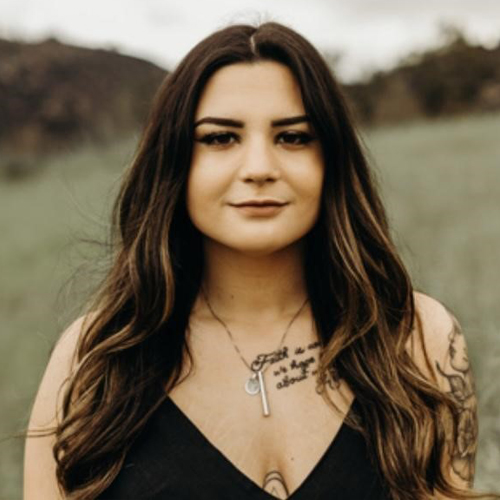 Graduate Student Profile
Graduate Student Profile
Mikayla Garcia
Mikayla Garcia is a current graduate student at San Diego State University and is earning her Master’s in English American Literature. However, she is also connected to the RWS Department as she states, “Essentially, I am very embedded in the RWS department!”—a perfect way to describe her work as an RWS mentor or embedded tutor. Garcia discovered the RWS program at SDSU through a friend of hers. Because the friend knew Garcia had a passion for teaching, she thought it would be a great fit for her. Garcia applied for the job and has been working as an RWS writing mentor through Fall 2021. In addition to working as a mentor, Garcia taught RWS 200 in Spring 2022 through the department's graduate teaching program.
Garcia earned her BA in Literature and Writing along with History as her minor from California State University San Marcos. Through her undergraduate studies, she obtained skills from the Literature and Writing Department that allowed her to have the opportunity to work and tutor for three years at CSUSM’s Writing Center. The students whom she tutored used skills similar to those taught in RWS courses. As for her time with RWS, Garcia thinks it is “great to be involved in a department dedicated to helping students better understand rhetoric and the writing process.”
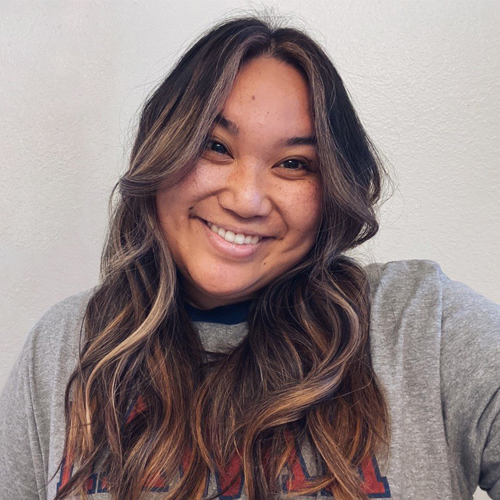 Graduate Student Profile
Graduate Student Profile
Eirein Gaile Harn
Eirein Gaile Harn just completed the RWS MA program on the teaching track. She earned her undergraduate degree at SDSU, double majoring in Sustainability and RWS while serving as a writing mentor as well as the director of communications for the RWS student chapter of the Rhetoric Society of America. She has made a name for herself as a member of the lower-division writing program team, a graduate representative on the RWS council, RSA VP, as well as a teaching associate.
Despite all of her accomplishments and positions held at SDSU, when asked about her initial involvement in RWS, she mentions that it was a bit of a rocky start due to an unfortunate personal situation that put a damper on her relationship with writing. However, Harn was eventually able to rebuild that relationship when she took RWS 200 course during her first years at SDSU.
Thanks to a caring professor, Harn remembers her self-confidence as a writer finally beginning to blossom. While she still had moments of self doubt, sometimes questioning why he believed in her, she took his advice to consider further studying RWS. His kind words meant so much to her that she ultimately took a leap of faith and decided to pick it up as her second major.
When once again asked to make a decision furthering her education, Harn thanks Dr. McClish for being a deciding factor in joining the master’s program. With her focus on high school teaching during her undergraduate years, Harn was almost ready to go down that path had she not felt as if she needed more time to prepare. She remembers feeling like she “wasn’t ready to be done learning.” She then turned to Dr. McClish and was encouraged to take the graduate-level RWS 601 class to see how she felt about potential grad study. Harn mentions that it was a turning point for her and that she realized that “there was more to learn and do in the MA and [she’s] honestly so grateful for the opportunity.”
Moving forward with her work, Harn has decided to share some current research topics she is pursuing, the first being the study of names (onomastics). She mentions in her thesis titled “‘That Doesn't Strike Me As Filipino’: Navigating Names, Cultural Identity, and Rhetorical Onomastics” that she “called on the field of rhetoric to formally acknowledge rhetorical onomastics. There is so much scholarship around the significance of names in other fields, but I hope to shepherd those discussions into the field of rhetoric with a cultural/decolonial rhetorics lens.” Her second project is relating to her current job as a writing instructor that involves trauma-informed approaches to writing pedagogy. She is also “always looking for opportunities to visibilize Filipino and Filipino-American culture, and to share [her] experience as a Filipino person living in the United States.”
With regard to her future and applying everything she has learned here at SDSU, she hopes to continue teaching composition at the collegiate level. While reflecting on her journey, Harn humbly states, “I’ve had the opportunity to teach in the RWS department for three semesters during my MA, and it has been the most challenging and rewarding thing I’ve ever done. I love teaching writing and working with students, and I hope to do that for a very long time.”
Sarita Tanori is a former graduate student of the RWS program and is currently an RWS and Chicana and Chicano Studies lecturer here at SDSU. All of the classes that she teaches have a central focus on writing, with her CCS 200 course and her CCS 396W course also focusing on ethnic studies. She explains that she teaches more classic RWS classes as well. She notes that she is “constantly surrounded by writing, but in different facets which keeps [her] work fun and exciting.” Outside of her main teaching career, Tanori is a creative nonfiction writer, a genre and practice she describes as “a transformative tool for building a community and making space to heal.” She is dedicated to her own personal growth as a writer both in public and private as she continues to build upon her knowledge in the writing field.
As a longtime lover of writing, Tanori is glad that she found guidance at SDSU through the RWS program. The course offerings are so broad that they allowed her to experiment with subjects that she might have never learned she enjoyed—teaching being at the top of this list. She mentions—with a special shout out to a particularly exceptional lecturer, Jamie Madden—that it is because of the fantastic mentors, faculty, and staff within RWS that she was able to thrive and be guided in the field of academia that is not always so forgiving. A fear of hers was that because of “the westernized and white hegemonic framework applied to mainstream professionalism,” the professional world would feel depersonalized. However, thanks to the caring souls she met on her journey at SDSU, she never felt the pressure of trying to find her way in a professional environment.
Like many, Sarita was initially unfamiliar with how widely applicable rhetoric is when she first joined the RWS department. However, through the teachings of one of her favorite professors, Jenny Sheppard, she has come to recognize that “everything is rhetorical.” A couple of Tanori’s favorite courses while in the SDSU graduate program included History of Rhetoric with Dr. Glen McClish and Writing Center Practice Theory with Dr. Kathryn Valentine. While she was fascinated with the material from the History of Rhetoric course, describing it as “interesting and arduous,” it was the Writing Center course that particularly stood out to her and ultimately “helped define [my] pedagogy.” Tanori mentions that a major takeaway from the RWS department is that she has learned how to “analyze [her] decisions while navigating adulthood and a professional career.”
As Tanori looks back on her time before earning her MA, her work as a newly employed Teaching Assistant is what most fondly stands out in her memory. She recalls that this particular experience is what made her switch her focal point from professional writing to teaching—an experience she positively refers to as “a distinct adrenaline rush.” Tanori speaks about how this was a time of growth for her and how she relished in the opportunity to not only teach for the first time, but learn how to make mistakes in a forgiving environment. Her frequent feelings of understandable anxiety were mitigated through the bonds she made with fellow instructors who ranged from newbies like herself, to veteran instructors who graciously shared their words of wisdom. Sarita is grateful for this experience and thanks the community she built with these people that “made the experience easier, and helped me parse out and process all of the emotions that came with this first.”
While earning her MA, Tanori notes that her thesis was a very “challenging and rewarding” aspect of her experience in the RWS department. Sarita mentions how grateful she is for her thesis chair, Dr. Katheryn Valentine, and that she was a great support system for her as she was writing her thesis on emotions and vulnerability in rhetoric. Unfortunately, Tanori’s work on her thesis was stunted due to the start of the pandemic back in March of 2020. “The overwhelming grief of the pandemic made it difficult to write or think, so I took extra time in graduate school to focus on finishing my thesis,” states Sarita. However, all of the unknowns in the world during that time allowed Tanori to gain more patience when it came to her thesis, and ultimately “see [her] vision through and do [her] participants justice.”
When asked if she had any advice to give to younger students or anyone pursuing a career in the field of rhetorical writing, she humbly stated that while she thinks doesn’t have a whole lot of wisdom to share, she does believe that “you should always try to tie in your interests and hobbies into your rhetoric work.” Tanori expressed this core idea in a story dear to her heart about her most interesting writing project. Sarita explained her archival zine project that was based on her mother’s migration story from Sonora, Mexico. She expressed how important writing this piece was to her, and that she learned so much from her mother’s story. Tanori cherishes this writing project, which taught her “about the value of oral traditions and archiving the narratives of our loved ones,” and how rhetoric has the power to tie together universal cultural, personal, and educational values.
Erica Mosley is an undergraduate alumna of SDSU and is using her degree in rhetoric to switch over to the field of marketing as a manager and freelance communications consultant. She writes for multiple organizations’ social channels, manages email marketing, as well as websites. Mosley mentions that “an important lesson [she’s] learned from studying RWS that has helped [her] tremendously is knowing how to write in different contexts,” which luckily, she has gained plenty of experience in doing through her line of work.
Since completing the program, Mosley recalls another crucial lesson that stuck out to her: the importance of critical and analytical thinking.
She describes it as “by far the most helpful [skill] as [she’s] transitioned from being a writing tutor, to a career coach/program coordinator, to now a marketing manager.” She shouts out one of her favorite professors, Dr. Jenny Sheppard, for showing her how to think outside of the box in addition to challenging her in classes that she wouldn’t have normally taken. Mosley mentions that because of one of Dr. Sheppard’s courses, she was able to experiment in graphic design that ultimately led her to grasp the concepts that would lead her to her current job. She describes this favorite course of hers as “challenging . . . but extremely practical and useful.”
Professionally, Mosley is proudest of her work that included “writing 100 days worth of emails that would convince corporate executives to center racial equity at the core of their business strategies.” Mosley’s rich background in rhetoric aided in her ability to use the art of persuasion to her advantage. Personally, though, she hints that her proudest moment was her project that entailed a 15-page analysis on a single song by hit singer, SZA—an assignment she described as “daunting, but very rewarding.”
Looking back at her time here at SDSU, Erica has nothing but positive impressions to share. With gratitude towards the professors at the university as well as the Department of Rhetoric and Writing Studies, she reflects fondly on the connections she made in addition to the opportunities she had to follow her passions. When asked if she had any advice to give to current students, she confidently said to “trust your instincts and stand firm in your power. You’re gaining invaluable, applicable, and transferable skills in this program that can take you a long way.”
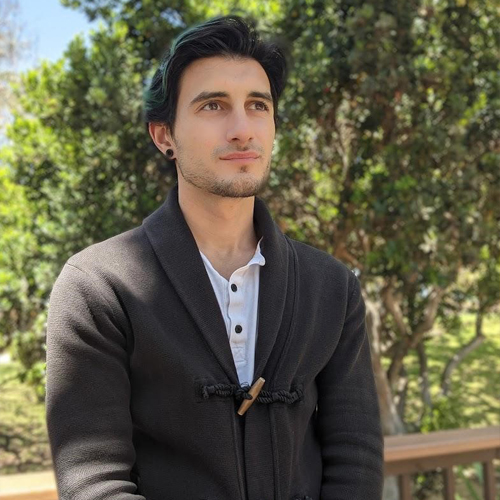 A Focus on Staff
A Focus on Staff
Matthew Gantos
Matthew Gantos earned his BA in journalism and he has been working with the RWS Department since 2018. He says that the best part about working at SDSU is “working at SDSU.” He sees people enjoying their work and taking pride in what they do, specifically because it has value. Gantos views education as an “important pillar of our society.” In addition, he enjoys the beautiful campus he visits every day. Gantos noted that being able to earn his graduate degree while working at SDSU is the second best part; he is currently enrolled in the MFA program in television and film.
Gantos has been drawn to writing ever since he was young, especially when music was involved because he “liked listening to song lyrics and figuring out what they meant.” Later on, he would think critically about what made someone choose certain words and why they would choose that instead of something else. In addition to seeing rhetoric in songwriting, Gantos also sees it in screenwriting, because every film has an argument or message behind it.
Speaking of the challenges that come with trying to balance work, classes and life, Gantos is optimistic: “The university and our department staff are all incredibly accommodating when it comes to supporting further education.” Along these lines, something Gantos has observed working in RWS and wished he knew earlier as a student is how human instructors are. He mentions that especially with a department filled with writers, “you can find a group of well-spoken and intelligent people, that are also . . . just people.” Sometimes when he was an undergraduate student, Gantos viewed instructors as detached. However, after working with the department, it reminded him they are people who may be “accomplished and intimidating” at times, but at the “end of the day they are good people.”

Agnes Szakacs
Agnes graduated from SDSU with a Bachelor’s Degree in Rhetoric & Writing Studies in Fall 2021. During the fall semester, she interviewed subjects and wrote a number of the articles featured here

Noelle Higgins
Noelle Higgins is currently a second-year undergraduate Rhetoric and Writing Studies student. She greatly enjoyed her time working on the Spring 2022 newsletter alongside her co-editor, Celia Fisher. Noelle is especially thankful for this opportunity to grow as a writer and to gain new and important perspectives from each of the interviewees.

Celia Fisher
Celia Fisher is currently a first-year undergraduate student majoring in Rhetoric and Writing Studies. After becoming a co-editor during the Spring semester of 2022, she worked on interviewing subjects, as well as writing, editing, and revising the newsletter alongside Noelle. Celia hopes to continue to practice writing in the future and gain more experience in the field of rhetoric. She thanks Dr. McClish for this opportunity and has sincerely enjoyed her time working for the department.
Spring/Summer 2021
The SDSU Rhetoric & Writing Studies Department
Newsletter and Podcast
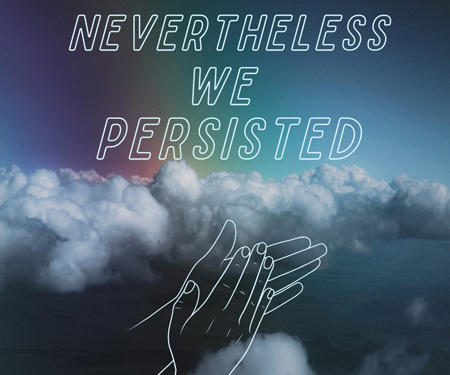 The Rhetorical Situation
The Rhetorical Situation
Podcast Episodes 2-5
In the second installment of the Rhetorical Situation, a podcast by the Rhetoric and
Writing Studies department, you’re invited to hear from yet another chorus of voices
from RWS. In this series of 4 short episodes, co-editors Rachel Michelle Fernandes
and Nicole Golden interview a handful of individuals from the department, ranging
from students, faculty, and alumni to one of the first writing center tutors at SDSU.
Each episode features 1-2 individuals, but all their stories show the power of persistence
as they explain their unique paths to the department and handling continued working
and learning from home. Get ready to get personal, and rhetorical!
 Letter from the Chair
Letter from the Chair
A Nod of Appreciation from Dr. McClish
The last three semesters have been unlike any I’ve experienced in my many decades of university life. We have, in essence, been compelled to rethink and refashion our most basic ways of being students, teachers, staff members, and administrators. Now, finally, as the pandemic appears to wane at the University, in California, and in the nation, we are preparing to return—more or less—to our familiar ways of teaching, learning, and being together in the fall. While we know “this isn’t over,” we feel that we’re heading in a good direction and that better days are ahead.
To our 2021 graduates, you persevered during a time of great uncertainty and challenge. I know how difficult your final three semesters have been, and the sacrifices and hardships so many of you endured, yet you finished undeterred, and I want both to praise and thank you for doing so. Just as we’ve honored you with a degree, you’ve honored us by completing the journey with such determination. Class of 2021, we are proud of you. You are very special!
I’d like to take some space to honor two recent retirees from RWS, Hedda Fish and Bob Stein. Hedda’s legendary career as a San Diego State lecturer began with the English Department many years ago in 1979, before Rhetoric and Writing Studies existed. She came to the university after substantial careers as a legal secretary and a high school and community college teacher that predate the majority of the readers of this message. When RWS was born in 1993, she came over to the new unit as a writing teacher, and she has been with us ever since. She has also taught for Mesa College since 1967. Hedda has been well known as one of the early birds on campus, arriving with the sun and actually enjoying 8:00 AM classes. Her SDSU morning routine held steady throughout the many challenges she has faced and was interrupted only by the pandemic. We will miss Hedda’s inexhaustible energy, her pluck, her collegiality, and her cheerful presence in the classroom, the hallways, and the offices of RWS.
Bob’s time in the department began as a graduate student in our Master’s program. I vividly recall his early encounters with rhetoric in my RWS 600 class. His interest in the subject matter grew to a passion, as did his commitment to teaching rhetoric and writing. Bob worked as a TA, and after graduating in 2013, began teaching as a lecturer, which he has treasured as a second career. With a 28-year stint as an advertising executive behind him, Bob enjoys contextualizing rhetoric as a kind of marketing, and—alternatively—marketing as a kind of advertising, which has led to fascinating discussions about the relationship between the two. Given his years in the corporate world, he has been a natural in RWS 290 (Business Writing and Rhetoric), but his special love has been lower-division writing, the heart of the liberal arts tradition of education. We will miss Bob’s passion for teaching rhetoric and mentoring students, his willingness to ask hard questions, his gentle iconoclasm, and the slice of New York he has brought us Californians.
Finally, I note that although I will be functioning as chair the entire summer, I will be on sabbatical for the fall semester, hunkered down at home trying to write. In my absence, RWS you will be in the steady, kind hands of two of our longtime colleagues, Kathryn Valentine and Chris Werry. Everything will run smoothly—no doubt more smoothly—while I’m away.
Through this newsletter and accompanying podcast, I hope you enjoy learning more about the people who make our departmental mission possible, as well as our inspiring students and alumni.
Best wishes for a summer of renewal, recreation, and reengagement with the world beckoning all around us.
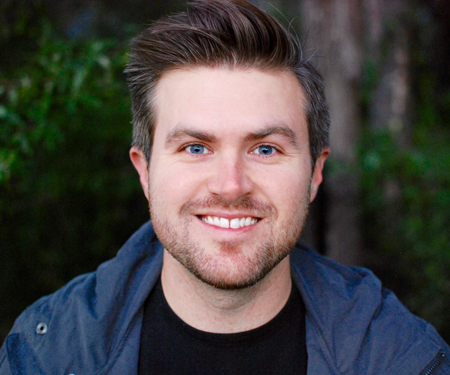 New Faculty Spotlight
New Faculty Spotlight
Dr. Dustin Edwards
The Rhetoric and Writing Studies Department will be joined by Dustin Edwards beginning in Ffall 2021. Dr. Edwards specializes in professional writing but also engages in digital implications of rhetoric. Previously, Dr. Edwards served as an Assistant Professor and the Director of Graduate Programs in the Department of Writing and Rhetoric at the University of Central Florida (UCF). There, he taught courses in digital writing, professional writing, as well as visual and material rhetorics. Remembering his virtual visit to campus and how often people mentioned that SDSU is big, Dr. Edwards joked, “Oh, that’s cute because we do have 70,000 students [at UCF].” Before joining us at San Diego State University (SDSU), he and his wife are managing arrangements for moving from Florida to San Diego. With miniature dachshund Poppy and a toddler in tow, they are in the process of figuring out whether to drive or fly across the country. Unfortunately, Poppy isn’t the best flyer, and she’s a bit overweight these days. Dr. Edwards quipped, “I’m blaming the pandemic—actually, the child just gives her whole slices of pizza.”
Dr. Edwards’ current research is culminating in a book project titled “Digital Damage and Rhetorical Invention at the End of Worlds” in which he explores digital rhetoric and its physical, human, and other intersections. Of his still-in-progress book, he says, “It really examines the environmental implications of digital technologies. And I look particularly at two different sites in the book—so, a Facebook Data Center in Los Lunas, New Mexico, and then another site in my hometown [Silver City, New Mexico], which is actually a copper mining town.” He investigates both the cloud’s environmental implications at the Facebook Data Center and the material infrastructure of the copper mine. Dr. Edwards shares how this work stands on the shoulders of cultural rhetorical scholars: “I’m so indebted to cultural rhetoric scholars, who have articulated story as a rigorous, and worthwhile, and important methodology for doing rhetorical work.” In the book, Dr. Edwards tries to tell stories of both locations in order to “make visceral connections to say what we’re doing online is not immaterial; it has environmental consequences, and we need to pay attention to those.” He added, “For me, telling these really personal and implicative stories related to these places just hopefully connects us in better ways to pay attention and be more alert.”
Interestingly, the intellectual path from his Master’s to his current work is anything but linear. After being accused of plagiarism in high school, Dr. Edwards struggled to understand why he “felt like a criminal” and where his negative feelings originated. So, he turned toward the rhetoric of plagiarism during his master’s program when conversations about plagiarism, authorship, and originality came up; eventually, he came to understand that all three make up a “complicated phenomenon.” For his M.A. thesis work, Dr. Edwards investigated online tutorials which presented methods for reducing plagiarism. “Typically [these tutorials] would place students like burning in hell if they plagiarized or behind bars . . . these [are] really terrible metaphors that don’t allow students any room to question, what is this thing called originality?” With this interest still in mind, Dr. Edwards planned to continue with similar work during his Ph.D., but he soon found himself drawn to circulation theory, the study of how things transform and move online. From there, the work of his dissertation followed activist hashtags as well as the affect or emotions that circulate online. “What I came to at the end of the dissertation was thinking through kind of different ways to think about circulation,” he reflected.
Through his dissertation work, Dr. Edwards realized there are four levels to circulation online. The textual level focuses on what actually circulates, the affective level delves into emotional implications, and an infrastructural level follows the process of circulation. But, Dr. Edwards began to realize that a data layer occurs simultaneously across the three other levels. He recalled reading Nicole Starosielski’s book The Undersea Network; her work pushed against the transient and immaterial assumptions of how information travels, underscoring the fact that undersea data cables circulate data for us—rather than “moving in the airways or something.” Importantly, Starosielski’s work encouraged Dr. Edwards to conceptualize digital damage: “there’s this huge environmental cost for circulating and storing data, and that growth just continues to happen.” This insight resulted in a mere footnote in his dissertation where he emphasized environmental issues with data circulation. He drove home a simple but sincere point that “we need to pay more attention.” It wasn’t until several years later that this footnote resulted in something bigger. Dr. Edwards said, “A couple years after I defended my dissertation, Facebook announced that they were building this sprawling data campus in New Mexico.” And so, with a personal connection drawing him in, Dr. Edwards began the work that has become one of two focal points for his book.
As he looks forward to teaching at SDSU, Dr. Edwards is excited about what both the institution and department value. On the institution, he stated, “Situated along the border, SDSU is a Hispanic serving institution. It seems like it’s putting a lot of effort and resources into being a more diverse, inclusive, anti-racist institution.” He continued, “There’s just so much value in being in a standalone department and the kinds of things that you can get done, the kinds of classes that you can offer, not having to fight for resources . . . and obviously, the opportunity to teach an [array] of courses.” This fall he will be teaching advanced writing strategies and professional writing both at the 500 level, but students can look forward to courses centered around the rhetoric of sustainability and writing in nonprofits in the future.
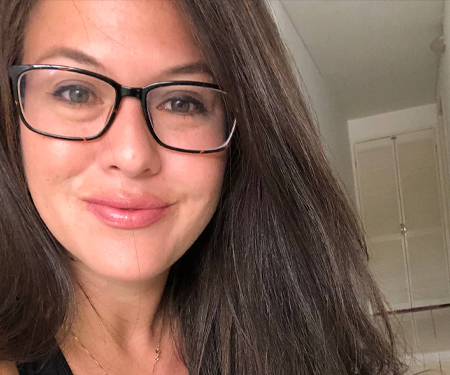 The Chamorro Activist and Teacher
The Chamorro Activist and Teacher
Alum Desiree Ventura confronted coloniality State-side
Alumna Desiree Ventura journeyed from her Pacific Island home in Guam to San Diego and back, learning how to support her Chamorro community against the subtle but pervasive colonized mindset that Ventura herself had somewhat unknowingly internalized. A full-time teacher at Guam Community College for the last ten years, Professor Ventura’s first exposure to students from the continental U.S., “state-side” (as she and other islanders call it), occurred during her time attending San Diego State University starting in 2007.
“I’m from a village public school,” says Ventura, “and, when I enrolled at San Diego State, I felt wildly incapable.” She remembered transferring from Chaminade University in Hawaii to San Diego and beginning to realize that the way in which Pacific Islanders “operated was different.” She explained her goals behind finally visiting the States: “I was only in San Diego to pursue my graduate degree and the intention has always been to return home.”
Growing up in the indigenous community in Guam, Professor Ventura shared a bit about her role as a Chamorro woman and how she connected with her community differently following her time in San Diego. “In the Chamorro culture, the women have an obligation, especially from traditional families, to uphold and preserve Chamorro traditions, culture, and just to kind of safeguard our people,” she said. In fact, Professor Ventura experienced a sudden culture shock upon starting at San Diego: learning alongside stateside students who shared their opinions openly and disagree with their professors were unfamiliar ways to navigate the classroom because, Professor Ventura says, “when you grow up in a colony, criticizing, rejecting, or resisting is very frowned upon; it’s not part of [Chamorro] culture.” However, she is grateful for the patience that faculty provided her. “My time at San Diego State,” she said, “helped me view [Chamorro culture] from an angle that had me returning home, re-engaging in a more intense way.”
As she reflected more on her time in San Diego, Professor Ventura realized how important her short time away from Guam was for her growth. “I wasn’t at the same level of consciousness when I was living [in Guam] growing up, she said before revealing her most impactful takeaway from learning stateside: “I remember I had one classmate who looked at me one day and he said, ‘So how does it feel for you to be colonized?’” At the time, Professor Ventura did not consider herself a colonized body; she describes coming to terms with Guam’s colonization and figuring out how to push back as “a journey and self exploration” where she “found a lot of confidence and understanding” from her peers and faculty, especially Dr. Glen McClish and Dr. Suzanne Borderlon.
Upon returning to Guam in 2009 with her M.A. from San Diego State, Professor Ventura found “coming home was very dismantling in a lot of ways.” At the time, the Island was in the midst of planning to organize Marine troops from Okinawa to Guam. As she became deeply involved in efforts against these plans, she recalls, “It became really important for me to involve myself, get together with other Chamorros who ironically were returning home at the same time from getting their degrees,” to protect the threatened ancestral land. Professor Ventura reflected on the benefits of her colleagues returning to Guam: “I think it was the perfect time for all of us to come home because that led to a whole generation of community workers that have made big movements in terms of our progress here with not only the Department of Defense and military plans but with our political status.”
After her sudden transition into community activism using the knowledge she gained from being in the RWS program, Professor Ventura has continued to keep critical reflections and community engagement in the coursework she teaches and the curriculum she writes. She said, “One of the biggest things I have been involved in, especially in terms of teaching and cultural work and political work, is making sure that our students are exposed to resources in the classroom that include them, like reading Guam history written from a Chamorro and giving them versions of our story that are not written by outsiders.” She’s also responsible for two classroom Pacific Island readers and contributes to calls that seek to place Pacific stories in more classrooms.
 The Renaissance Man
The Renaissance Man
Alum Garrett Stack is an accomplished scholar turned parent
“Every person should get the chance to live in San Diego for two years. Period. End of sentence,” says former rhetoric and writing studies graduate student Professor Garrett Stack. Earnest but with a chuckle, he adds: “If every person on Earth got two years in San Diego, we'd be a happier humanity.” At Ferris State University, located in West Michigan, Professor Stack was recently promoted to associate professor. There, he teaches journalism, creative and technical writing, and composition. He is also a writer and researcher.
Professor Stack majored in journalism as an undergraduate student and worked for a small town newspaper during his senior year. But, writing “terrible stories about terrible parents and terrible crimes . . . it kind of beats on you and it wears you down,” he said. So, as his final semester started winding down, he sought out options besides staying in the position that he was beginning to dread. Luckily, he had a supportive mentor. After he spoke with her, Professor Stack learned about rhetoric. “She pitched it and it still kind of resonates,” he recalled. “It’s like if creative writing and journalism had a kid and then you studied the kid.” For young Stack, this sounded enticing: “I started looking at programs and I found San Diego.”
Reflecting on the organization required to teach several types of writing, Professor Stack firmly believes that “it’s all the same thing.” Although he described technical writing as “outward looking” and “user centric,” where the focus is on readability regardless of the topic, he said, “that’s also how you should teach composition, that’s also how you should teach journalism.” Chiefly, as a writer, “you should be thinking about your reader first, and last, and in the middle, and in everything that you do.” Thinking about feedback he often gives across all the courses he’s taught, Professor Stack shared, “the most common piece of criticism I have for anybody is ‘you wrote this for you, and not for anyone else.’” He quipped, “and, that’s fine if you’re writing a diary, but unless you’re writing a diary, you didn’t consider your audience.” To drive this point about the audience home for his students, he features workshopping in all his courses since he values how the process “reinforces that idea that you’re writing for other people.”
Outside of his coursework, Professor Stack also writes fiction, poetry, and environmental communication theory—the latter which is also his general research focus. He explains his niche within the intersection of environmental communication theory and rhetoric, probing into discourse analysis: “It’s a little bit of a mix between rhetoric and linguistics. You do close textual reading and oftentimes you work in some statistical analysis . . . how words are functioning across texts and within texts to do certain performative work.” His latest publication focused on the invasive species Asian Carp paired with the concept of spectacle; these carp can be seen jumping out of water. Imagine “columns of leaping fish, and they're thick in the air, they're huge.” Interestingly, Professor Stack and his research partner learned that although “there's no scientific consensus on their effect on the ecosystem . . . [Asian Carps] were able to skip the line” in terms of funding precisely because their spectacle brought attention to them.
Since Professor Stack and his wife welcomed twin boys in January 2020, however, his attention to research has thinned. Reflecting on life with newborn twins during a lengthy period of working from home, Professor Stack mentioned various ups and downs. “I got more time to spend with my newborns than probably most other fathers in history. At the same time, I got to spend so much time with my kids while trying to do my job,” he noted. He touches on his main takeaway: caring for children, among similar responsibilities, “forces you to . . . grow up” and “do time management in a real serious way.” He remembers balancing side jobs with teaching or other responsibilities in the past but recognizes how strict he must manage his time now around the needs of his tiny humans. He describes the kind of focus necessary while his twins nap: “Okay, you have two hours and there is no spend[ing] an hour of that clicking around on the internet. It’s like you have 120 minutes, and they all need to count for something. And, that is a different way than I've ever worked before.” Although he’s learned this useful skill and enjoyed the extra time with his family while working from home, he looks forward to returning to campus. Teaching online for the past year or so, he describes the experience with an unexpected analogy: “I feel like a DJ.” For Professor Stack, teaching on Zoom is “talking into a microphone” as he “spin[s] another tune” for his students, looking at the screens of names wondering, like the DJ scanning a crowd, “if his jokes land.”
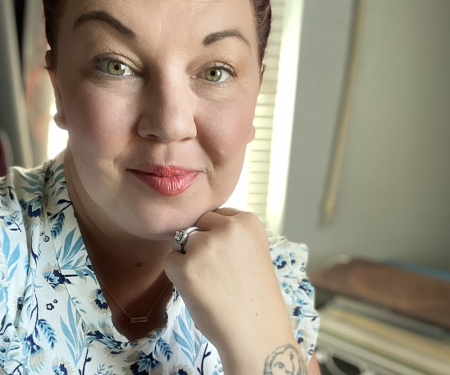 The Humanist
The Humanist
Lecturer Emma Lee Whitworth creates community in the writing classroom
Self-titled adopted child of the RWS department, Emma Lee Whitworth has been with San Diego State University (SDSU) for over ten years but first appeared on campus as a student back in 2008. For several years, Emma Lee has been an RWS lecturer and coordinator of the RWS Writing Mentors Program (previously known as Writing Fellows). During her time with RWS, she also served as assistant scheduling coordinator, as well as worked on many different committees, including Writing Placement Assessment (WPA) and the RWS 105 Rhetoric of Written Argument Stretch series—summer courses open to students still working toward satisfying the SDSU Written Communication Assessment requirement. Currently, Emma Lee is also a digital outreach volunteer. She laughed lightly, “I kind of have a role in as much as I can.”
After revealing her tireless enjoyment of being involved, Emma Lee added, “I do like being a part of communities, especially communities of change.” In particular, she sees the work of the department as an exemplary space of positive change. Speaking of writing in particular, Emma Lee said, “I think there’s so much destigmatizing of the writing process that needs to happen because . . . people have this idea that they sit down at their computer, they have this blank, white screen staring at them, and then they’re supposed to just like vomit brilliance onto the page.” Emma Lee says that it’s all about humanizing the writing process and the classroom experience, too.
In 2011, Catherine returned to the U.S. and began a full-time teaching position at a small private elementary school in Orange County that utilized a classical approach to education using the progymnasmata method. Created by the ancient rhetoricians such as Aphthonius, the progymnasmata consists of a thoughtfully ordered pedagogical design that teaches writing and speaking through a series of increasingly complex exercises. For Catherine, the progymnasmata was mostly a mystery until she moved to San Diego to teach at another classical school; it was there that she truly understood the efficacy of the progymnasmata method. A colleague who had worked his way through the RWS Master Program himself showed Catherine the way: “He saw it from beginning to end, and he really actually saw how teaching it with fidelity through the whole program, it teaches everyone . . . the communication and writing skills they need to be effective communicators.” It was then that she sought to join SDSU’s RWS program.
After completing a B.A. in English at the University of Washington and studying Comparative Ethnic Studies at Washington State University, Emma Lee watched as her oldest brother pursued graduate school and began teaching. “He and I started talking about teaching a lot and kind of collaborating on what a good pedagogy would look like and, you know, having fun with lesson plans and stuff.” These casual but meaningful conversations ultimately led her toward realizing that she wanted to teach. “I started thinking about my experiences with instructors in college and thought I could do a better job than them.” She chuckled, “Or, you know, I was inspired by the people who did do a good job, too.” With an interest in ethnic studies, she said, “I kind of left college with this thirst for a more inclusive classroom experience.” So, like her brother, she sought a M.A. in English but “with the sole focus of teaching at the college level or the community college level,” Emma Lee specified. While at SDSU and pursuing her English degree, she discovered the RWS department and, importantly, an emphasis in RWS for her English degree. With her penchant for involvement, Emma Lee soon found herself working as both a Fellow and a TA for RWS. As she altered paths and turned toward rhetoric, she remembers, “I kind of just fell in love with the department.”
As her undergraduate studies’ location suggests, Emma Lee is a Washingtonian—an Eastern one at that. Emma Lee rarely finds that people recognize where she’s from in Washington, “a place called the Tri-Cities that no one’s heard of—except for the Kennewick Man and the Hanford power plant.” Her move from the northern to the southern West Coast wasn’t intended as the permanent move it’s become; she said frankly, “I never planned on staying in San Diego when I first moved down here.” She qualified this statement with a laugh and added, “Everything I say I’m never going to do; I ended up doing it.” One of those things included kids: “Having a child was never really on my to-do list. So, I haven’t like conceptualized my identity around it, you know, even still four years later.” Emma Lee and her husband—another thing Emma Lee convinced herself she wouldn’t do was marry—welcomed daughter Aria into the world about four years ago. She reflects on the joyous life she leads now, “Here I am living the dream!”
In 2014, Emma Lee and husband relocated from Ocean Beach to Santee, where they purchased a house on a cul-de-sac. The prices that a person pays in Ocean Beach versus elsewhere were part of their reasoning for moving, but Emma Lee cut herself off to say, “Let me blame my husband [for] this one. She explains that “he likes the finer things in life,” naming a few items such as air conditioning and a dishwasher. She joked, “I have to buy him nice things to keep him happy.” This move was quite timely as Aria entered the picture a few years later in 2017. In fact, that same year marked Emma Lee’s official role in RWS Writing Mentors Program. The program consists of successful student writers, both undergraduate and graduate, hired as embedded tutors in RWS and linguistics courses. These mentors provide additional support to their peers under guidance of the instructor. Emma Lee explained student writers’ roles, “We want to see ourselves as mentors to the students that we work with, but we also want to see ourselves being mentored by the instructor.”
Emma Lee shares wise words for undergraduate and graduate students alike: “[take] ownership and action in your education.” An education is “not just studying and, you know, doing well on tests,” she stressed. “It’s this active kind of metamorphosis process.” Although this might seem tough at first, Emma Lee thankfully has some additional advice. She said, “I’m a big supporter of ‘fake it till you make it’ . . . people say dress for the job that you want, not [for] the job that you have. I say . . . manifes[t] it somehow.”
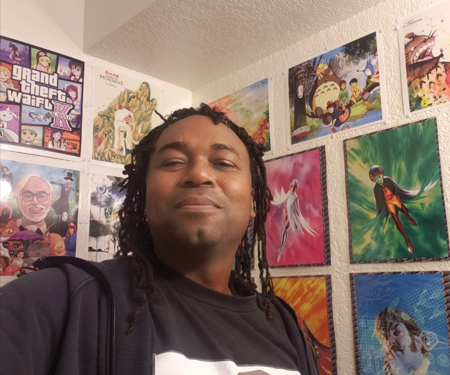 The Rapper Gone Linguist
The Rapper Gone Linguist
Hasan Autman changed careers at 35 and now he’s earning his Ph.D.
Current Ph.D. candidate Hasan Autman candidly stated, “Strangely enough, I got into linguistics ‘cause I was at a party, back when I was a rapper” chatting with a cute girl after his show at UC Santa Barbara. Hasan said, “I asked her what her major was. She said linguistics. And I said, ‘Mine too.’” Shockingly, he went on to eventually pursue a degree in linguistics—and remains in touch with her to this day, grateful that she introduced him to linguistics. Hasan “traveled the world as a rapper and did shows” for several decades before turning to school and teaching. Hasan has traveled to 28 countries in total but currently resides in Flagstaff, Arizona, while he attends Northern Arizona University (NAU). He sees his academic career in linguistics as distinctly translatable to his work with language while a rapper.
Yet another unforeseen person led Hasan toward one his greatest passions: comics. Hasan has been a huge comic book fan since he was about six years old thanks to, funny enough, a childhood bully. Hasan put it simply, “You couldn’t be a nerd in the hood back then.” Hasan revealed a shocking twist to bully Ed’s request to come to his house, “Instead of punching me, he put out a long, white box of comic books and . . he gave me X-Men: God Loves, Man Kills.” Hasan remembers well that he related to the X-Men, “I was a black kid in Southeast San Diego, in the hood. And, X-Men were mutants; they were hated by society, misunderstood. And I felt the same way.” Hasan thinks that Ed, like himself, felt unable to share this passion for comics with others until they stumbled into each others’ lives. Today, Hasan’s Flagstaff apartment is covered with Marvel paraphernalia, and he enjoys anime and comics just as much now as he did at six.
Reflecting on the places life has taken him, Hasan laughed, “It’s been a very strange ride.” To this point, he shared, “I went to [college] when I was 35 years old.” In fact, he never graduated high school or received a GED even as he’s on track to complete his Ph.D. in fall 2021. At 35, he began at a community college and later transferred to San Diego State University (SDSU), where he earned a B.A. in linguistics and continued to complete an M.A. in linguistics as well. Towards the end of his Bachelor’s, Hasan began working as a tutor for the Rhetoric and Writing Studies (RWS) Department and eventually became one of the first tutors in the SDSU writing center. He not only took courses in the RWS Department but also taught courses for the department as a Master’s student.
As the end of his Master’s loomed in the near future and Hasan was searching for positions, a neat networking opportunity arose after he presented his thesis at a convention. SDSU was developing a university in the Republic of Georgia, and Hasan was hired to help build the school and create a language center—“That’s still in operation by the way,” Hasan noted proudly. Founded in 2014, SDSU Georgia, as it is commonly known, is located in Tbilisi, Georgia, and currently offers six different STEM majors with professionally accredited and internationally recognized U.S. bachelor’s degrees. SDSU Georgia also follows a western approach to education with an emphasis on a well-rounded liberal arts curriculum. Hasan’s year in Georgia centered around laying necessary groundwork to build the school. In particular, Hasan initiated and developed the English Language Development Center (ELDC) with the dean’s support, using the structure of SDSU’s own writing center as the model. Soon after he completed the ELDC in Georgia, a school in Azerbaijan and yet another school in Northern Cyprus both heard of Hasan’s accomplishments and hired him to do similar work. After a year overseas, Hasan returned to the US to pursue his graduate studies.
At NAU, Hasan progresses toward his Ph.D. in Curriculum and Instruction within the education department and has added a focus on ethnic studies. Hasan specified, “I have my graduate certificate in ethics studies.” As he approaches the end of his studies at NAU, Hasan said, “I was supposed to complete it in May, but I started playing video games and slacked off—Grand Theft Auto, man.” Even so, Hasan will be completing his Ph.D. in only about three years. His advice for time management: “Work smarter, not harder.” Currently, his dissertation focuses on “the language of hip hop-based education in African American vernacular” as he examines potential differing meanings and the history behind the N-word. With his personal insight as a black person also involved in hip hop, he recognizes a distinction between pronunciations with an “a” versus “er” sound at the end. The former he sees as “a term of kinship, and it’s evolved past whatever racist roots they might’ve had.” But, the “er” pronunciation “is not like that,” Hasan observed. Ultimately, he said, “I’m using my research to try to uncover what’s really happening on the streets: Are people using two separate words with two separate meanings, and is the N-word phrase a valid phrase to cover up both words?”
According to Hasan, the relationships between rhetoric and linguistics equally inform his work as an educator. “Semantics classes have definite overlap with rhetoric,” he explained. But, more importantly, Hasan approaches both learning and teaching with a linguistics perspective that he describes as a “scientific approach” and with rhetoric as a philosophy: “I kind of merged them together to make an amalgamation of my, you know, teaching style.” Naming John Swales and Christine Feak’s Academic Writing for Graduate Students: Essential Tasks and Skills among other texts about common rhetorical concepts, Hasan stated, “I get the nuts and bolts, but also the philosophical parts.” As Hasan’s academic interests and his journey across careers demonstrate, rhetoric is present in every discipline.
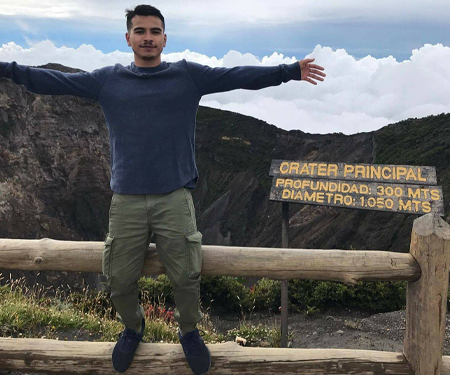 The Mountain Climber
The Mountain Climber
First-Generation Chicano grad student Carl Silva does not give up easily
San Diego native and first-generation Chicano college student Carl Silva plans to graduate this summer with his M.A. in rhetoric and writing. Carl is a proponent of diversity as well as first-generation and transfer student awareness. He says it’s crucial to keep in mind representation of these identities: “It is a lot easier for students to imagine themselves in a particular job or career field when they see people like themselves holding them.” He envisions himself as the face that others like himself can and will see in academia. As he looks forward to potential careers, his ultimate goal is returning to San Diego City College where his college path first began and becoming a professor. He stressed, “I want to help people who come from the same background as myself.”
During his three years at San Diego Community College, Carl received his Associate’s degree in elementary teaching preparation as well as an Associate’s in honors communication studies. Carl transferred to California State University Long Beach, where he completed a BA in Communication Studies with an emphasis on interpersonal and organizational communication. On his academic interests, Carl said, “I always had a taste for communication/rhetoric and I eventually gravitated back into it for my grad program.” After wrapping up his BA at Long Beach, he entered San Diego State University within the Homeland Security Program. However, a year in the program and a gradual realization later, Carl had a slight change of heart and switched programs. It was in HSEC 690--otherwise known as Seminar in Ideology, Discourse, and Conflict--taught by Dr. Cezary Ornatowski of the rhetoric and writing studies department where Carl had his “ah ha!” moment, connecting various mentors’ backgrounds in rhetoric with the topics of the course. Shortly after taking Ornatowski’s course, Carl became a rhetoric and writing studies student and selected an emphasis in the teaching track. Carl taught his first RWS 200 course in the spring semester and worked as a writing mentor (previously known as a writing fellow) for three semesters prior.
Looking back, Carl’s college pursuit began when he started 5th grade. Carl attended KIPP Adelante Preparatory Academy in San Diego from 5th through 8th grade. The Knowledge is Power Program (KIPP) is a national network of middle schools that support their alumni through high school and into college, and KIPP Adelante is one of many tuition-free college preparatory charter public middle schools across the country. KIPP Adelante and its greater Southern California branch marshal counselors and advisors to support alumni through high school into college as well as into careers post-college. And, thanks to Carl and a few peers, the extensive alumni network now has an online platform that launched this past summer which allows for fellow KIPP-sters, what graduates of KIPP middle schools are nicknamed, to collaborate and support each others’ academic journeys.
Carl expressed immense gratitude for the doors that KIPP Adelante opened: “Being a first-generation student, I didn’t really have . . . guidance and nobody was like pushing me and motivating me to go to school,” he said. “So, when I went to that school, their whole theme and environment was to climb the mountain into college. They had . . . murals on the stairs, the hallways, of kids climbing literal mountains to college.” This image lingers in Carl’s mind as he reflects on his academic journey, sometimes wondering if a gap year here or there might have relieved some of his burn out. Still, Carl looks forward to the future that awaits him as he continues applying for teaching positions, one with a KIPP affiliated school on the East coast and a few dispersed around the Southern California area.
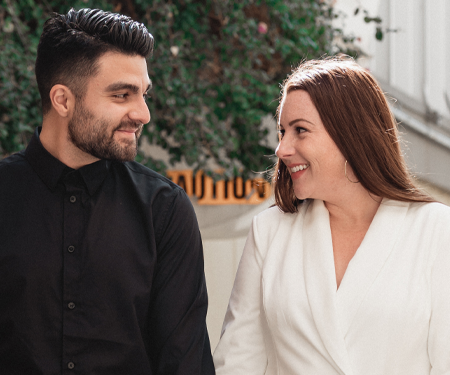 The Balancing Act
The Balancing Act
Grad Jenna Levasseur manages full-time work, part-time learning, and a wedding
After the tumult of 2020, things still haven’t calmed down for full-time employee and graduate student Jenna Levasseur. As soon as the clock strikes 4:30 p.m. on a weekday, “I’m RWS part-time student and if I get one moment of peace, then I am trying to be a good partner, trying to plan a wedding, trying to raise this little rescue mutt, all of these other like normal day-to-day hats.” Jenna and her fiancé, Alex, also began planning their wedding at the same time as moving in January of this year, Jenna exclaimed, “which was stupid! We should have really waited until after we moved.” Luckily, she and Alex are only about a six-minute drive from campus now.
Photographers, florists, and bakers, oh my! Jenna has noticed that the majority of people she meets for wedding planning tend toward selling based on the current, most popular items. Jenna shared, “I feel like I’ve had a really, really hard time finding someone that listens to what I’m saying and realizes that I'm not going for just a trend.” Instead, her intended wedding theme is centered in timelessness. To her, this theme entails a few key details: “I really want just muted colors, and I want it to be calm and not visually overwhelming.” She also chose timelessness to avoid any potential regrets; she said, “I don’t want to look at these photos in five minutes and just be like . . . Why did I do that?” To this point, Jenna expressed difficulty locating things that were timeless but is sticking to “less color is more,” including white bridesmaids’ dresses to many people’s disagreement. Still, she will persevere with the support of her doting fiancé.
When Jenna isn’t focused on planning her wedding or being a good partner, she is working for San Diego State University’s own College of Sciences as development coordinator for the past two years. On weekdays, you can find Jenna typing away as she researches potential donors and writes grants, proposals, and gift agreements herself. And it is through this position that Jenna actually discovered Rhetoric and Writing Studies shortly after she started as development coordinator. Beginning with courses for the certificate in Professional Writing, Jenna learned that she was but a few courses away from a MA. She went ahead and applied in Fall 2020—and got in! With only three courses remaining, Jenna is happily looking forward to graduating in spring 2022 with a specialization in Professional Writing.
Before discovering her fondness for fundraising, Jenna began her academic journey at SDSU herself through Compact for Success, in which Sweetwater Union High School District graduates were guaranteed admission to SDSU if they met admission requirements. After two years with the same classmates as high school and an exhausting daily commute, Jenna felt drained and needed a change of place; she transferred to California State University, Northridge (CSUN) and majored in sociology. Upon graduation at CSUN, Jenna immediately returned to San Diego because the greater Los Angeles area was not her cup of tea. Her first summer position post-graduate at the Boys & Girls Club in San Diego initiated Jenna’s love of fundraising and development when she shifted from a hands-on role working with children to a behind-the-scenes role as a development professional. Seeking to expand her experience in development and delve into higher education, Jenna landed at SDSU in the College of Sciences.
Since joining SDSU for a second time, Jenna has grown to love working and learning at SDSU for many reasons, including how “SDSU is like a little city” for her. She reflects on her in-person experiences, “I can go to work. I can go to Trader Joe’s (when it’s open), and get my lunch, and walk around. And then at the end of the day, I can go to my class. And so, it’s just like a little city.” Clearly, she isn’t going anywhere anytime soon. Afterall, she’s got a wedding to plan!
 Department News and Events
Department News and Events
Stay in the know about everything RWS
The summer is officially in full-swing, but here’s a look at a few important features of the spring semester.
- College of Arts & Letters (CAL) Awards for the 2020-2021 Academic Year
- RWS lecturer Carl Fielden received an Excellence in Teaching Award!
- An Excellence in Service Award was given to our very own Jaime Madden!
- We honor our two Spring 2021 retirees, Hedda Fish and Bob Stein. Hedda’s career at San Diego State began with lecturing in the English Department in 1979, prior to the existence of Rhetoric and Writing Studies. Bob began as a graduate student in the RWS Master’s program many moons ago. We thank them both for their service and commitment to the department and our students.
- Congratulations to our new faculty member Dustin Edwards, whose Rhetoric Review article “Digital Rhetoric on a Damaged Planet: Storying Digital Damage as Inventive Response to the Anthropocene” received Honorable Mention for the 2020 Theresa J. Enos 25th Anniversary Award.
- Congratulations to RWS M.A. student Eirein Gaile Harn who received a Master’s Research Scholarship for the 2021–2022 academic year from CAL.
- Eirein Gaile shared, “I’m honored and humbled to receive the Master's Research Scholarship for 2021-22! I'm thankful for the guidance of Dr. Glen McClish, Dr. Jenny Sheppard, and Dr. Kathryn Valentine who continue to be important mentors for me throughout my experience in RWS. My research aims to extend Onomastics (the study of names) into the field of Rhetoric. I will explore names as rhetorical sites of meaning by considering the rhetorical strategies people use to navigate the relationship between their names and their cultural identity. Specifically, I seek to understand the role names play in cultural identity development.”
- While the Rhetoric Society of America student chapter looks forward to shifting to in-person learning again, the E-Board is excited for upcoming events, including Ph.D. application workshops, thesis support workshops, and more. Follow their Instagram account @rsasdsu for updates closer to the start of the fall semester!
- If you’re an undergraduate or graduate student interested in employment opportunities within the RWS department, you can apply to become an RWS Mentor (previously Fellow) or a Writing Center tutor! Find more information about mentoring and tutoring.
Hope you enjoy a well deserved summer of as much rest as you can find. Loop back in sometime during the fall semester for the next newsletter.
Meet the Editors
Graduate Students Nicole and Rachel
Read on to find out more about the co-editors who spearheaded the podcast!

Nicole Golden
Nicole is beginning her second year as a graduate student in the M.A. program in Rhetoric and Writing Studies. After graduating from Occidental College in 2019 with a B.A. in English, Nicole spent her gap year working for a non-profit in Los Angeles where she supported a program dedicated to under-resourced elementary schools and raising students’ reading skills. Nicole returned to school while the pandemic still riddled the country with shut-downs and stay-at-home orders, spending two semesters learning online. She even had the chance to teach an RWS 200 course online when she became a TA in the spring semester.
As Nicole delves into her thesis work this summer, cultural rhetorics informs a study of Japanese American identity. Her personal experience as a mixed-race Japanese American influences her interest in understanding practices undergone by other Japanese American millennials as they articulate and construct their mixed-race identities. With this interest in mind, Nicole plans to continue within academia in pursuit of a Ph.D. in order to expand her cultural knowledge and hopefully teach at the university level. Still, Nicole looks forward to a career centered around the teaching of writing but welcomes whatever opportunities arise as long as her thirst for learning can be quenched.

Rachel Michelle Fernandes
Rachel is a graduate student in the M.A. program in Rhetoric and Writing Studies, entering into her second year, with a focus in multimodal and digital rhetorics. After an accomplished career in film and television production and over a decade in New York City, Rachel decided it was time to prioritize her mental health and return to her West Coast roots. Rachel shifted her focus to arts journalism and podcasting, writing a column for San Diego City Beat called “Thank You for Staring” and recording and editing a podcast series called Psychic Rehab. The podcast chronicled Rachel’s struggles with Bipolar disorder and featured a range of interesting and informative guests to discuss getting rooted in reality and finding common ground—be it with civic engagement, trash cinema, Riot Grrrl feminism, or taking to the open road. After writing a successful California Arts Council grant with the Oceanside Public Library and a local arts organization, Rachel realized how rhetoric could help her further advocate for the agency of her creative community and enrolled in the RWS program
Rachel’s thesis work is taking shape as a digital counter-mapping project which takes a decolonial approach to locating and connecting cultural communities and social movements across the San Diego and Tijuana border region. She seeks to locate and constellate any artist, artist run space, grassroots movement, collective, activist or organization in the region who is actively committed to decolonization and anti-racist practices. She hopes this visual and geographic tool will eventually serve as a useful resource for strengthening community care and mutual aid networks. She looks forward to teaching RWS 100 in the Fall and getting to know the SDSU community IRL!
The Rhetorical Situation
The SDSU Rhetoric & Writing Studies Department
Newsletter and Podcast
 The Personal is Rhetorical
The Personal is Rhetorical
Podcast - Ep. 1
We cordially invite you to take a step back from the computer, give your eyes some
much needed rest, and listen to the first ever RWS podcast! We the editors figured
that, with all the social isolation, zoom fatigue, and distance learning, listening
to a few real conversations with faculty, students, alumni, and staff might be a breath
of fresh air. Get ready to get personal, and rhetorical, with a chorus of voices from
RWS!
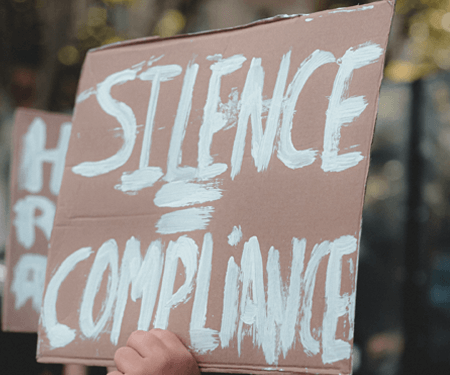 Why Rhetoric Matters Now
Why Rhetoric Matters Now
(more than ever?)
A letter from the Chair
After a memorable year serving as Interim Dean of the College of Arts and Letters (that’s an interesting, but separate story for another time), I’m back as chair of Rhetoric and Writing Studies, my spiritual “hometown.” Fall 2020 was a very challenging semester, obviously, and many of the pandemic-related difficulties we faced then continue to define our efforts in Spring 2021. Nonetheless, I’m extremely proud of our faculty and our staff, who worked with creativity, compassion, and diligence to adapt our pedagogy to virtual space and to help our students improve their writing and critical thinking skills in the face of considerable hardship and uncertainty.
I’m also heartened by the support we provided for one another. Many faculty and staff found themselves in the nearly impossible bind of having to fulfill their formidable RWS responsibilities while simultaneously taking care of infants and toddlers, supervising their children’s online schooling, and tending to their own physical and mental wellbeing. Finding creative ways to help these colleagues manage their competing responsibilities was one of the unexpected pleasures of the semester.
In addition to the pandemic, the surging Black Lives Matter movement that shook the country in 2020 sent needed shockwaves through RWS, and in Fall 2020 we seriously reflected on ways to establish a more consciously focused anti-racist culture in our department. These cultural changes will positively affect our teaching and our grading, as well as our hiring and retention of people of color. We are committed to the goal of establishing a faculty and staff that more closely align with the identities and life experiences of our students. We will reduce race-specific equity gaps—lower grades in writing classes for students of color—that limit the success of the students we should be most concerned with helping. And we will bring down the percentage of students who are earning Ds, Fs, and Withdrawals in our courses, since these low grades take a psychological toll and slow students’ pace toward graduation.
Finally, RWS felt the trauma of an election season like no other, followed by a post-election period unlike any we have experienced in the US since Reconstruction. We have been continually reminded of the role rhetoric plays in the ongoing political drama, both to bring us together and to drive us apart. In their recent “Statement Condemning Insurrectional Rhetoric and Resulting Violence 1/6/21” (for the full statement, see link on our website homepage), the Board of Directors of the Rhetoric Society of America declared,
Words matter, and when they are used they have material consequences. Being with others requires that we use our words, our language. Admittedly, language is unstable and uncertain, but that is precisely why we need rhetoric: to grapple, collectively, with such instability and uncertainty, to make the best cases for our behaviors, actions, institutions, laws, and judgments. Otherwise there is simply violence.
The fact that “words matter” reaffirms the mission of our department. Given the political world we inhabit, teaching and studying rhetoric and writing cannot be more important in 2021. So despite the very real, significant challenges we face, I’m optimistic about RWS’s future teaching, research, and service. Through this newsletter and accompanying podcast, I hope you enjoy learning more about the people who make our departmental mission possible, as well as our inspiring students and alumni.
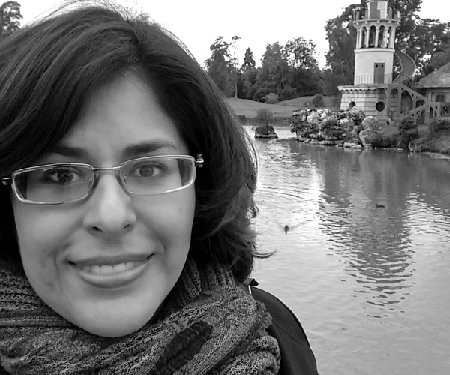 New Faculty Spotlight
New Faculty Spotlight
Dr. Consuelo Salas
Rhetoric and Writing Studies department’s newest member of faculty, assistant professor Dr. Consuelo Salas brings “experience working with students who live in a border space, who are multilingual, who have a variety of different linguistic backgrounds” as well as her academic specialties. Focusing on Border Rhetorics as well as combining rhetoric and food studies, Dr. Salas earned both her MA and PhD from the University of Texas, El Paso (UTEP). “It was an interesting journey,” Dr. Salas laughed as she explained a shift from a pre-med career trajectory to the English department at UTEP and, finally, to the field of rhetoric. After beginning to take English courses while still pursuing a B.A. in a science at UTEP, Dr. Salas recognized her passion for reading and writing and changed majors—against her parents’ wishes, she admitted. With a B.A. in English, young and unsure about job opportunities, Dr. Salas decided to pursue a master’s degree at UTEP where her mentor Dr. Meredith Abarca introduced her to food studies and suggested UTEP’s PhD program in rhetoric and composition. “I entered into my PhD program with this hope of marrying the two fields of rhetoric and food studies,” Dr. Salas said, “that was kind of my driving force.”
A somewhat lesser known but growing field, food studies is quite a broad area of study that follows food within society, including its production, consumption, distribution, and other practices as well as cultural aspects. Dr. Salas explained that food studies involves “looking at this very micro moment in our daily lives, and then trying to understand how it became the practice that it is.” Once she learned about food studies, Dr. Salas realized that it was “a kind of an ontological lens through which [she] saw a lot of different things.” Bridging rhetoric and food studies in her ongoing project, Dr. Salas is currently working on a monograph that examines how food and identity become apparent through Mexican cultural imagery. According to Dr. Salas, the book is “looking at what visuals are paired with Mexican food stuffs and how and why have those images become markers of Mexican and/or Mexican foods.”
Dr. Salas is looking forward to her second semester in the RWS department. “I feel just very fortunate that I'm joining the department at such a serendipitous moment. I welcome the opportunity to be involved in a variety of different changes to kind of help better address the needs of our students,” she said. She also expressed deep appreciation for the effort her students put into her course during the Fall 2020 semester despite the continued challenges of learning online and the political tumult that the election presented. She awaits teaching in-person at SDSU but is excited to continue learning how to teach more effectively throughout the Spring. Although Dr. Salas shared that she was not entirely new to teaching online—having taught entirely asynchronous courses during graduate school in El Paso—she still felt quite unfamiliar with online teaching. She stated, “That's just the nature of teaching. You continuously improve . . . each semester that you go.” In addition to teaching, Dr. Salas has also partnered with Dr. Shepherd as co-faculty advisor for the student chapter of the Rhetoric Society of America. Just last December, she and Dr. Shepherd led a workshop for graduate students to learn more about PhDs in rhetoric and composition.
As a scholar of border regions who grew up one herself, Dr. Salas is deeply familiar with the uniqueness of border regions from not only other spaces but each other. She says there is a “knowing and being that is specific to border regions.” She describes it as “kind of this two worlds space.” As she thinks about eventually making the move from her current home-base in North Carolina to San Diego, Dr. Salas shared, “I'm very much looking forward to just getting to know the community in San Diego. I know that there is a history of doing really good work there with border issues.” She also noted, “I think it's important for folks who teach in a community to be of the community and that can look a number of different ways, but I very much welcome that.” Thus, with a new and an old border region in mind, Dr. Salas is excited to immerse herself in the unique space and community that San Diego and SDSU have to offer.
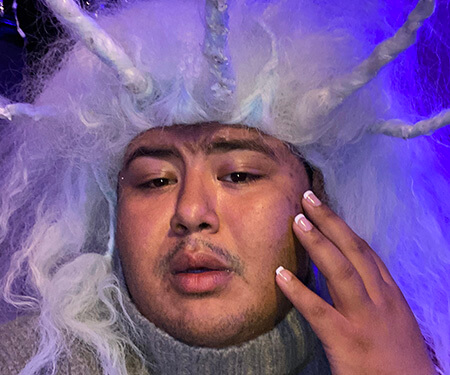 Feelings are Facts
Feelings are Facts
Alumnus Ruby Mendoza
“Be disruptive.” This is the advice that recent Rhetoric and Writing Studies alum Ruben “Ruby” Mendoza gives to current undergraduate and graduate students alike. Although it might sound odd at first, this advice pushed Ruby to get where they are now: a doctoral candidate at one of the most prestigious PhD programs in the field of rhetoric. Studying queer, trans, and feminist rhetoric as well as writing program administration, Ruby joined Michigan State Univeristy’s (MSU) Writing, Rhetoric, and American Culture doctoral program in Fall 2020. At MSU, Ruby works as a Graduate Writing Consultant and as LBGT Resource Center Liaison on campus while they eagerly await teaching in the next academic year.
Before beginning their journey as a PhD candidate, Ruby earned a BA in English Studies from California State University, Chico and their MA in Rhetoric and Writing Studies (Specialization in the Teaching of Writing) from San Diego State University. When asked about their experience at SDSU, Ruby admitted, “I feel like I was a pain in the ass.” However comical this may seem, as they explained, it became clear that Ruby truly meant it but did not regret it.
They described how the predominantly white faculty made suggestions and provided advice centered around the typical path that students take, but Ruby went into graduate school with a different mindset than most students. Instead of entering graduate school to discover who they are, as many students have done, Ruby shared, “I kind of had a sense of who I was because I was approaching 30. I knew that I wanted to teach, and I knew I wanted to do things that intersected with my life.” With this conviction in mind, Ruby forged a path for themself that met their needs and interests while at SDSU.
Before beginning their journey as a PhD candidate, Ruby earned a BA in English Studies from California State University, Chico and their MA in Rhetoric and Writing Studies (Specialization in the Teaching of Writing) from San Diego State University. When asked about their experience at SDSU, Ruby admitted, “I feel like I was a pain in the ass.” However comical this may seem, as they explained, it became clear that Ruby truly meant it but did not regret it. They described how the predominantly white faculty made suggestions and provided advice centered around the typical path that students take, but Ruby went into graduate school with a different mindset than most students. Instead of entering graduate school to discover who they are, as many students have done, Ruby shared, “I kind of had a sense of who I was because I was approaching 30. I knew that I wanted to teach, and I knew I wanted to do things that intersected with my life.” With this conviction in mind, Ruby forged a path for themself that met their needs and interests while at SDSU.
Rather than simply following the conventional route, Ruby challenged the curriculum taught to undergraduates and discovered that faculty were incredibly supportive of their individual pursuits. According to Ruby, the outcome of their firm resolve in the things they believed altered the course of their life: at SDSU, “I really was able to realize how to take charge of my academic career and my choices. And, I do the same thing here at MSU.” Ruby continued, “if I hold back, I'm risking someone's life and their educational career, and I'm not going to have these inequalities and gaps where students of color are quitting--and especially LGBTQ students--because we failed to incorporate things that are literally life-saving.” Speaking from their lived experience, Ruby added, “I have to do this work because I don't want someone who, like me, has to struggle just to get here . . . thinking that school is going to be the way to escape homelessness and drug abuse.”
Ruby holds their personal experiences close to their heart. However difficult life has been at times, Ruby is grateful for the resilience they learned and the many support systems and resources that helped them get to where they are now. They strive to continue in academia in order to show others across the gender and identity spectrums that there is space for people who feel uninvited by the hegemonic groups and identities we traditionally see in academia. “I'm here to fill those gaps,” they said. And, as they look forward to publishing in Dr. Jacqueline Rhodes’ upcoming book The Queer Handbook, Ruby is already “fill[ing] those gaps” as they make room for academia to better reflect what the rest of the world really looks like. Ruby said, “I get to do work that I believe in. I'm so excited.”
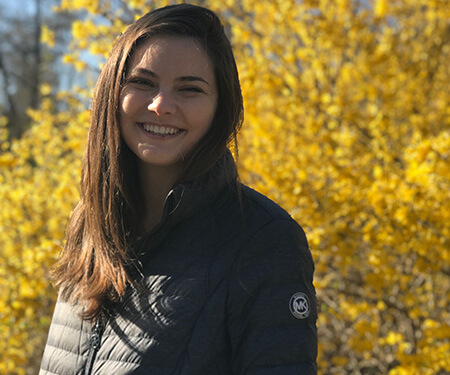 Mission Statement
Mission Statement
Alum Clara Cushing carries her love of education to the world of professional writing
Class of 2020 rhetoric and writing studies alum, Clara Cushing navigated not only the conclusion of her Master’s with the shift to online learning but even landed a position at a small nonprofit during the COVID-19 outbreak. Having graduated in May 2020 and completed her thesis in August 2020, Clara shared initial concerns for job prospects, “When the pandemic hit, I was sort of giving up on getting hired by a nonprofit. So, I really lucked out with this job.” Since October, Clara has been working as a grant writer and partner relationship manager at Ignited, a Silicon Valley-based nonprofit dedicated to transforming STEM education. With only five full-time staff members including Clara, Ignited connects educators with industry through a summer fellowship program that places teachers at various companies. Ignited’s mission is to improve STEM education through giving teachers a chance to re-immerse themselves in fields of interest, bringing renewed enthusiasm to their teaching to instill a similar excitement within their students. For Clara, this mission is really important because of her love of education and nonprofits. Moreover, Ignited’s mission appeals to her because, as she noted, “they’re connecting academia and the professional world. And that's something that is really important to me.”
After completing her undergraduate degree in English, Clara spent a few years teaching and working before she decided to pursue a master’s degree. She taught English in the Czech Republic for a year as well as worked various internships, including communications and magazine writing in Washington, DC. Following a writing-oriented career post-undergrad, Clara said, “I had two years of . . . other jobs where I wasn't writing as much and I really wanted to go back.” Gradually, Clara’s time away from writing showed her that she wanted to return to school and that SDSU’s RWS program would allow her to begin working in the field at the same time that she learned more about professional writing. She said that she hoped to “break into professional writing” but expressed how the paradox of having experience to get experience makes it “kind of hard to break into certain professional writing.”
Clara chose San Diego State’s RWS program specifically because it focuses on the nexus of academia and industry. She sought this degree in order to improve her writing skills and give her an edge into professional writing. Her biggest takeaway from the degree was improving her writing through rigorous practice and great feedback from her professors. Moreover, she appreciates how a degree in rhetoric allowed her to gain a different awareness of the audience than she thinks that the study of English alone provided her. Instead of deciding on one track versus the other, Clara created a schedule centered around her interests and chose the general MA route in RWS. One of her favorite courses from her time at SDSU, Professor Ornatowski’s Homeland Security class focused on ideology, discourse, and conflict within different cultures. Clara remembers how this course recontextualized her sense of rhetoric thanks to the topics and what Ornatowski himself brings to light: “It was just really interesting to see the theories that we were talking about and how rhetoric works. I thought that the rhetoric of conflict was super fascinating to learn about and he has really, really interesting perspectives too.” For Clara, the insights and conversations she shared with faculty were the best moments. She recalls beginning her thesis and realizing she didn’t know how to combine her four interests until working with Dr. Kathryn Valentine, who helped Clara figure out how all four ideas intersected.
Clara is very grateful for her time at SDSU because of the relationships she made, the real-world experience she gained, and the versatility of the degree. For current and future students alike, Clara shares a helpful bit of advice, “Take advantage of relationships with the faculty because they're all really knowledgeable. They all really care about students. And, I think that's really special about the program.” Especially in our current economic environment, Clara expressed how rhetoric in general opens doors for many careers. “You don't need to know necessarily exactly what you want to do,” she began, “there's so many different directions you can go with [rhetoric]. And, I think that the program really sets you up to go in a lot of those different directions.”
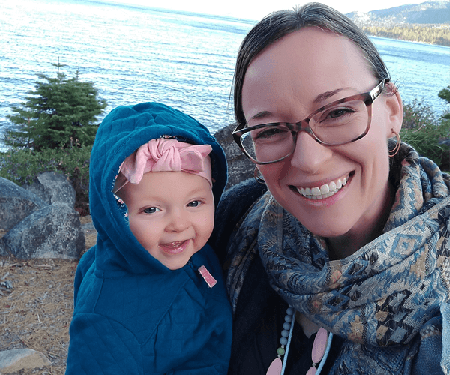 For the Love of Learning
For the Love of Learning
For grad student Catherine Hood it’s not about the degree
From Cameroon to a classical education, graduate student Catherine Hood is on a different path than most. Catherine started taking courses in the RWS department during the fall semester of 2016 but ended up moving to Los Angeles County that spring. Then it wasn’t until fall 2020, when the program officially shifted online, that Catherine had the serendipitous opportunity to continue where she had left off. Currently located in the Sacramento area with her husband and toddler, Catherine will continue in the program this semester while she is not only expecting her second child but working full-time. Catherine chose to enroll at SDSU back in 2016 not for an advanced degree or pay-raise but to learn as much as she could, to improve herself as a person and an educator. And, although it is unclear how long things will continue online and allow her to take courses, Catherine is certain about “taking it a semester at a time” and “being super grateful for any courses” she is able to.
Earning her teaching credential in 2009 from Biola University, Catherine majored in liberal studies so that she could teach elementary education. Fresh out of college during a deep economic crisis, Catherine explained, “It was 2009. It was the middle of the recession. You couldn't even get a substitute teaching job.” Instead, Catherine found herself moving to Cameroon for two years. While living there, Catherine worked as a private tutor for a missionary family. She remembered, “that was my first experience full-time teaching. . . . It just kind of fell in my lap, and I went for it.” Recalling her time in Central Africa, she reiterated how grateful she felt for the family she lived with, the teaching experience she gained, and her discoveries about language and communication while inhabiting such a culturally and linguistically diverse space. In fact, although Cameroon’s official languages are English and French, many other languages are regionally recognized, including Cameroonian Pidgin English and Camfranglais, a portmanteau blending the French adjectives camerounais, français, and anglais. Speaking from experience, Catherine chuckled, half-joking and half-serious, “because people who speak 200 different languages need to find some kind of common communication style and grammatical English,” new languages were born out of necessity.
In 2011, Catherine returned to the U.S. and began a full-time teaching position at a small private elementary school in Orange County that utilized a classical approach to education using the progymnasmata method. Created by the ancient rhetoricians such as Aphthonius, the progymnasmata consists of a thoughtfully ordered pedagogical design that teaches writing and speaking through a series of increasingly complex exercises. For Catherine, the progymnasmata was mostly a mystery until she moved to San Diego to teach at another classical school; it was there that she truly understood the efficacy of the progymnasmata method. A colleague who had worked his way through the RWS Master Program himself showed Catherine the way: “He saw it from beginning to end, and he really actually saw how teaching it with fidelity through the whole program, it teaches everyone . . . the communication and writing skills they need to be effective communicators.” It was then that she sought to join SDSU’s RWS program.
Catherine taught 6th grade using the progymnasmata for several years but eventually settled into her current role as a curriculum educator for the “progym method,” as her workplaces have coined it. As a mentor teacher at John Adams Academy, a group of charter schools that teaches from the progym method, Catherine explained her duties: “I get to coach and train teachers, and examine our curriculum, and train teachers in curriculum.” Having taken RWS 601: The History of Rhetoric with Professor McClish in Fall 2020, Catherine expressed how much she benefited from the program: “I get a fuller view of how the progym developed, where it came from. Reading Apththonius in context is super helpful.” She relates with the teachers she mentors who don’t yet understand the rewards of the progym method, having been in their shoes. But, thanks to her coursework at SDSU, she expressed contentment toward being able to better equip teachers; to “just have faith in it,” Catherine said, is the first necessary step.
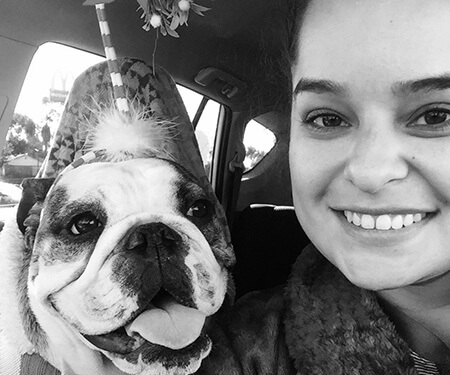 Behind the Scenes
Behind the Scenes
Claudia Gracio works hard to keep all the parts moving
Ever wondered about what goes into helping the largest academic department at SDSU run smoothly? There is a great deal more than meets the eye. And one person who devotes hard work and energy toward the myriad of administrative tasks for the RWS Department to run as flawlessly online as it does in person is Claudia Gracio. She has been one of the department's two administrative coordinators since September 2017. As an administrative coordinator alongside Karen Keene, who handles the money and budgets, Claudia works on ensuring that grading is completed on time, scheduling course times and locations (when we were on-campus), Canvas troubleshooting for professors, and much more. An SDSU graduate in 2013, Claudia explained her role and the department through a useful metaphor: “It's like a movie. . . . People only see the movie and the picture. People don't see the amount of people it takes to make that movie.” It is only as a staff member now that Claudia realized just how much is necessary for a department to work as she supports a majority of things that students and professors alike often take for granted but are integral pieces that help the department function in the day-to-day as well as each semester.
In the years leading to joining the RWS Department, Claudia’s mother was struggling with cancer while Claudia balanced a new position in a local school district and the 24/7 caregiver to her mother. Unfortunately, Claudia’s mother passed away in 2017. That same year, Claudia was let go due to the additional time-off that came with caring for her mother as well as because her probationary period drew to a close. In what Claudia described as “the lowest point in [my] life,” a spur-of-the-moment decision to apply to SDSU served as a pivotal shift in the seemingly downward trajectory of Claudia’s life. “It was one of the best things that happened to me that year,” she says about getting hired by the department. Since that especially tough year, Claudia has enjoyed the friendly and motivated environment within the department. She admires the people she works with because of their commitment to the students and their needs. Claudia said, “It's always about the student. And, I see that. I genuinely see that with the people I work with; it's not just a job.” The dedicated staff and students around her encourage Claudia to do her best to help the department run as smoothly as possible each semester.
Since shifting to working from home during the pandemic, Claudia sees the change as both a benefit and a drawback. Claudia mentioned one aspect of in-person that she longs for. “I do miss walking to Starbucks,” she said as she laughed that it’s only a few feet away from her desk. Other than this, she said that she misses “walking into people's offices and people walking into our office and having that one-on-one, having that human connection.” Although working from home removes the crucial one-on-one conversations Claudia enjoys, she also admits, “the flexibility's been kind of nice,” especially since Claudia and her husband welcomed a baby boy in 2020. She and her husband, who also works full-time, have been balancing the care of their newborn as well as Claudia’s aging father. Claudia recalls “juggling [a] crying baby and having to be in a meeting” many times, sometimes having her son attend meetings with her. Luckily, working from home has also meant that Claudia and her husband are both able to share their son’s milestones, including his first steps. Aside from her duties for the department and her busy home life, Claudia has also found time to take a sociology course at SDSU and still have time to cook, one of her favorite activities.
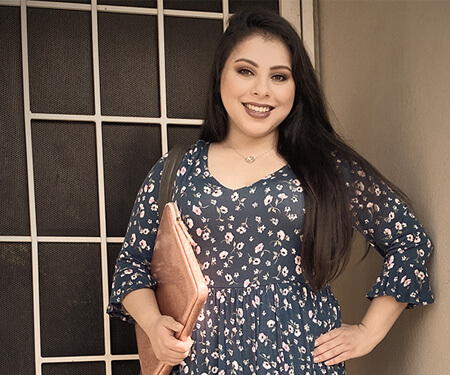 Born to Teach
Born to Teach
For undergraduate Rebecca Cudal, education is in her blood
“Here we are at zoom university,” current undergraduate student Rebecca Cudal jokes. As her final semester at San Diego State begins, it certainly looks unlike what many might imagine for the last few months of college. For Rebecca in particular, it feels especially odd since she can see campus while she attends online classes and works as a fellow from home. In fact, it seems as though almost her entire life has been spent preparing for SDSU. Rebecca went to preschool across the street from Campanile and both of her parents are SDSU alumni. Everyone in her nuclear family teaches. Her mom teaches preschool, while her dad and older brother both teach high school. And, Rebecca has been a writing fellow since her second semester at SDSU. Inspired by her family of educators as well as fellowing, Rebecca’s ultimate goal is to become a professor at a four-year university. In particular, Rebecca is interested in the teaching of writing, particularly to Latinx youth. These interests are informed by her teaching experiences as well as her parents’ bilingualism.
One of the most formative parts of finding her career interests, Rebecca had the opportunity to serve as a writing fellow for the Office of Educational Opportunity Programs & Ethnic Affairs’ (EOP) Summer Bridge Program in 2019. This five-week transitional program aims to provide a select group of incoming SDSU first-years a glimpse into college education. According to Rebecca, a majority of the students were first-generation as well as Latinx. But there was one person in particular who showed Rebecca why she enjoys tutoring and working with Latinx students. This student approached Rebecca for support after expressing discomfort with writing in English. Rebecca recalled how she reacted to the situation: she admitted that she is not fully bilingual herself but worked with the student to translate from Spanish to English. Reflecting on this experience, Rebecca said that the student knew much more than they expected and this moment led Rebecca toward an important realization: “I want students to stop second guessing themselves and feel like they are confident writers” who have support from the people around them.
Rebecca admires her parents deeply: her father teaches American literature through the lens of a Latino man and her mother teaches preschool “because she didn't want the students to go through what she went through.” Rebecca grew up hearing stories about her parents’ linguistic oppression growing up in San Diego; “[it] really affected me,” she said. Rebecca shared a telling example: her mother told her stories about attending SDSU in the early 1970s where she was often the only Hispanic student in a class. “Seeing that shift from just my mother’s generation to my generation now is just incredible,” Rebecca said. Currently, SDSU is a Hispanic serving institution. Despite adversity they faced as first-generation, bilingual students, Rebecca’s parents graduated with honors and successfully stayed on the Dean’s List every semester of their undergraduate careers. Her parents’ and her students’ powerful stories and diversity help Rebecca see that she can and will make a difference through teaching. In Rebecca’s words, “Representation matters.”
 Department News and Events
Department News and Events
Stay in the know about everything RWS
The spring semester is off to a busy start! We at RWS have a few additional resources to help you reach your academic goals and engage with the community, despite being stuck at home.
- Are you an upper division undergraduate or graduate student looking to make a difference
in a lower division student’s life? Do you learn best when teaching others? Well,
the Rhetoric and Writing Fellows program is hiring! Earn some extra income while assisting
in the learning process of others. Reach out to Lea Baker, RWS Writing Fellows Program
Assistant Coordinator, to find out more! [email protected].
- Are you interested in networking with other rhetoric scholars and making connections
to further your academic interests in the field? Consider joining the Rhetoric Society
of America’s SDSU student chapter! The RSA is hosting several upcoming, in depth workshops
on applying for the MA RWS program and Ph.D. programs. They are also hosting upcoming
talks as well as other educational and networking events. For more information email
[email protected] and follow the Instagram account @rsasdsu.
- For students looking for career guidance from RWS alumni, consider popping into the
alumni panel this month: RWS Alumni Career Panel on Friday, Feb. 19, 3-4:30 p.m.
- For anyone interested in learning more about varying perspectives on rhetoric and
pedagogy, as well as how the field is evolving to be more inclusive, check out these
two upcoming talks this semester:
- Dr. Molefi Kete Asante’s Diverse Perspectives: The Afrocentric Origins of Classical Rhetorical Theory on Thursday, March 4, 11–11:50 a.m.
- Dr. Robert P. Robinson’s Culturally Sustaining Pedagogy in RWS: The Personal as Political Through Texts and
Contexts on Wednesday, March 10 at noon
- Lastly, we have an important reminder for students and faculty alike. Your mental health is extremely important! Make sure to reach out to us for assistance with any of your academic needs. No problem is unsolvable with good communication! For additional support for any mental health concerns, do not hesitate to visit SDSU’s Counseling and Psychological Services page for a list of resources.
Be sure to check back toward the end of the semester for more department news and announcements and have a happy, healthy, and productive spring!
Chair's Message
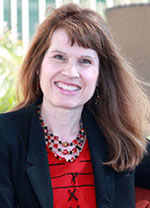 As I near the close of my third year, I would like to take this time to thank you
all. I am fortunate to work with such excellent colleagues. You form the heart of
this huge and complex department and are the ones who truly keep it running so well.
We also have wonderful graduate and undergraduate students who inspire me with their
energy and fascinating ideas and projects. I don’t mean to suggest that the last
three years haven’t been without significant challenges. However, the dedication,
generosity, and tenacity of the RWS community has helped to sustain me through those
times.
As I near the close of my third year, I would like to take this time to thank you
all. I am fortunate to work with such excellent colleagues. You form the heart of
this huge and complex department and are the ones who truly keep it running so well.
We also have wonderful graduate and undergraduate students who inspire me with their
energy and fascinating ideas and projects. I don’t mean to suggest that the last
three years haven’t been without significant challenges. However, the dedication,
generosity, and tenacity of the RWS community has helped to sustain me through those
times.
Unfortunately, by the start of Fall Semester 2020, we will have said goodbye to several retiring colleagues: Adriana Groza, Karl Kline, Peter Manley, James Towner, John Vanderpot, and Julie Williams. All of you have contributed so much to this department, with several of you being integral to its early growth and development. I want you all to know how deeply appreciative I am of all of your efforts. Congratulations on your retirement!
In addition, during Fall Semester 2020, Richard Boyd will enter the Faculty Early Retirement Program. Fortunately, Richard will still teach RWS 609 for us, but his teaching load will be significantly lighter. Richard has been a terrific colleague and a mentor, and we are fortunate that he will still be part of our department. His sense of humor and knowledge of Netflix shows are something I will always treasure!
While such changes are difficult for our RWS community, we also have positives in our future. This year, RWS was involved in two searches, one for an Assistant Professor of Border Rhetorics for our department and one for an Assistant Professor of Upper Division Writing at SDSU Imperial Valley. Dr. Consuelo Carr Salas was selected for the Border Rhetorics position and will join our department in August. Currently an Assistant Professor of English in Writing Studies at the University of North Carolina at Charlotte, Dr. Salas specializes in cultural rhetoric, visual rhetoric, and food. In 2017, her co-edited collection, Latin@s’ Presence in the Food Industry: Changing How We Think About Food (2016), University of Arkansas Press, was selected by Gourmand World Cookbook for the award of 3rd place for “Best Book in the World” in the category of professionals. At Imperial Valley, Lucas Corcoran, who completed his Ph.D. in September 2019 at CUNY Graduate Center, was hired. Dr. Corcoran’s research and teaching specializations include rhetorical theory, translingualism, cultural rhetorics, border and Latinx rhetorics, and anti-racist writing pedagogies. Dr. Corcoran will be the first RWS hire for Imperial Valley, and his position is considered a joint hire, so there might be an opportunity for him to teach a class on our campus. We are excited to welcome two new faculty members to the RWS community!
In our search, I would like to commend the efforts of Kathryn Valentine, who chaired
the search. Kathryn’s organizational skills and close attention to details were integral
to making this a successful search. I also would like to acknowledge the work of
Chris Werry, who also was a member of the search committee. Chris was incredibly
generous with his time in reading and reviewing files and in interviewing candidates.
Finally, I would like to thank all of you who participated in the on-campus interview
for both candidates. I know the first few weeks of the term are hectic. I appreciate
you taking the time to meet with the candidates.
I would also like to acknowledge the work of all of those involved in our different
programs: Fast/Stretch, Lower Division Writing, Undergraduate Major, ESL Program,
Professional Writing, Business Writing, Graduate Program, Fellows Program, and the
Writing Center.
I would like to take a moment to thank our incredibly efficient and friendly office
staff: Matthew Gantos, Claudia Gracio, and Karen Keene. Every day, I am so appreciative
of all that you do to keep our department running smoothly. Although our department
is enormous, you help to make it feel warm and welcoming for faculty and students
alike. Although not technically staff, I also would like to commend the efforts of
our schedulers, Jamie Madden and Siobhan White. I always am amazed by how they manage
the details of our gigantic course schedule, which included more than 300 classes
during Fall 2020! I also want to acknowledge the efforts of so many others who do
so much for this department.
In addition, I would like to extend a special thank you to Clara Cushing, who has
done another outstanding job producing the RWS newsletter!
In closing, I want to thank you all for working with me as the chair. I couldn’t
have asked for better colleagues. It has been an honor to serve you!
Fall Conference

MA students Ruben Mendoza (left), Clara Cushing (center), and Michael Cline (right) present their research at the fall conference.
Second-year MA students Michael Cline, Ruben Mendoza, and Clara Cushing presented their research at the Fall Conference on Pedagogy and Research. Michael Cline’s presentation, “Populist Political Parties of Europe: An Examination of Visual and Digital Rhetoric within a New Political Movement,” analyzes the rise of right-wing populist parties in Europe over the last decade. Focusing on three case studies in Sweden, the Netherlands, and Germany, Michael examines how the parties use new and social media to establish the ethos of their party and political beliefs as well as to establish the ethos of individual party leaders.
Ruben Mendoza’s presentation highlighted research findings for their thesis, “Trans and Gender Non-conforming Bodies: Queering and Redefining Drag Spaces.” Ruben’s project analyzes queer drag activist Hollow Eve, a poststructuralist non-binary queer artist who disrupts traditional drag culture. Ruben articulates how Hollow Eve disidentifies against popular drag ideology and uses their performative body as a tool to argue to audiences through live and digital spaces.
Clara Cushing also presented research on her thesis, titled “Old as Time: Circulation
of Gender Conceptions in Beauty and the Beast Tales.” Using circulation theory and
feminist criticism, Clara traces conceptions of gender in one tale’s circulation among
cultures and over time. Specifically, she focuses on how rhetorical portrayals of
the gender of human bride and animal bridegroom transform in the 2nd Century Roman
tale, “Cupid and Psyche,” the eighteenth-century French story La Belle et la Bête, and the contemporary live-action Disney film, Beauty and the Beast.
Distinguished Alum: Jaime Fleres
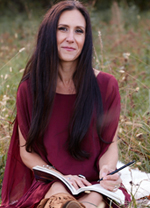 Former RWS MA graduate Jaime Fleres is being honored as a Distinguished Alum for her
work around gender empowerment at the Women’s Studies Gender and Social Justice Festival
on April 25, 2020. After working as a professional writer for 15 years and as a teacher
of writing at SDSU and in Minnesota, Jaime took a hiatus from teaching in 2013 to
mother her newborn daughter, write and publish her first book—Birth Your Story—and support women through childbearing as a doula and medicine woman. Her book Birth Your Story celebrates mothers’ stories of birth, rites of passage, motherhood, and life.
Former RWS MA graduate Jaime Fleres is being honored as a Distinguished Alum for her
work around gender empowerment at the Women’s Studies Gender and Social Justice Festival
on April 25, 2020. After working as a professional writer for 15 years and as a teacher
of writing at SDSU and in Minnesota, Jaime took a hiatus from teaching in 2013 to
mother her newborn daughter, write and publish her first book—Birth Your Story—and support women through childbearing as a doula and medicine woman. Her book Birth Your Story celebrates mothers’ stories of birth, rites of passage, motherhood, and life.
Beyond her book, Jaime is committed to championing the voices, stories, and lives
of women in a multitude of ways. She is a book coach and editor for women writing
memoir and non-fiction about self-empowerment, spirituality, embodiment, the female
experience in our culture, and gender and cultural identity. She also works as an
international teacher of Qoya, a women’s embodied movement practice that teaches women
to source their power and agency from within and from the wisdom of their bodies.
Jaime gives a portion of her earnings from her writing and healing businesses to nonprofits
dedicated to empowering women’s lives and the good of the planet.
New RWS Graduate Students
In Fall 2019, the RWS Department welcomed a new cohort of MA students. Welcome to
Lorise (Rise) Diamond, Carl Silva, Katie Coyle, Rebecca Politzer, and Noveed Safipour!
Distinguished RWS Graduate Student: Lorise “Rise” Diamond
 First-year RWS graduate student Lorise “Rise” Diamond received an invitation to the
64th Session of the Commission on the Status of Women (SW64/Beijing+25), scheduled
March 10-13 in New York. She is slated to introduce the topic of “Transformation
in Institutions of Higher Education,” a collaborative side event (breakout session),
partnered with South Africa’s Commission on Gender Equality, three Western Cape universities
(UCT, Stellenbosch, Western Cape), and five technical and vocational education and
training colleges (Northlink, Falsebay, West Coast, Boland, and Cape College) located
in the Western Cape Province.
First-year RWS graduate student Lorise “Rise” Diamond received an invitation to the
64th Session of the Commission on the Status of Women (SW64/Beijing+25), scheduled
March 10-13 in New York. She is slated to introduce the topic of “Transformation
in Institutions of Higher Education,” a collaborative side event (breakout session),
partnered with South Africa’s Commission on Gender Equality, three Western Cape universities
(UCT, Stellenbosch, Western Cape), and five technical and vocational education and
training colleges (Northlink, Falsebay, West Coast, Boland, and Cape College) located
in the Western Cape Province.
Recognizing that universities represent a microcosm of the world, Lorise will represent San Diego State University’s Rhetoric and Writing Studies Department as panelists and participants evaluate progressive rhetorical approaches, like those contained in the UN Women’s “Heforshe” discourse, to discern how “safe, creative and inclusive” spaces on campus are constituted through espousing gender equality. Furthermore, the side event examines methods of support fused by individuals living within the intersections of gender and feminism, sharing experiences, and imparting best practices to move like-minded institutions and women forward.
Unfortunately, the side event was canceled because of the recent health concerns related
to the Coronavirus, but we wanted to recognize Rise’s invitation to such a prestigious
event.
Faculty Profiles
Dr. Cezar Ornatowski
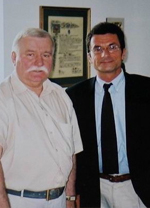
Dr. Ornatowski (right) with the former Polish president and Solidarity Union leader Lech Walesa (left).
Growing up in communist Poland, Dr. Cezar Ornatowski’s “first” language chronologically was English; his mother was an English professor and had a collection of English books, including early readers such as “Little Golden Books” and Mother Goose. Dr. Ornatowski always had a love for the English language. It was part of his identity while living in a country where few people spoke English, and it “constituted a connection to the wider world, a ‘window’ out of the grey reality of a communist country walled off behind the Iron Curtain.”
Dr. Ornatowski originally wanted to study engineering after high school, but he applied for English Philology at the last minute instead. Over the years, his interests shifted from literature toward linguistics, discourse analysis, and rhetoric; he received his MA in English from Boston College and his Ph.D. in English/American Literature and Rhetoric from UCSD. While still working on his doctorate, he began lecturing in the SDSU English Department in 1982. He was one of the four tenured/tenure-track founding members of the RWS Department, which he then joined when it was created in 1993.
Of the many classes he has taught, he enjoys the graduate level introductions to rhetorical analysis, modern rhetoric, and visual rhetoric (involving photography, art, and film). He also enjoys the seminar he offers in the Homeland Security program, HSEC 690 Ideology, Discourse, and Conflict. The course, which focuses on propaganda and influences, “continues to be a great learning experience,” he says. “It got me into a whole new area of rhetoric: conflict, warfare, terrorism, national security, and international politics.” As an educator, Dr. Ornatowski tries to teach according to his personality and predilections; he aims to be “intellectually honest, intellectually challenging, open, encouraging” in addition to trying to build upon what students bring in—not only for the benefit of the class as a whole but also to help individual students pursue their interests and goals.
During his time at SDSU, Dr. Ornatowski has taken advantage of the opportunity to become involved with the California State University—one of the largest public universities in the country—on a system level to gain a “broader sense of higher education.” For the past 12 years, he has served on the Fiscal and Governmental Affairs Committee as SDSU’s representative on the statewide Academic Senate. Challenges he has noticed both in the classroom and on the committee are related to the “broader phenomena that have been affecting the character of the American university since the 1970s: more public oversight and legislative interference, more public responsibility and demands to go with it,” including the strain of addressing multiple growing social issues, more stringent demands for research, and budget issues.
Whereas some universities have somewhat strict guidelines regarding what faculty can teach and publish, SDSU offers the freedom to choose what classes to create and teach and what research to pursue. Dr. Ornatowski has enjoyed this freedom to follow his ever-evolving interests. He points to a study that demonstrated the interests of prominent thinkers throughout history changed radically around every ten years. He has found this to be true for himself as the questions and concerns underlying his work have become broader and more philosophical over time. His dissertation was an “ethnography of how aircraft technology was developed and negotiated in a multinational aerospace company,” and his interests have spanned “from the rhetoric of totalitarianism and political transformation to architecture and urban planning, surveillance, and parliamentary debate.”
He prefers to work on a few projects at once, as he finds that they “feed into each other intellectually, despite seeming differences.” Last year, he finished a chapter on democratization in the Polish parliament from 1791-1991, which has taken him almost three years to research and write due to needing to use the parliamentary archives in Warsaw and the project’s wide scope of 200 turbulent years of history. This will hopefully be published next year in a text on European parliamentary democratization. Currently, he is researching the relationship between politeness and politics in classical Renaissance rhetoric, the strategic communication of Olympic opening ceremonies, and the increasing “weaponization” of rhetoric, as in social media.
“The longer I work in rhetoric,” Dr. Ornatowski reflects, “the more I realize that
rhetoric concerns the very structure and workings of human thought and the human identity.”
The symbols we think with “are both the essential ‘stuff’ of our consciousness and
the very ‘stuff’ of society” that enables society to exist and function. “There is
no activity (at least not in a social sense) that does not involve thought and interaction.”
Amber Anaya
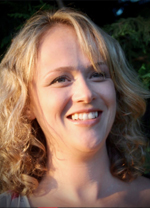 After obtaining her MA in professional writing studies at SDSU, Professor Amber Anaya
has held numerous successful positions in the corporate world, including health and
wellness writing, content writing for websites and businesses, designing training
and promotional materials, and writing for small businesses. Professor Anaya knew
she wanted to be a writer since her childhood days of creating short stories, designing
garage sale posters, and writing game instructions and play scripts for her friends.
After obtaining her MA in professional writing studies at SDSU, Professor Amber Anaya
has held numerous successful positions in the corporate world, including health and
wellness writing, content writing for websites and businesses, designing training
and promotional materials, and writing for small businesses. Professor Anaya knew
she wanted to be a writer since her childhood days of creating short stories, designing
garage sale posters, and writing game instructions and play scripts for her friends.
Originally planning to share her love of writing by teaching at the high school level, Professor Anaya switched career paths to professional writing after a year of substitute teaching—but she eventually found her way back to the classroom. She began teaching at the college level part-time in 2010 because she missed the exchange of academic ideas between like-minded people. She joined the RWS Department at SDSU in 2015 and began teaching full time in 2016 as her “love for teaching began to outweigh [her] love of corporate work.”
To Professor Anaya, rhetoric is inherent in all aspects of life. “Understanding rhetoric,” she comments, “is less about interpreting words, and more about bringing a deeper level of analysis, reflection, and meaning to humankind.” Her research topics of interest are primarily focused on professional writing and include the rhetoric of universal design principles, UX/UI, content strategy, persuasion in daily business communications, and Gen Z communication and writing practices. She is also interested in large companies and issues of access and diversity, such as CEO activism, diversity rhetoric in large corporations, and disability and accessibility in professional communications.
Professor Anaya brings her professional experience into the classroom as she mainly teaches business and professional writing. She finds her students to be both the best and most challenging part of her work at SDSU; they constantly inspire her with their engagement and passion for their academics and professional careers, and they also challenge her to rethink her teaching strategies every semester. “Reaching students as individuals and adjusting my curriculum, changing my approach to lectures and activities, and connecting with students in a meaningful and helpful way will always be a challenge, but it is one that I thoroughly enjoy.”
Motivated by the needs of her students, Professor Anaya evolves her teaching style with each new group of students. She teaches courses on business writing and professional writing and has also taught introductory RWS 200 courses. In general, she adopts a flexible approach to teach various classes and student populations, and she intentionally incorporates active learning strategies. While Professor Anaya highlights and clarifies concepts from assigned readings and videos, she thinks it is “important to see these ideas working in real-time through activities and application.”
Students find Professor Anaya easy to understand and appreciate her knowledge of the
subjects she teaches. The practical application of assignments in her classes creates
a clear connection for students between the course and their lives outside of academia.
Students also find it easy to
approach Professor Anaya, as she is fair, open-minded, and cares about the success
of her students.
During her own days as a student, Professor Anaya used to be afraid that she was bothersome or taking up too much of her professors’ time. As a professor now, she reflects: “I wish I had known that most professors want to form good working relationships with their students . . . I think most professors cherish the interactions they have with their students and do not view them as bothersome at all.”
“Looking back,” she says, “I would tell my former student self not to take myself
so seriously.”
Current Student Profiles
Anthony Toledo, Class of 2020
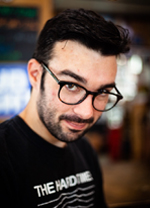 “Every course in the technical/professional track has been nothing but awesome,” states
Anthony Toledo, a second-year MA student in the professional writing track. Graduating
with a bachelor’s degree in English from the University of La Verne in 2016, Anthony
felt he had honed his written communication skills in the literature-heavy course
load but was still missing “strong practical, workplace-oriented skills.” He credits
his decision to pursue a master’s in RWS to his work as an academic writing specialist
at his university’s writing center. He also credits his mentors: “I am lucky enough
to have worked for some stellar people who pushed me to be a better writer and to
challenge myself.”
“Every course in the technical/professional track has been nothing but awesome,” states
Anthony Toledo, a second-year MA student in the professional writing track. Graduating
with a bachelor’s degree in English from the University of La Verne in 2016, Anthony
felt he had honed his written communication skills in the literature-heavy course
load but was still missing “strong practical, workplace-oriented skills.” He credits
his decision to pursue a master’s in RWS to his work as an academic writing specialist
at his university’s writing center. He also credits his mentors: “I am lucky enough
to have worked for some stellar people who pushed me to be a better writer and to
challenge myself.”
After searching both nationally and internationally for a program focusing on technical and professional writing with a scope that was neither too wide nor too narrow, Anthony found the perfect fit in the perfect city—“The professional/technical writing specialization and its required courses were the only excuses I needed to apply and move to one of my favorite cities to visit.”
During his first semester in the MA program at SDSU, the Writing Project Management class pushed him out of his comfort zone “in the best way possible.” He recalls: “My heart dropped when, on the first day of class, Dr. Bekins announced that we would be contacting organizations and pitching writing projects the following week. It still haunts me.” In addition to teaching specific types of writing, such as style guides and grant proposals, classes such as Content Editing and Writing for Nonprofits gave him practical skills, including professional practices, interacting with authors and organizations, and securing funding. Another class Anthony has enjoyed is Advanced Professional Writing, which gave him new methods for “tightening up” his writing while also “proving to be a great environment for [his] inner layout/documentation nerd.”
Currently, Anthony is continuing research that he began during his time working at ULV before starting the MA program. He is collaborating with one of his mentors at ULV on a paper about a “self-sustaining undergraduate research learning community.” The idea is that anyone can be taught graduate-level writing skills and that those who have been taught can share their knowledge with the next generation of students using the peer-to-peer curriculum Anthony and his professor have developed.
Anthony’s next step after graduating in May is to become a technical writer, although
he may eventually move from technical writing to user experience, given the similarities
he sees between the two. “Regardless of where I wind up,” he says, “I am quite confident
that I will be able to adapt to various writing-oriented professions, from editing
to grant writing.”
Alfredo Valles, Class of 2021
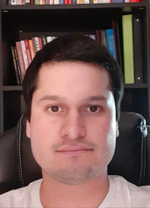 Alfredo Valles discovered the Rhetoric and Writing Studies Major while attending San
Diego City College, where he was completing his associate’s degree to transfer to
a bachelor’s degree in English. As he began to look at the courses he could take at
SDSU, he noticed that the RWS courses were more flexible and fitting for his interests.
He found it a “great alternative to English, as it offered the same amount of writing
with the benefit of reading more nonfiction texts.” Although he enjoyed the entertaining
texts he studied in English, Alfredo felt that it would be difficult to apply the
kind of writing he was doing outside of the major. He also liked that RWS courses
explored both cultural issues and more practical ones—such as professional writing,
editing, and an internship—that “would offer a better skillset for entering the workforce.”
Alfredo Valles discovered the Rhetoric and Writing Studies Major while attending San
Diego City College, where he was completing his associate’s degree to transfer to
a bachelor’s degree in English. As he began to look at the courses he could take at
SDSU, he noticed that the RWS courses were more flexible and fitting for his interests.
He found it a “great alternative to English, as it offered the same amount of writing
with the benefit of reading more nonfiction texts.” Although he enjoyed the entertaining
texts he studied in English, Alfredo felt that it would be difficult to apply the
kind of writing he was doing outside of the major. He also liked that RWS courses
explored both cultural issues and more practical ones—such as professional writing,
editing, and an internship—that “would offer a better skillset for entering the workforce.”
To Alfredo, the best part of the RWS Major is the freedom to choose the areas and artifacts he is interested in researching for his assignments. “I feel that this freedom has improved my independent thinking skills and analytical framework,” he says. The program has something for everyone as it focuses on career, theoretical, and practical writing skills. Alfredo particularly appreciates the field’s approach to popular culture, including “meme culture, social media, music, fiction, film, art, or even dance.” The Advanced Writing Strategies class allowed him to focus on such popular culture artifacts while also polishing his English skills.
Now, thanks to RWS, he says he views the world “through the lens of meaning” and with a healthy sense of skepticism. “No longer are the billboard ads just a company’s attempt to sell something; they are now filled with messages that suggest certain attitudes and perceptions about the world.”
Looking toward life after graduation, Alfredo is doing a lot of self-reflecting to
find a career fitted to his interests. He is considering pursuing a career in the
public sector but is still exploring his options. One thing he is certain of is his
enjoyment of helping people, so he is seeking a career that will incorporate his rhetoric
and professional writing skills to serve others.
Alumni Profiles
Dr. Lindsey Banister, Class of 2012
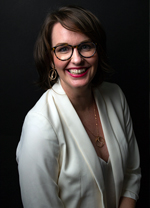 Eight years later, Dr. Lindsey Banister still remembers the sunny weather and authentic
Mexican food from her days studying for her MA at SDSU. And, of course, she also remembers
several lessons that got her to where she is today—an assistant professor and assistant
director to the writing center at Francis Marion University in South Carolina. Dr.
Banister recalls the advice she received from Dr. Minifee when she was applying to
Ph.D. programs: to assess the 3 P’s, people, place, and program. She found this advice
impactful both in choosing a program and choosing a career, and she now shares the
3 P’s with her own students as they choose their professional careers. She also remembers
learning John Swales’s C.A.R.S. Model in Dr. McClish’s class during her first semester.
The model helped her access academic texts throughout graduate school, giving her
the tools to both read the texts and, later in her professional career, to write academic
articles.
Eight years later, Dr. Lindsey Banister still remembers the sunny weather and authentic
Mexican food from her days studying for her MA at SDSU. And, of course, she also remembers
several lessons that got her to where she is today—an assistant professor and assistant
director to the writing center at Francis Marion University in South Carolina. Dr.
Banister recalls the advice she received from Dr. Minifee when she was applying to
Ph.D. programs: to assess the 3 P’s, people, place, and program. She found this advice
impactful both in choosing a program and choosing a career, and she now shares the
3 P’s with her own students as they choose their professional careers. She also remembers
learning John Swales’s C.A.R.S. Model in Dr. McClish’s class during her first semester.
The model helped her access academic texts throughout graduate school, giving her
the tools to both read the texts and, later in her professional career, to write academic
articles.
During the process of writing her thesis, one of the most productive experiences for Dr. Banister was a moment of failure. “The best thing that happened to me was when I took my first draft of my thesis to Dr. Bordelon, and she told me I needed to scrap most of the first half,” she reflects. “Naturally, I panicked. But, through that revision process, I learned that the writing process and developing nuanced ideas are not linear processes; they require breakdown and even failure.” The process gave Dr. Banister a renewed respect for the value of revision. It also prepared her for writing multiple drafts of chapters for her dissertation and for being a composition instructor comfortable with encouraging students through their writing breakdowns and supporting them through the revision process.
After the MA program, Dr. Banister attended Syracuse University and graduated in 2017 with a Ph.D. in Composition and Cultural Rhetoric, specializing in embodiment rhetorics, multimodal composition, and writing center studies. She refers to her MA as “an essential stepping stone, much like learning to walk before you can run.” Entering her Ph.D. program with the “educational trifecta” of pedagogical training (theory and praxis), an overview of the field’s history and theories, and writing and research skills, Dr. Banister felt prepared. As one of the few students in the program who already had pedagogical training experience, she felt less stress and anxiety than fellow classmates who had not yet had such exposure. She advises current students in the department: “Soak up any and all teaching experience the RWS program offers!” She furthermore advocates taking classes in the program’s various specializations as they paint a picture of the importance of rhetoric in daily life as well as on academic and professional levels.
She has continued to stay in contact with two of her mentors from her MA program, Dr. Bordelon and Dr. McClish. Commenting on these scholars’ ability to “contribute greatly to rhetoric and writing studies while maintaining effective teaching careers,” Dr. Banister comments, “To this day, I try to emulate them as teacher-scholars.” She appreciated all of the time they spent discussing her work as a student, as well as their “unique ability to take complex ideas and present them in interesting and discernable ways.”
Currently, Dr. Banister teaches various composition and rhetoric courses and trains writing tutors to mentor their peers. She is also writing two articles on rhetoric and embodiment. Her current research project is a collaborative effort with fellow Francis Marion University professors from the departments of Political Science and Geography, Dr. Dillon Tatum and Dr. Jennifer Titanski-Hooper. Their book aims to “explore the implications of the contemporary political moment (specifically the resurgence of white nationalism and white privilege) on university teaching practices as they relate to intersectional identities and social stratification as well as how instructors can effectively respond to this moment via their pedagogy.” Because FMU is a small, rural institution in the South with a large first-generation and minority student population, they believe it is particularly situated for such study.
Like everyone else, Dr. Banister uses rhetoric at home in her everyday communications,
but the work of a teacher rarely stays inside the classroom. “Even when I’m not at
work teaching about writing, I’m at home writing about writing.” As a lover of rhetoric,
though, days filled with writing are days well-spent.
Genevieve Knock, Class of 2018
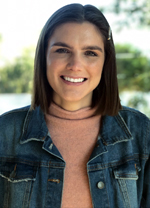 Genevieve Knock worked full time while completing the RWS MA program in the typical
two years, but between her busy workday and evenings doing coursework and papers at
home, the classroom was her “sanctuary.” “In those moments, in that room, I wasn’t
worried about the contract I had sent out earlier that day or the research paper I
was going to write when I got home. I was in a place in time in which I was only responsible
for engaging with my classmates, instructor, and course materials.” Genevieve valued
the opportunity to have discussions with peers and instructors who shared a love for
writing but also had enough diversity in experience and background to keep the conversations
“dynamic, interesting, and, most importantly, fun.”
Genevieve Knock worked full time while completing the RWS MA program in the typical
two years, but between her busy workday and evenings doing coursework and papers at
home, the classroom was her “sanctuary.” “In those moments, in that room, I wasn’t
worried about the contract I had sent out earlier that day or the research paper I
was going to write when I got home. I was in a place in time in which I was only responsible
for engaging with my classmates, instructor, and course materials.” Genevieve valued
the opportunity to have discussions with peers and instructors who shared a love for
writing but also had enough diversity in experience and background to keep the conversations
“dynamic, interesting, and, most importantly, fun.”
Genevieve took Dr. Sheppard’s Advanced Professional Writing class during the spring of her first year. She had been working her first office job after college and was struggling to figure out professional expectations on her own; she remembers feeling like “that meme of a golden retriever sitting at a computer that says, “I HAVE NO IDEA WHAT I’M DOING.” One of the assigned readings in the class examined the experience of a group of students entering the professional world after their studies, which made Genevieve realize she was not alone. “It seems to be a natural next step that as soon as you’re ready to don a blazer, you’ll make a clean transition to the corporate culture,” Genevieve comments. “The reality is much clumsier: every company is different, and there’s no syllabus to lean on.”
While she enjoyed all of her classes, she found it particularly helpful that her professional writing classes emphasized the importance of being proactive—of doing something and asking for feedback versus just asking if you should do it. Genevieve graduated in 2018, opting to take Dr. Werry’s capstone exam, which involved a course tailored to the students’ writing interests. “No hate to Aristotle,” she says, “but I was stoked that his reappearance wasn’t mandated.”
Because she knew that she wanted to pursue technical communication, Genevieve used the required internship for the professional writing track as an opportunity to gain experience as a technical editor. The skills she had gained from Dr. Merriam’s editing course, as well as the soft skills and question-asking abilities that she had learned from Dr. Bekins, helped her secure the internship at her current company. She notes that the president of the company was impressed “simply because [she] asked a lot of questions.”
Her advice to current MA students is to take advantage of those soft skills—“fake it until you make it!” She has come across many communicators who “aren’t actually technically gifted but are socially charming and helpful and, as such, their work is considered persuasive and effective.”
Currently, Genevieve is a technical editor for ATA Engineering, a mechanical and aerospace engineering company. “I write a compelling email here and there in addition to using my editing and writing skills in preparing proposals and reports for our customers,” she says. She also applies her writing skills in contract negotiations. Outside of work, she reflects every day in a notebook (which she chooses not to label as journaling) and works on personal essays and a screenplay for a “creative, self-reflective outlet.”
It is fascinating for Genevieve to see how her own writing has evolved over time and
how she mediates her writing between personal and professional spheres. “It can be
taxing to be an editor because it’s not something I can just turn off,” she admits.
“I’ve made it a point in my personal communications to be very colloquial because
of this, and it’s very freeing. I’m a huge advocate for acronyms and slang and minimal
punctuation in any other medium, aside from email.” However, people who write to her
tell her they are diligent when writing to her, since she’s an editor. “To that,”
Genevieve comments, “I say, lol!”
Meet the Editor/Contributor
Clara Cushing
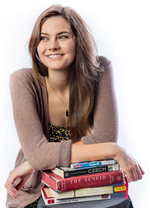 Clara Cushing is a second-year graduate student in the MA program in Rhetoric and
Writing Studies. After graduating from Santa Clara University in 2016 with a BA in
Classical Studies and English, she taught high schoolers in the Czech Republic as
a Fulbright English Teaching Assistant for a year. She then worked in Washington,
D.C. as a communications intern at Phi Beta Kappa and as an editorial assistant for
their magazine, The American Scholar, before deciding to continue studying writing in the MA program at SDSU.
Clara Cushing is a second-year graduate student in the MA program in Rhetoric and
Writing Studies. After graduating from Santa Clara University in 2016 with a BA in
Classical Studies and English, she taught high schoolers in the Czech Republic as
a Fulbright English Teaching Assistant for a year. She then worked in Washington,
D.C. as a communications intern at Phi Beta Kappa and as an editorial assistant for
their magazine, The American Scholar, before deciding to continue studying writing in the MA program at SDSU.
Clara is currently finishing her specialization in professional writing and working on her thesis, titled “Old as Time: Circulation of Gender Conceptions in Beauty and the Beast Tales.” She is enjoying her work at the SDSU Writing Center and writing grants for a local museum. After graduating in the spring, she is excited to build a career around putting her passion for writing into service for others.
Chair's Message
 Another academic year has come to a close. A highlight of the year is always our
intimate department graduation ceremony. In our celebration, the name of each graduate
is called, and one of our RWS professors says a few words about that student. Graduates
also have the opportunity to share a few words with our department and guests, if
they so choose. It’s deeply touching to hear the remarks of our graduates, who freely
acknowledge how much their RWS education and the efforts of faculty members have meant
to them. These acknowledgements mean so much to our faculty, as does the opportunity
to celebrate the special occasion with our graduates and their families. Congratulations
to the class of 2019!
Another academic year has come to a close. A highlight of the year is always our
intimate department graduation ceremony. In our celebration, the name of each graduate
is called, and one of our RWS professors says a few words about that student. Graduates
also have the opportunity to share a few words with our department and guests, if
they so choose. It’s deeply touching to hear the remarks of our graduates, who freely
acknowledge how much their RWS education and the efforts of faculty members have meant
to them. These acknowledgements mean so much to our faculty, as does the opportunity
to celebrate the special occasion with our graduates and their families. Congratulations
to the class of 2019!
In addition to showcasing our recent graduates, our newsletter provides information on our departmental events, faculty and staff, faculty projects, students, and alumni so that you can stay connected with the workings of our department. This issue includes pictures of our Landmark Lecture, an annual event that brings together faculty, staff, students, alumni, and guests for an afternoon of discussion and investigation into different aspects of pedagogy and rhetorical study. Previous years have brought in scholars of visual rhetoric, demagoguery and deliberation, queer theory, the history and development of writing programs, and many more. This year, RWS faculty were excited to host Professor Kristin Arola, Associate Professor in the Writing Rhetoric and American Cultures Department at Michigan State University. Professor Arola gave an engaging presentation on multimodal composing and ways that faculty can integrate such projects into their writing classrooms.
The issue highlights a few of our talented faculty and staff, including Dr. Jenny Sheppard and the intrepid Karen Keene, one of our multitalented staff members. Dr. Sheppard received the 2018–2019 College of Arts and Letters Excellence in Teaching Award in the Humanities and Social Sciences (for tenure or tenure-track faculty). We cannot think of anyone more deserving of this prestigious award! Karen is a familiar face in our department, but, as the newsletter story highlights, few may be aware of all that she does to support our enormous and complicated department. Karen also has fascinating interests and talents outside of work—picture more than 700 Santas!
Dr. Chris Werry has developed critical digital literacy resources for our lower-division writing students. More specifically, he helped to develop the digital textbook, Reading, Writing and Evaluating Argument, which was written for RWS 100 but “is designed to be shared and remixed.” The new digital text will be launched this fall, and Dr. Werry hopes to use the funds generated from the text to benefit the Lower-Division Writing Program, as well as those teaching in the program.
The newsletter features two of our students, recent RWS MA graduate Jim Dierker, Class of 2019, and RWS BA Val Burke, Class of 2018. We also highlight our alumni, Andreea Harambas-Jamotillo, Class of 2010, and Jessica Baris, Class of 2009. We are so proud of our students and alumni!
Finally, I would like to extend a special thank you to Clara Cushing, who did a fabulous job editing and writing stories for our newsletter.
Please read on for more details on all of the above!
Landmark Lecture
Kristin Arola, Associate Professor in the Writing Rhetoric and American Cultures Department
at Michigan State University, gave her presentation “Multimodal Composing: Writing/Designing
Futures” in January at Scripps College. After providing a general overview of multimodal
pedagogy, she discussed the value of using the lens of a slow composition rooted in
an American Indian epistemology to integrate multimodal projects in writing courses.
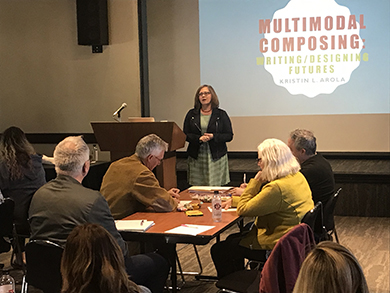
Kristin Arola speaks on multimodality in the classroom.
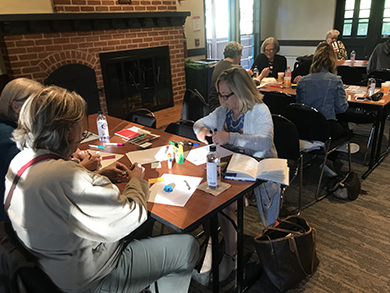
Participants try creating multimodal projects and discuss assessment practices.
Faculty and Staff Profiles
Dr. Jenny Sheppard
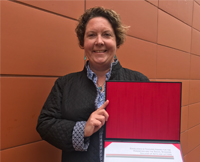 Dr. Jenny Sheppard was planning to be an elementary school teacher before accidentally
happening upon the field of rhetoric. While waiting for her credential program to
begin, Dr. Sheppard took a graduate class in literacy that she says “changed everything.”
“The class was so much more challenging and engaging than my other coursework and
helped me to see that what we traditionally think of as literacy was, in fact, much
more complex,” Dr. Sheppard reflects. She joined SDSU’s RWS department as a lecturer
in 2014 and recently received the 2018–2019 College of Arts and Letters Excellence
in Teaching Award in the Humanities and Social Sciences (for tenure or tenure-track
faculty). Starting in fall 2019, she became a tenure-track faculty member.
Dr. Jenny Sheppard was planning to be an elementary school teacher before accidentally
happening upon the field of rhetoric. While waiting for her credential program to
begin, Dr. Sheppard took a graduate class in literacy that she says “changed everything.”
“The class was so much more challenging and engaging than my other coursework and
helped me to see that what we traditionally think of as literacy was, in fact, much
more complex,” Dr. Sheppard reflects. She joined SDSU’s RWS department as a lecturer
in 2014 and recently received the 2018–2019 College of Arts and Letters Excellence
in Teaching Award in the Humanities and Social Sciences (for tenure or tenure-track
faculty). Starting in fall 2019, she became a tenure-track faculty member.
Of the 12 different classes Dr. Sheppard has taught in RWS so far—ranging from first-year writing courses to a graduate course in digital rhetoric and literacy—one of her favorites has been RWS 414, Rhetoric in Visual Culture. In the class, she has students examine visual texts such as monuments, photographs, advertising, and visual identity. “Most students come into the course with a lot of experience reading words from a rhetorical perspective,” Dr. Sheppard comments, “but they haven’t usually had the opportunity and tools to think about how the visual also works to inform and persuade, so it’s exciting to see those skills develop.”
Students describe Dr. Sheppard’s teaching style as flexible, as she encourages students to write on their own interests, and as accessible and invested in their success and growth. Dr. Sheppard explains her approach to teaching as “engaged but laidback.” While she is interested in sharing a lot of material with her students and expects them to work hard in the class, she purposefully “shape[s]…classes around activities that give students the chance to test out ideas and to apply course concepts to topics of interest to them.” She wishes that she had known as an undergraduate that it’s okay to “ask faculty about pushing the boundaries of class projects” in order to better fit personal interests. One of her professors at Chico State, Tom Fox, was influential to her current pedagogical philosophy; he helped her understand that it is important not to take a single approach to cultivate student learning but to constantly look for multiple ways to ensure students’ success. The New London Group is another influence that Dr. Sheppard cites—these literary scholars support a pedagogical framework that combines direct instruction, hands-on practice, and reflection.
For Dr. Sheppard, one of the best parts of working at SDSU is the diversity of the students she gets to work with. As the department’s classes are relatively small and the field of rhetoric permits students to pursue topics of their own choice, she enjoys getting to know her students, their backgrounds, and their interests—and she values learning from them throughout the class as well. The biggest challenge is finding time to give detailed feedback on student work, which is an integral aspect of her teaching style.
Research topics that are of special interest to Dr. Sheppard include the study of digital and multimodal rhetorics and their integration in the classroom. Currently, she is working on one project about infographics as a multimodal genre that can be useful in teaching digital composition; the genre incorporates literacies and rhetorical practices relevant to communication in the 21st century, which makes it an ideal learning tool for students. Another study she is engaged in is an examination of “tactical communication practices in online social media medical support groups that help users assert more agency in navigating their treatment.”
Karen Keene
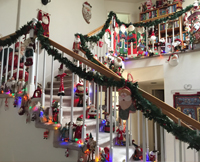 RWS students and faculty may not be fully aware of all the work that Karen Keene does
to support both faculty and students and to make improvements—and that is because
she is so good at what she does. Karen likes the challenge of keeping a big department
with many different people and personalities running smoothly. “I look at the whole
department as a sort of challenge: what can I do to make it better?” Karen says. She
ensures employees are provided with what they need to do their jobs and ensures that
“the working environment is positive and welcoming.”
RWS students and faculty may not be fully aware of all the work that Karen Keene does
to support both faculty and students and to make improvements—and that is because
she is so good at what she does. Karen likes the challenge of keeping a big department
with many different people and personalities running smoothly. “I look at the whole
department as a sort of challenge: what can I do to make it better?” Karen says. She
ensures employees are provided with what they need to do their jobs and ensures that
“the working environment is positive and welcoming.”
Karen is most proud of the improvements she has made in the department through her creativity and innovativeness. “Always on the lookout for something new or better,” she often finds opportunities to apply for funding and sends in applications. Some of the results of such applications are new computers, renovated offices, furniture for TAs and Fellows, technology for online instruction, and the new smart room in SH-128. She has also improved the timeliness of employee pay. She notes, “I strive to ensure that happens and am relentless in tracking down any problems.” A pet peeve of Karen’s is finding out about a problem secondhand, since she can’t fix the problem if she doesn’t know about it.
Karen’s background working for a bottled water company for 30 years gave her the skills necessary for running a department in a university. During her time with the company, it grew from having a few local branches to establishing almost 100 locations nationwide. “From customer service to corporate acquisitions, while advancing from handwritten envelope billing to handheld computers and bar code scanning, I provided support and training whenever and wherever needed,” Karen says of the challenging time. She supervised a hundred people in offices all over the U.S., which helps her make quick, logical decisions for the RWS Department.
The benefits of working at a CSU brought Karen to start working at San Diego State, since her son was planning to attend Cal Poly; the tuition waiver applies to all CSU campuses. Karen worked in the Philosophy Department for about one year before Dr. Glen McClish hired her to transfer to RWS, and she has been an integral part of the department for the past eleven years.
During her time off work, Karen loves crafting and reading. She has unique spatial
skills that allow her to read upside down as quickly as she can read normally. Her
family likes to watch her “solve” newspaper jumble puzzles by reading the words as
if the letters are not scrambled, as they “oddly find this entertaining.” Karen also
collects Santas and has over 700 of them in various shapes and sizes. From Thanksgiving
to Christmas, they are on display inside and outside of her house— “on stairs and
windowsills, mantle and bookcases, above valances, between railing spindles in the
hallway, on the refrigerator, and on a nine-foot tree.”
Faculty Project
Dr. Chris Werry’s Open Educational Resources
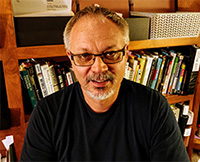 Most of the reading and writing that students do today takes place in digital environments,
yet current textbooks and institutional tools are behind in helping writing instructors
teach critical digital literacy. “Little has been published on how we should build
the infrastructure needed to support and reimagine General Education (G.E) writing
programs as they move into the digital age,” Dr. Chris Werry points out. After noticing
this gap in educational resources at the university level, Dr. Werry began working
on a solution to support writing instruction: “an ‘ecosystem’ of teaching, publishing,
and writing resources.”
Most of the reading and writing that students do today takes place in digital environments,
yet current textbooks and institutional tools are behind in helping writing instructors
teach critical digital literacy. “Little has been published on how we should build
the infrastructure needed to support and reimagine General Education (G.E) writing
programs as they move into the digital age,” Dr. Chris Werry points out. After noticing
this gap in educational resources at the university level, Dr. Werry began working
on a solution to support writing instruction: “an ‘ecosystem’ of teaching, publishing,
and writing resources.”
The project aims to develop open educational resources for students and teachers and includes a collection of tools and materials for teaching critical digital literacy as well as textbooks and modules that can be shared within the CSU. Dr. Werry summarizes the main goals for creating this “ecosystem” of resources:
- revise first-year writing curricula for the digital age
- lower the cost of instruction for students taking G.E. classes
- develop open, modular, faculty-produced texts and teaching resources that can be shared locally (and potentially within the CSU system)
- collect data and conduct research on these initiatives
The open source textbooks, which will replace publishers’ textbooks, will be “’modular’ and flexible,” allowing teachers to add their own contributions. Students will pay a small amount for these textbooks, which will fund the cost of the writing program, professional development opportunities, teacher additions to the textbook, and a journal of student writing that will highlight undergraduate writing and instructors’ work.
This project is critical for writing programs, which are, as Dr. Werry puts it, “large, sprawling enterprises that do invaluable work but are usually severely underfunded.” Writing teachers at universities often have to deal with difficult labor expectations and have few opportunities for coordinating and sharing. Dr. Werry adds, “the technologies we are provided, such as Blackboard, are akin to a digital Esperanto—a language that barely exists in the outside world, equipping students with few transferable skills for their lives as digital citizens.”
Dr. Werry began collecting data for this project in fall 2014 and 2016. He observed the digital literacy practices of SDSU students, including “search literacy, site/author evaluation, fake news, rhetorical analysis of web pages, social bookmarking, tagging, annotation, and the curation of online materials for writing and research projects.” He then created a set of wikis, complete with assignments, texts, spaces for students to do group work and blogs, writing resources, and more to encourage new writing teachers to begin teaching critical digital literacy. So far, he has developed teacher training materials for these resources and has composed the digital textbook, Reading, Writing and Evaluating Argument, which was written for RWS 100 but “is designed to be shared and remixed.” The book received positive feedback when piloted in fall 2018, and Dr. Werry is now revising it before it is launched for a larger audience in fall 2019. He has also created the journal for undergraduate student writing using the Commons in a Box (CBox) platform, which will enable students to manage the journal. In addition to giving students a platform to showcase their work, the journal will provide opportunities for student work to be chosen to be included in the open ed textbook.
Currently, Dr. Werry is expanding online teaching resources for the textbook. His
next steps are to hold training workshops, promote the textbook, and make an assessment
plan for the textbook and resources. As the project moves from developmental stages
to implementation, he will use the data collected from the project to publish his
findings in journals like Computers and Composition. Future work on the project will explore collaboration with writing programs throughout
CSU, since it is “designed to be packable, scalable, re-usable, and sharable.” In
these initial stages, Dr. Werry hopes to see faculty at SDSU use the project to “add
value to our community,” and he welcomes interest in his project from students and
teachers to help him advance this work or consider alternative directions.
Current Student Profiles
Jim Dierker, Class of 2019
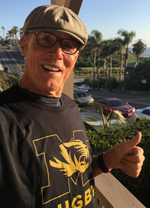 After retiring from forty years in sales and marketing, Jim Dierker “scrolled into”
the RWS Department at SDSU while looking for programs to help him transition from
the corporate world to a role in teaching. It felt like a natural fit for him, since
rhetoric plays a big role in marketing and “persuasion is key to influencing the consumer
to buy your product or idea.” Along with his experience in sales and marketing, Jim’s
undergraduate degree from the University of Missouri in Journalism with a concentration
in broadcasting helped prepare him for the program. He compares the rhetorical situation
to the “journalistic search for the who, what, where, why and how of a story,” and
the vigorous process of research is another thing that both fields share.
After retiring from forty years in sales and marketing, Jim Dierker “scrolled into”
the RWS Department at SDSU while looking for programs to help him transition from
the corporate world to a role in teaching. It felt like a natural fit for him, since
rhetoric plays a big role in marketing and “persuasion is key to influencing the consumer
to buy your product or idea.” Along with his experience in sales and marketing, Jim’s
undergraduate degree from the University of Missouri in Journalism with a concentration
in broadcasting helped prepare him for the program. He compares the rhetorical situation
to the “journalistic search for the who, what, where, why and how of a story,” and
the vigorous process of research is another thing that both fields share.
Inspired by classes with Dr. Minifee and reading recommendations from Dr. McClish, Jim decided to commit to the MA program. Each RWS course that he has taken has inspired him in different ways. “RWS 601 turned me on to the ancients, whom I really bonded with, especially Plato, Cicero and Augustine,” Jim says. He has also enjoyed his “TA adventure” working with Professor Werry to teach RWS 100 students.
Teaching is what motivated Jim to go back to school after retiring. During his time in the corporate world, he noticed that a large portion of the population lacks the ability to write and speak publicly in an effective manner. Structuring informative and persuasive emails is challenging for many employees in the business world, and Jim points out that “the growth and diversification of social media demand immediate improvement in the basics of writing” in our rapidly changing multi-cultural society. He hopes to become a part-time lecturer at San Diego State or an embedded tutor at a community college, so he can pay his knowledge of rhetoric forward to help the next generation gain competence in rhetorical communication.
In the meantime, Jim is enjoying the final stages of writing his thesis on a photograph of Nelson Mandela presenting the Rugby World Cup to South Africa’s rugby team captain, Francois Pienaar. Jim is making the argument that “the photograph is a powerful, historic, and authentic icon capturing the political and spiritual transformation (metonoia) of the South African nation – the drama, political performance/theatre, as defined by Burke’s Dramatism Pentad.” The topic is one that Jim is particularly passionate about, as he went on a tour of South Africa as an international rugby player and is currently a high school rugby coach—and a huge fan of Mandela’s eloquence and courage. Jim says his advisor, Professor Ornatowski, sometimes has to remind him to control his enthusiasm and stay focused on the application of rhetorical theory to his premise.
While writing his thesis has been the most difficult requirement of graduate school
in terms of time management, critical research, and endless writing and rewriting,
Jim finds the process of constantly uncovering new information on a topic to be an
“amazing journey”—“like traveling in space and discovering a new heavenly body or
star with each library search.” After he spends the summer taking RWS 799b to perfect
his thesis, Jim’s daughter will take him to the World Cup of Rugby in Japan to celebrate
his master’s accomplishment.
Val Burke, Class of 2018
 Val earned her Associate’s degree in English at Grossmont College before coming to
SDSU. She thought she would continue with English for her Bachelor’s degree, but a
co-worker who was employed at SDSU talked to her about her career goals and asked
if she had considered Rhetoric and Writing Studies. After doing a good amount of research,
Val committed to the RWS undergraduate major. Looking back on the decision, she says,
“I love English, but what made me fall in love with rhetoric is how much more analytical
it is.”
Val earned her Associate’s degree in English at Grossmont College before coming to
SDSU. She thought she would continue with English for her Bachelor’s degree, but a
co-worker who was employed at SDSU talked to her about her career goals and asked
if she had considered Rhetoric and Writing Studies. After doing a good amount of research,
Val committed to the RWS undergraduate major. Looking back on the decision, she says,
“I love English, but what made me fall in love with rhetoric is how much more analytical
it is.”
Although she claims it is too difficult to pick a favorite class from her time in the program, Val does identify as especially impactful both RWS 543, Rhetoric of Visual Composing, and RWS 507, Professional Writing for Nonprofit Organizations. The visual composition class offered a chance to consider the visual side of rhetoric that is not often a focus in other classes. For Val, the class opened her eyes to things she had never considered before, such as what colors work better together or what combination of fonts are best. In the class for nonprofit organizations, she enjoyed creating an entire boilerplate grant proposal for a nonprofit of her choice.
The most useful skills Val has gained from the RWS program are how to communicate and effectively express ideas, in addition to how to identify various strategies used in any type of written or visual media or communication. The most exciting part of the program, she explains, is that there is a variety of classes in which you can choose what you would like to analyze, and “there is never a ‘right’ answer as long as you argue effectively.”
Val just graduated from the RWS BA program this December, and she has recently been
hired as Associate Content Specialist-Editor at Neil Patel Digital. Her ultimate goal
is to be a writer or grant writer for an animal nonprofit organization: “I want to
help save lives by being a voice for those who do not have one.”
Alumni Profiles
Andreea Harambas-Jamotillo, Class of 2010
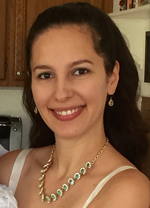 Andreea never imagined she would one day write about parking software and equipment—yet
this is the latest of the self-proclaimed “random” jobs that her career in technical
writing has led to. The endless possibilities in this field are something that she
values highly; she previously worked for a company that filed insurance claims on
foreclosed properties, and she has written a variety of documents throughout her professional
career ranging from policies and Request for Proposals (RFPs) to training manuals
and job descriptions.
Andreea never imagined she would one day write about parking software and equipment—yet
this is the latest of the self-proclaimed “random” jobs that her career in technical
writing has led to. The endless possibilities in this field are something that she
values highly; she previously worked for a company that filed insurance claims on
foreclosed properties, and she has written a variety of documents throughout her professional
career ranging from policies and Request for Proposals (RFPs) to training manuals
and job descriptions.
While working on her MA at SDSU, Andreea “soaked up everything [she] learned” as she
also worked full-time and juggled being married and paying a mortgage. She wishes
she could be a student for life and enjoyed learning about theory just as much as
taking technical classes. “My favorite courses were the rhetorical classes that really
made me feel like my brain was getting a workout,” she recalls. Her advice for current
MA students: take advantage of class discussions. “Once you get a regular job, nobody’s
going to talk to you about Socrates and Plato.”
Getting an MA in rhetoric allowed Andreea to apply to jobs that wouldn’t have been
otherwise accessible and gave her tools that helped her in technical writing and in
taking on various different roles within the workplace. It also helped her more creative
side, as she used her technical writing and editing skills to “remove fluff” and made
her stories more convincing through her knowledge of rhetorical theories and modes
of persuasion. To balance the technical writing she does for her career, she incorporates
creative writing into her life as a romance writer. She has published eight novels
under two pseudonyms—Mila Rossi, for her contemporary romances, and Alice Lake, for
Victorian era historical romances—and has four more novels on the way.
Beyond the professional skills she gained during her studies at SDSU, the most useful
thing she took away from the program was how to construct an argument—for a proposal,
a story, or arguing with her husband. “I draw on ethos, pathos, and logos,” Andreea states. “My husband says it’s impossible to win an argument with me.”
Jessica Baris, Class of 2009
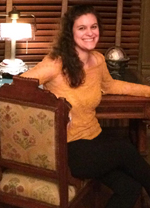 As an in-house copywriter for a high-tech company, Jessica Baris is responsible for
telling the story of the company’s technology to attract new customers. When she was
searching for master’s programs that would help her attain her goal of working as
a writer in the corporate setting, the RWS MA program stood out from MFA writing degrees
that focused on fiction and poetry: “a program that focused on the art of persuasion,
on oratory, how to build an argument, how to edit, how to professionally present information
that is helpful to a reader . . . now that was what I was looking for!”
As an in-house copywriter for a high-tech company, Jessica Baris is responsible for
telling the story of the company’s technology to attract new customers. When she was
searching for master’s programs that would help her attain her goal of working as
a writer in the corporate setting, the RWS MA program stood out from MFA writing degrees
that focused on fiction and poetry: “a program that focused on the art of persuasion,
on oratory, how to build an argument, how to edit, how to professionally present information
that is helpful to a reader . . . now that was what I was looking for!”
Jessica pursued the technical and professional writing track and notes that the classes specific to this track were invaluable, as they “provided skills that have stuck with [her] over the years.” She enjoyed being exposed to classic works such as On the Ideal Orator, On Rhetoric, and the Phaedrus, and she particularly appreciated the real-world application focus of professional writing courses such as Professor Merriam’s technical editing course. One of her favorite courses, the editing class taught her how to build a style guide and edit a variety of document types using correct copyediting marks—both of which have been useful in her career. She also found that her experiences from the part time work she did during the program were particularly helpful when it came time to graduate, and she urges current students to seek out such experiences during their studies as well.
Jessica uses the skills she gained in the MA program to tell her company’s story through various types of writing, including product descriptions, web content, sales brochures, articles, customer stories, white papers, blogs, and advertisement copy. The most interesting writing project she has worked on was a case study on her company’s product “that provides backup power to a subsystem in a wind turbine.” Jessica traveled to Iowa to meet with a customer’s wind farm manager and wind technicians, who climb the turbines to provide maintenance. She learned about the daily challenges on a wind farm and how the product was assisting with maintenance, and she reported their story in a case study with photographs of the turbines and the people whom the company was helping. “There is no story more compelling than the story told in the customer’s own words,” she says.
In addition to writing for content marketing, Jessica also performs at community events
for adults around San Diego as a storyteller of old folktales from around the world—Greece,
Russia, China, Ireland, America. Rather than writing out these stories before performing
them, Jessica outlines them and builds transitions. Her MA studies of Cicero’s On the Ideal Orator have been influential in her composition of these performances. Jessica is also shifting
gears and writing a personal essay in 2019 to tell her own stories. A final way she
keeps her writing alive outside of work is through letters and postcards to friends
and family, taking it upon herself “to help keep the U.S. postal system in service.”
Picture-Perfect Graduates
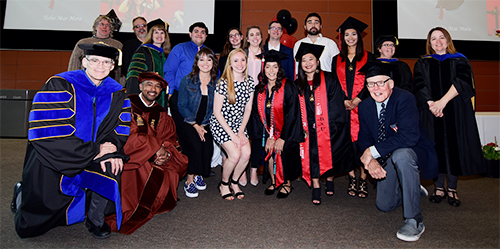
Our RWS MA and BA students, as well as our RWS faculty, celebrate the graduation of
the Class of 2019.
Meet the Editor/Contributor
 Clara Cushing
Clara Cushing
Clara is a first-year graduate student in the MA program in Rhetoric and Writing Studies. After graduating from Santa Clara University in 2016 with a BA in Classical Studies and English, she taught high schoolers in the Czech Republic as a Fulbright English Teaching Assistant for a year. She then worked in Washington, D.C. as a communications intern at Phi Beta Kappa and as an editorial assistant for their magazine, The American Scholar, before deciding to continue studying writing in the MA program at SDSU.
During her first year in the program, Clara has enjoyed gaining a foundation in rhetoric as well as exploring professional writing classes focused on editing and nonprofit grant writing. Over the summer, she plans to get started on her thesis, which will focus on circulation studies and intercultural rhetoric.

